Planning a 9-day Ireland itinerary can be a pain in the backside… So, we’ve done all of the hard work for you!
We’ve spent 25+ years travelling around Ireland and the itinerary below leans on that experience and the many mistakes we made along the way!
In a nutshell, this 9-day itinerary:
- Starts and ends in Rosslare
- Has been meticulously planned
- Has an hour-by-hour itinerary for each day to save you time/hassle
- Follows logical routes that take you to hidden gems, tourist favourites and great pubs and restaurants
Who this itinerary will suit

Now, before you scroll down, take 10 seconds to look at the graphic above – each of our road trip itineraries have been tailored to specific needs.
This road trip is specifically for those of you:
- Starting in/near Rosslare
- Using public transport and organised tours
- Looking to explore at a slow pace
- With a good level of fitness (i.e. it includes long walks and hikes)
- Remember, we have hundreds of different itineraries here if this one doesn’t suit you
An overview of this itinerary
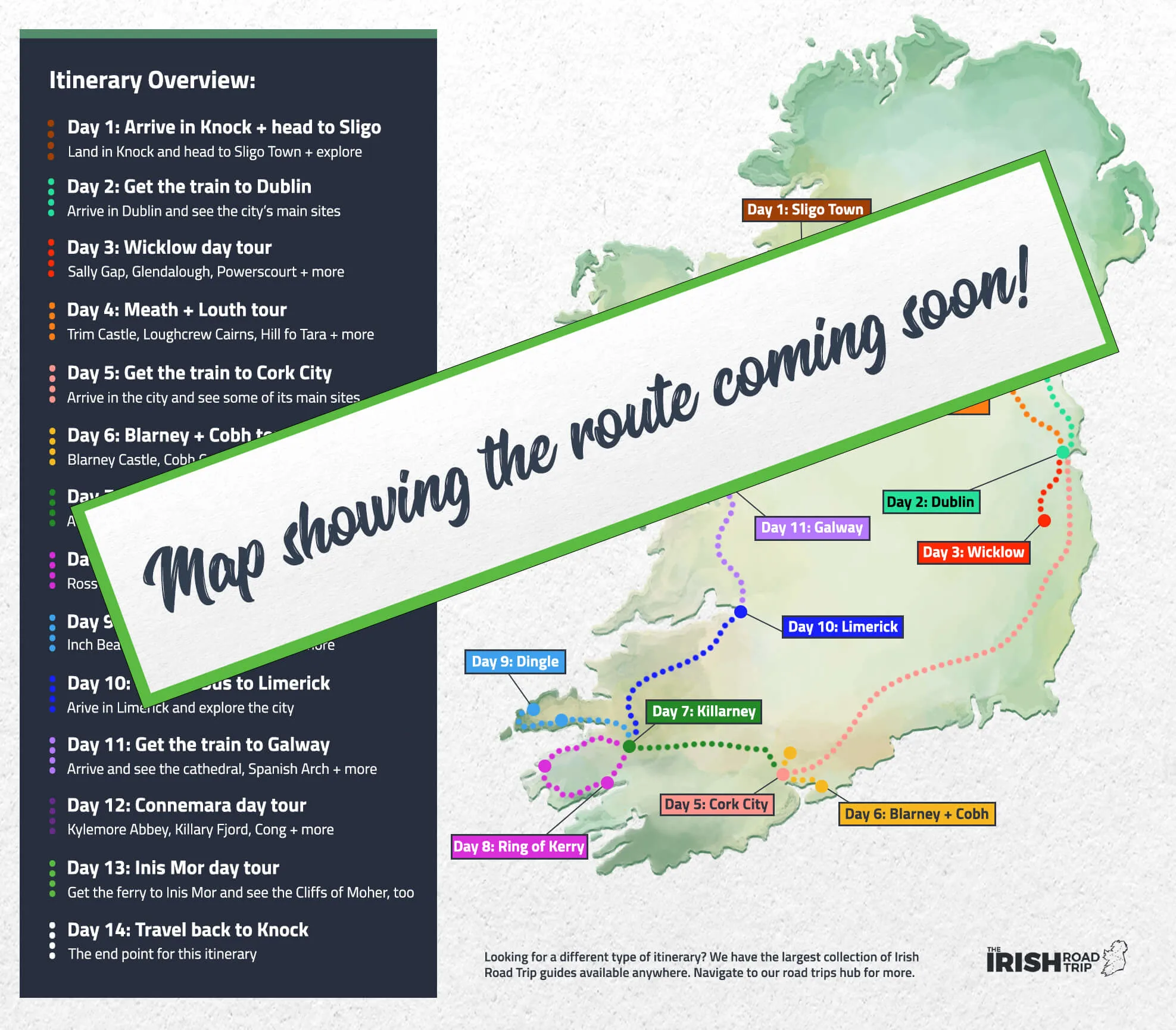
The map above gives you a very high-level overview of where this route will take you.
It uses several bases (e.g. Cork for 3 nights) and provides you with day-long road trips you can head off on, so you avoid having to change accommodation constantly.
Now, I’ll stop rambling on – here’s a day-by-day insight into each of the days below!
Day 1: Arrive in Rosslare and head to Dublin
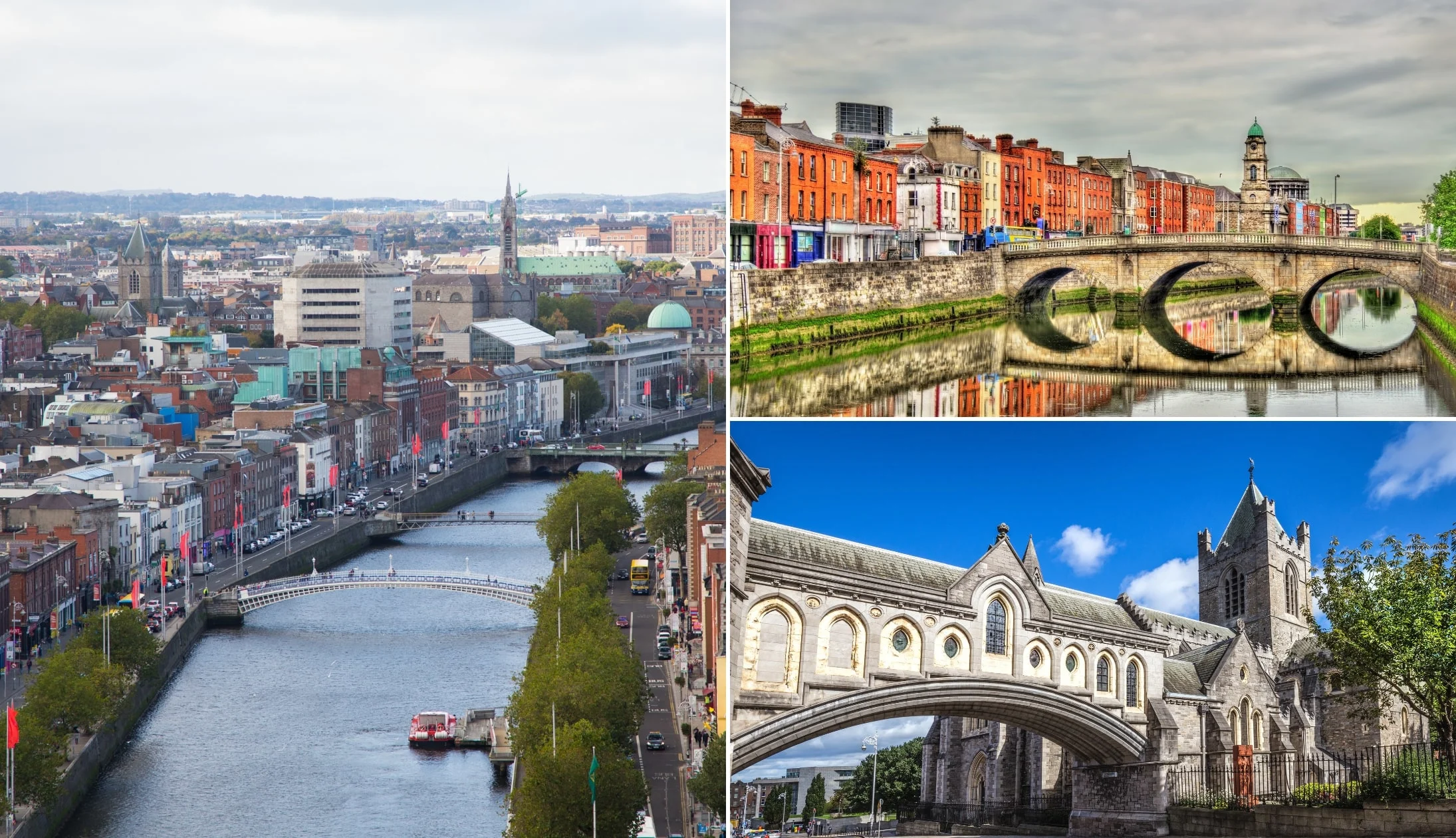
Photos via Shutterstock
It’s day one and welcome to Ireland! Today, you’ve arrived into Rosslare via the ferry and will be making your way to Dublin, where you will be spending one night!
We’re going to assume you’ve arrived in the country just a little before lunch, so we’ve planned an afternoon’s worth of activities for you.
Recommended accommodation in Dublin
- Budget: Abigail’s Hostel (Temple Bar), Jacobs Inn (central hostel) and the Generator Hostel (short walk from the city)
- Mid-range: Dublin Skylon Hotel (just outside the city), Wren Urban Nest (Temple Bar) and the Harding Hotel (very central)
- Luxury: The Merrion (St. Stephen’s Green – very central) and The Westin (just off Grafton Street)
Getting around Dublin + money savers
-
- Time savers: If you want to avoid walking where possible, it’s worth getting a ticket for the Hop On Hop Off Bus around Dublin. It goes to or near all of the main sites on this itinerary plus plenty more.
- Money saver: If you’re visiting the ‘main’ Dublin attractions, the Dublin Pass can save you €€€ (here’s how)
Stop 1: Rosslare Europort Train Station
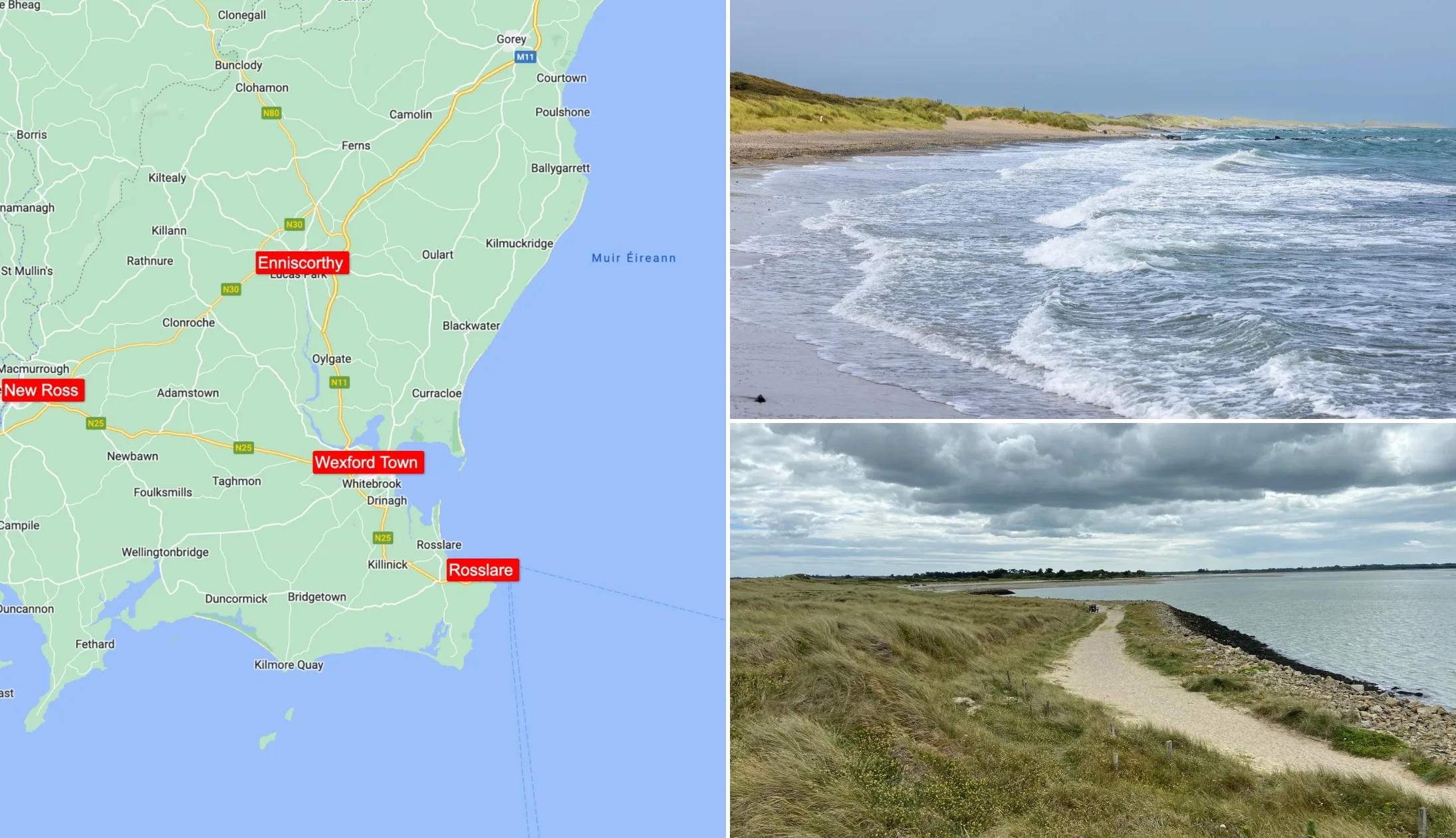
Photo left: Google Maps. Others: Shutterstock
The train station is just a five-minute walk from the harbour. There are four trains a day leaving this station.
Stop 2: Dublin Connolly
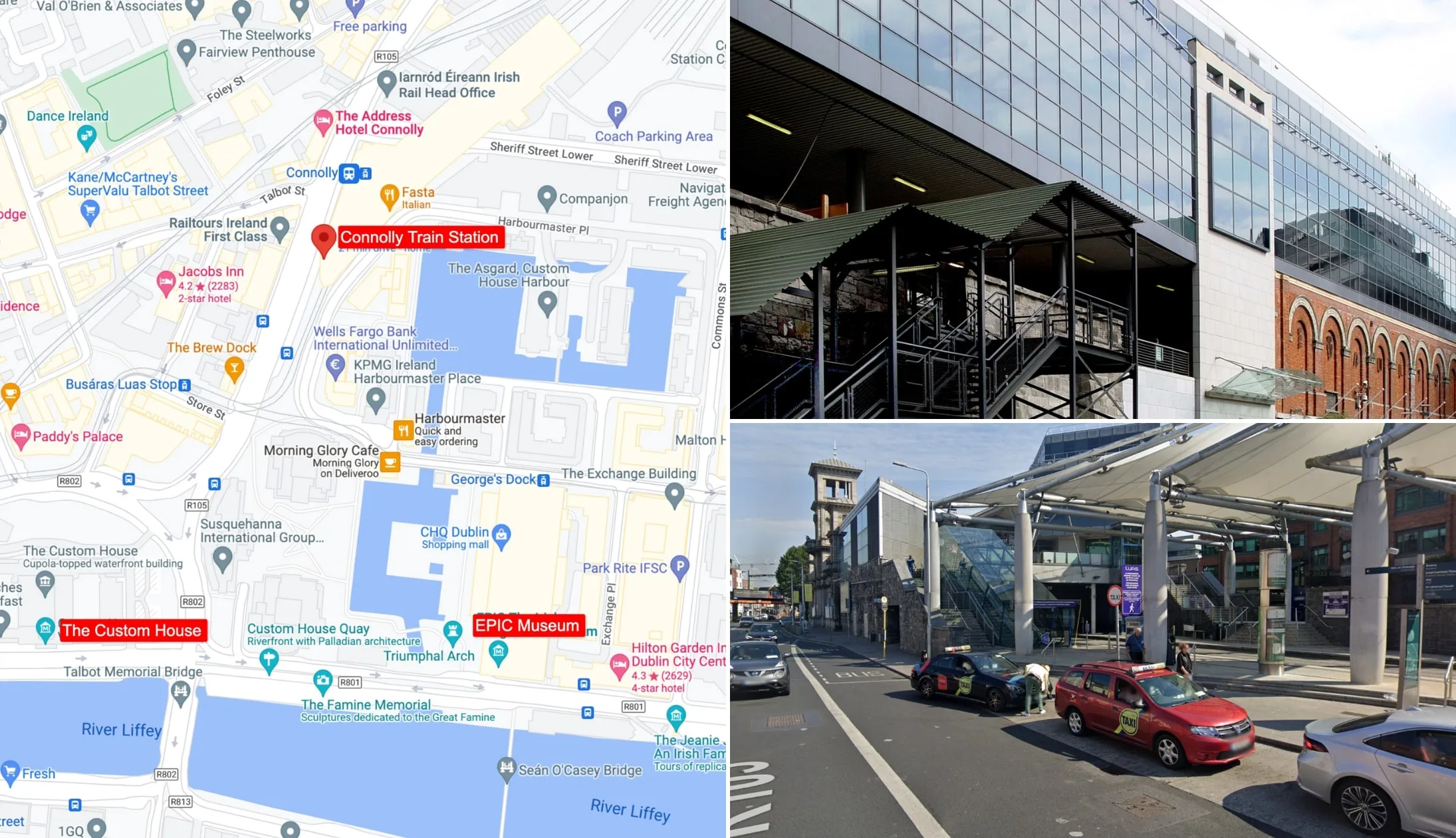
Photo left and bottom right: Google Maps. Other: Shutterstock
The journey takes around 2.5 hours, and you’ll find yourself getting off in the heart of Dublin, close to all of the city’s major attractions.
There’s taxis outside or, if you’re staying close by, you can always stroll. Just a note – the area around Connolly tends to have some dodgy characters hanging around it, so be vigilant of your belongings.
Stop 3: Trinity College
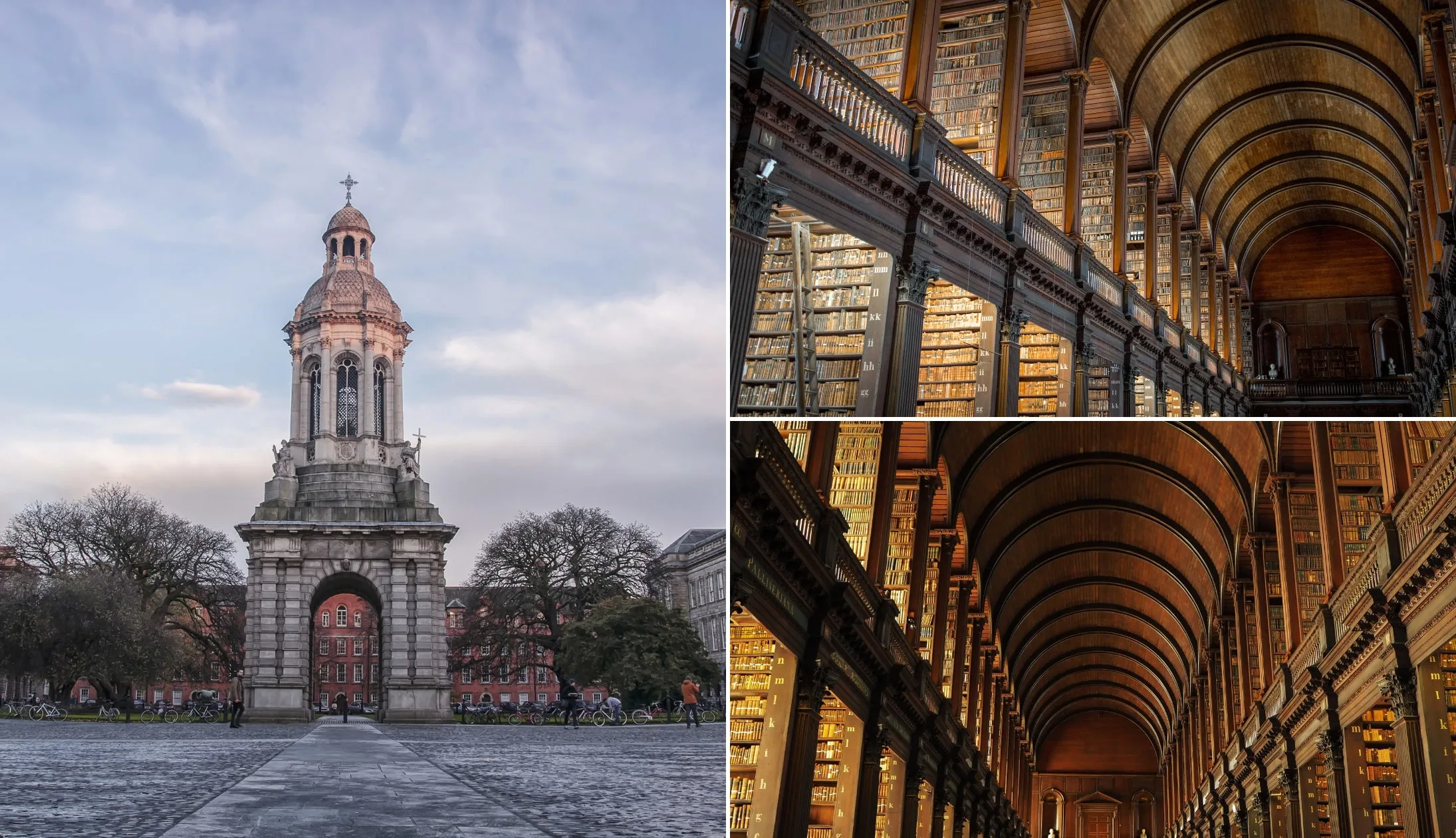
Photos via Shutterstock
Your first official stop of the day in Dublin is Trinity College to see the Book of Kells, arguably the most famous cultural attraction in Dublin.
If you can, we highly recommend pre-booking your tickets online, as the queues can get really long (bordering on ridiculous!). This fast-track ticket allows you to dodge the queue and gets you into Dublin Castle, too!
Spend around one hour seeing the Book of Kells, walking around the exhibit, and taking in the beauty of the Old Library. After that, give yourself another 20 minutes or so to walk around the university campus.
Stop 4: Lunch
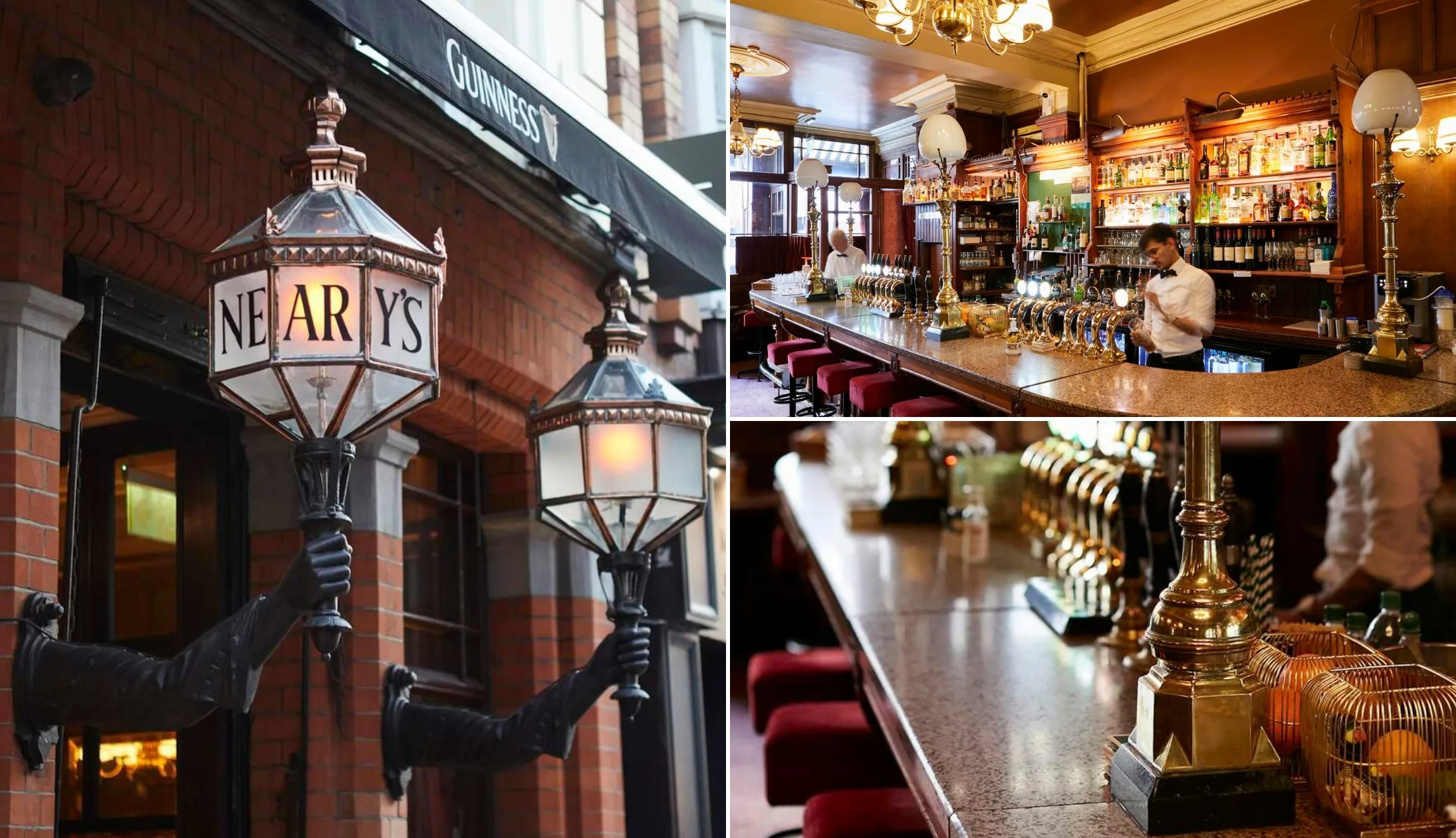
Photos © Tourism Ireland
There’s plenty of great restaurants in Dublin that serve up a delicious lunch, but if you fancy a tasty bite in a lovely old-world-style pub, Neary’s just off of Grafton Street is hard to bate!
From the Trinity Gates, it’s only a six-minute walk up Grafton Street.
They serve simple dishes (like soups and sandwiches) that are packed with flavour and great value for money. Alternatively, Sprout and Co. on Dawson St. is also a great choice.
They have a range of hearty salad bowls, with good options for vegetarians and vegans.
Stop 5: The Ha’Penny Bridge (via Temple Bar)
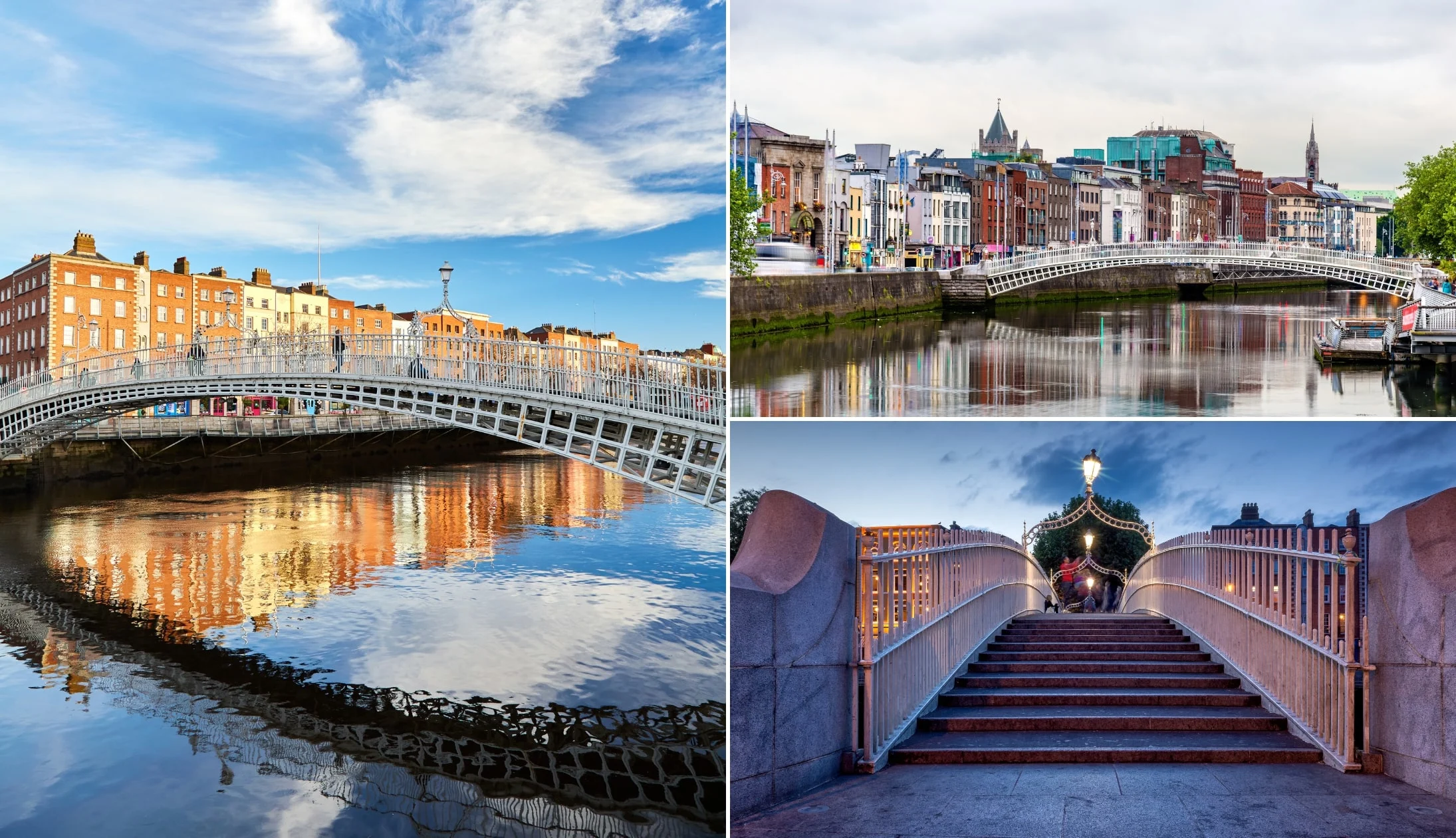
Photos via Shutterstock
The Ha’penny Bridge (officially named the Liffey Bridge) dates back to 1816 and was the first pedestrian bridge over the River Liffey!
It’s a 10-minute walk from Grafton Street, but feel free to take your time as you make your way through the lively streets of Temple Bar.
Now, Temple Bar can be a bit of a tourist trap. If you fancy a pint, here are several pubs in Temple Bar worth trying (the Palace is our go-to).
If you feel like an afternoon coffee, there are some great cafes in the Temple Bar area or on the other side of the river. Joe’s Coffee and Vice Coffee are two of our favourites across the water.
They’re both just a short stroll from the north side of the Ha’penny Bridge.
Stop 6: Guinness Storehouse
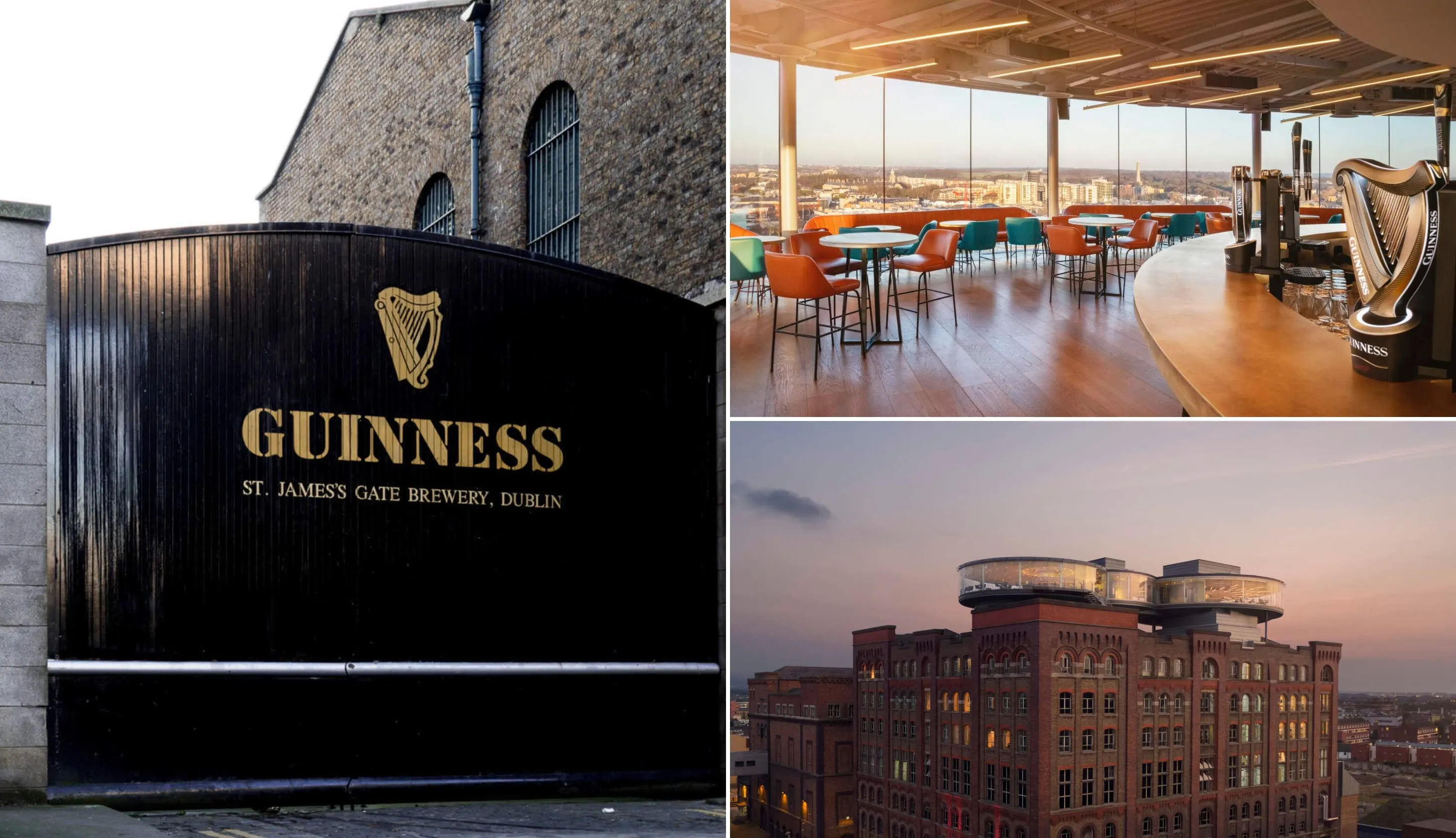
Photos © Diageo via Ireland’s Content Pool
From the bridge, it’s a 17-minute stroll to the Guinness Storehouse. It’s at St. James’s Gate, the home of Guinness, and there are several tours available.
We recommend the Guinness Storehouse Experience, a self-guided tour that takes roughly 90 minutes.
You’ll learn about Guinness’ history, its ingredients, and get to enjoy a pint of Guinness and one other Guinness beer (for ages 18+) whilst taking in the views of the Gravity Bar.
Stop 7: Dinner, drinks and live music
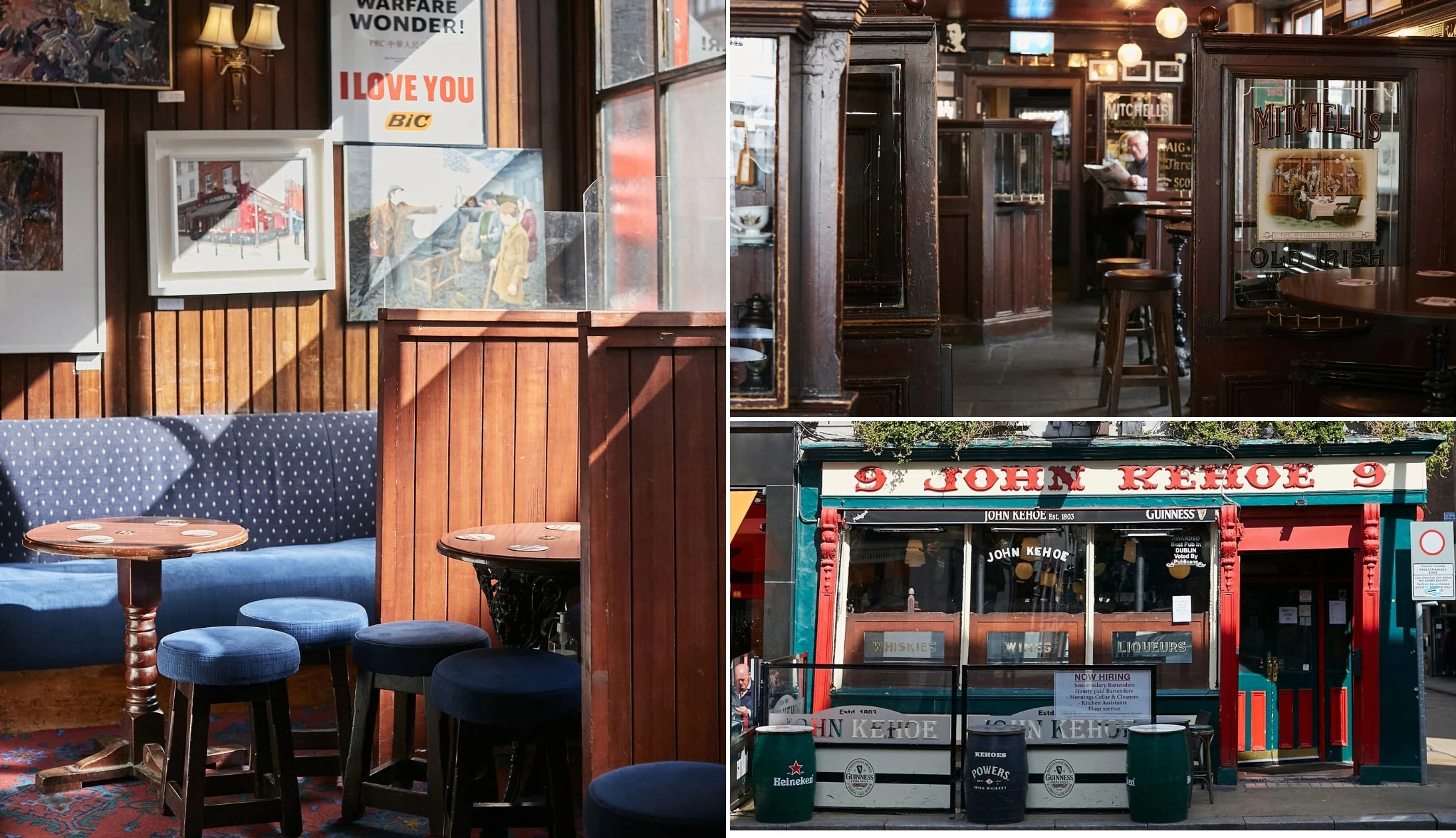
Different trad bars in Dublin. © Tourism Ireland
If you haven’t already checked into your accommodation, you may want to do so now before heading out for dinner, drinks, and music.
By now, you must be getting hungry. Dublin has heaps of options for dinner, but we’ve got a couple of suggestions for you!
Our dinner recommendations
If you’re looking for something close by, Spitalfields is a short walk from the cathedral. It’s a little bit pricey, but the atmosphere is great and the food is top-notch!
However, Spitalfields is 16+ only, so it’s not suitable for young families. Otherwise, check out The Bull and Castle across the street from Christ Church Cathedral.
Their menu has F.X. Buckley Steaks (renowned in Dublin), plus a great selection of local craft beers. The restaurant can get booked out pretty quickly, but you can always eat in the bar upstairs, which also has steak on the menu.
Live music and trad bars
If you want a taste of what Dublin’s best pubs are, see our detailed Dublin pubs guide. If you’re solely looking for places that do exceptional Guinness, see our guide to Dublin’s best pints.
If you fancy a bit of live music, there’s plenty on offer. Pipers Corner on Marlborough St. has some great tunes, with live music from 9pm every Tuesday to Saturday, and from 8pm on Sunday.
The inside has more of a modern feel, but you’ll be guaranteed authentic Irish music.
For the full experience, O’Donoghues Bar on Merrion Row has live music every night of the week. It’s about as traditional as Irish pubs get, with a brilliant atmosphere.
The Celt is another fantastic pub with live music every night from 9pm, although it’s not always traditional.
Day 2: Wicklow’s Wonders
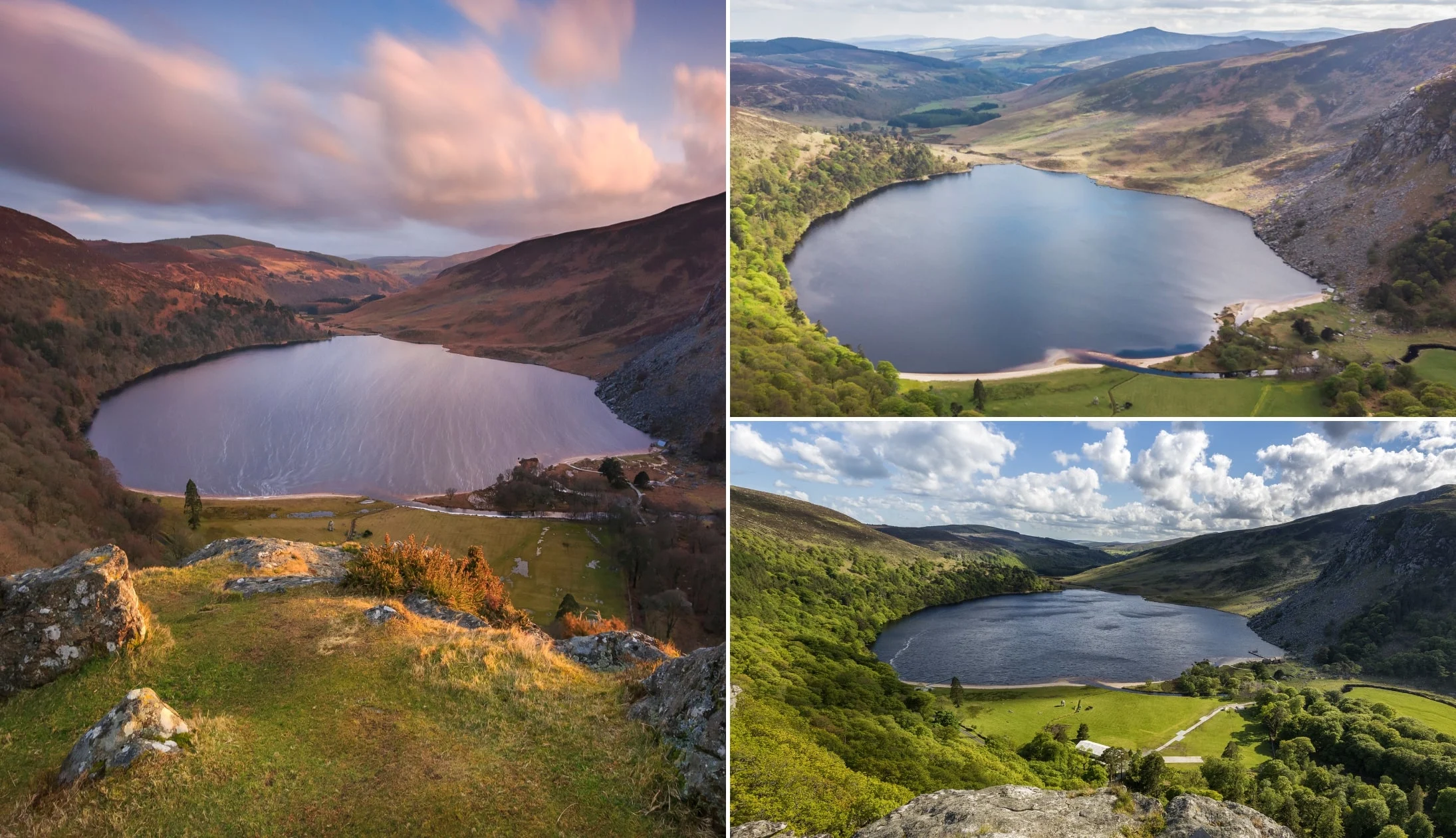
Photos via Shutterstock
Today, you’ll be exploring Wicklow, the country just south of Dublin, also known as the Garden of Ireland.
You’ve got a big day ahead of you, so make sure to grab a hearty breakfast before you head off on your bus tour.
The tour leaves near the Molly Malone Statue on Suffolk Street, so if you’d rather eat out, we recommend heading to Keoghs Cafe (just around the corner from the statue) for breakfast and a coffee.
Getting to Wicklow option 1: A guided day trip
This 8-hour day trip includes a fully-guided day tour of Wicklow’s best sights and includes a visit to Powerscourt Gardens (you’ll need to pay into the gardens separately)!
You’ll be driven along the Sally Gap, see iconic film locations used in P.S. I Love You, Brave Heart, and Vikings, and explore an ancient 6th-century settlement.
There are two options for this tour, so make sure to choose the option with the Powerscourt Garden visit as this is the more easy-going choice.
We’ll take you through the stops below, but note that 1, you may not always physically stop at all of these sights and 2, these tours are subject to change, so always check with the provider in advance.
Getting to Wicklow option 2: St. Kevin’s Bus
We definitely think a guided tour is the best way to explore Wicklow without a car, but if you can’t book onto the tour above, we suggest using St. Kevin’s Bus to get to Glendalough.
Take a look here for an in-depth guide. This should really be your Plan B as the guided tour includes the Sally Gap Drive, which is fantastic!
Stop 1: The Sally Gap Drive
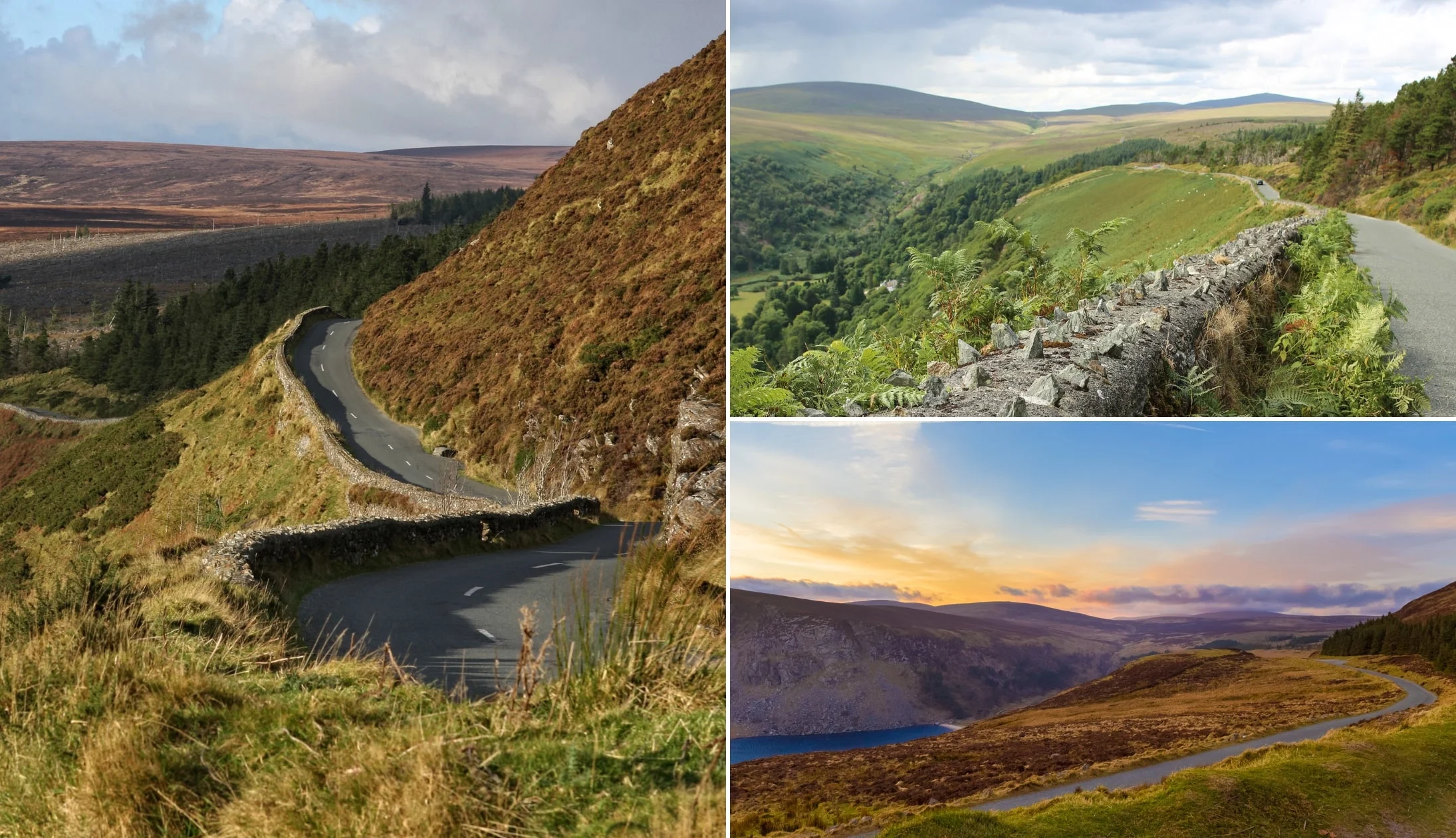
Photos via Shutterstock
OK, this isn’t really a stop. The Sally Gap is a famous crossroad on the Old Military Road through the Wicklow Mountains. The road was built in the early 1800s following the Irish Rebellion of 1798.
It’s a beautiful drive, with spectacular views of the mountains and blanket bog. One of the most notable attractions in this area is Lough Tay (AKA Guinness Lake).
Another is Glenmacnass Waterfall. However, the mountain views and the narrow roads that you drive along are what’ll really make this corner of Ireland a place that you won’t forget.
Stop 2: Glendalough Monastic City
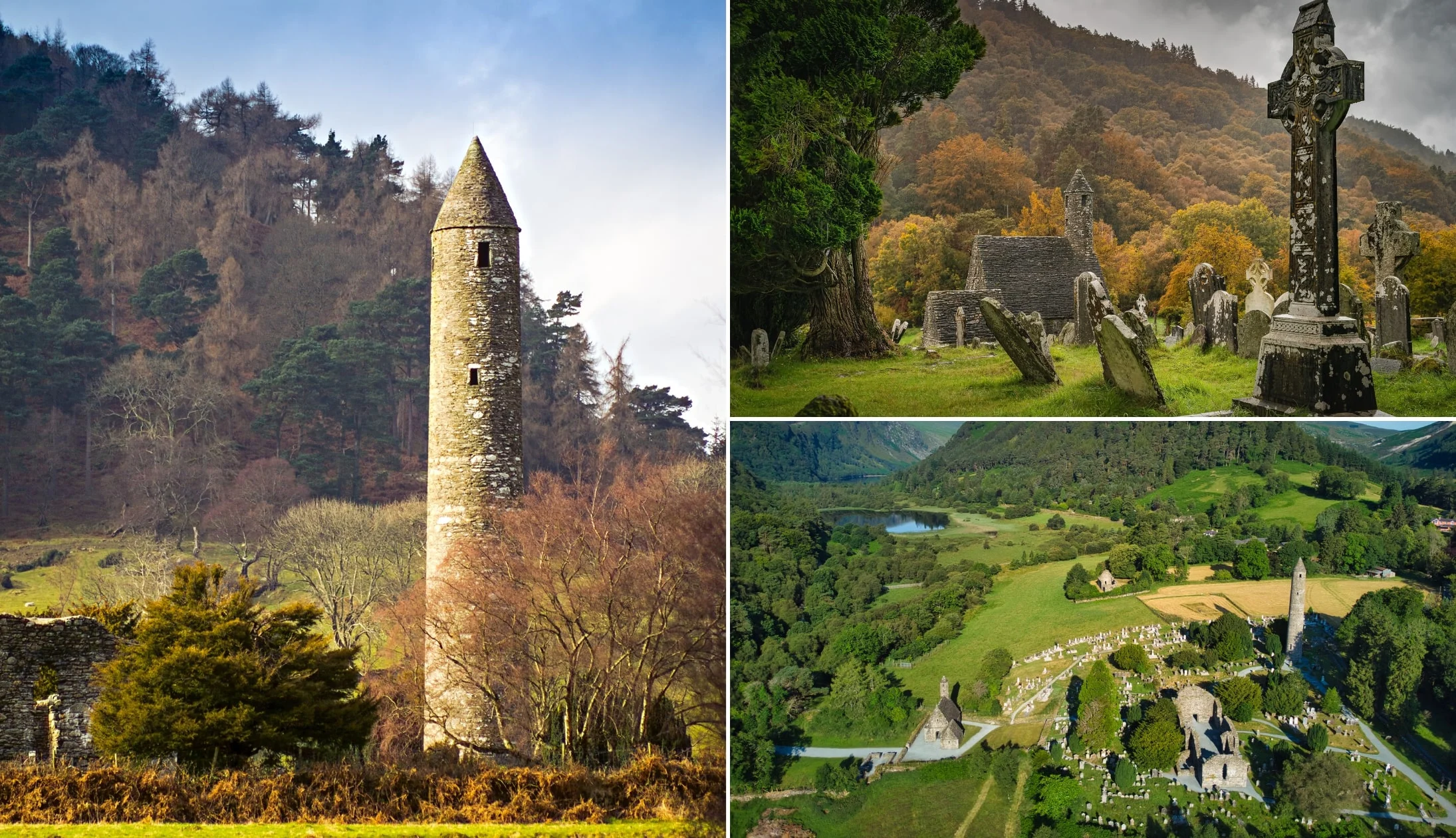
Photos via Shutterstock
The Monastic City was one of the most important monastic sites in this part of the country. The city was founded by St. Kevin in the 6th century and went on to become one of Europe’s most famous religious sites!
Right next to the settlement, there’s a visitor centre where you can enjoy the exhibits and learn more about the site and what made it so important.
After you’re all clued up, walk the 2 minutes to the monastic site and admire the Glendalough Round Tower, Cathedral, and St. Kevin’s Church.
Stop 3: The Lakes at Glendalough
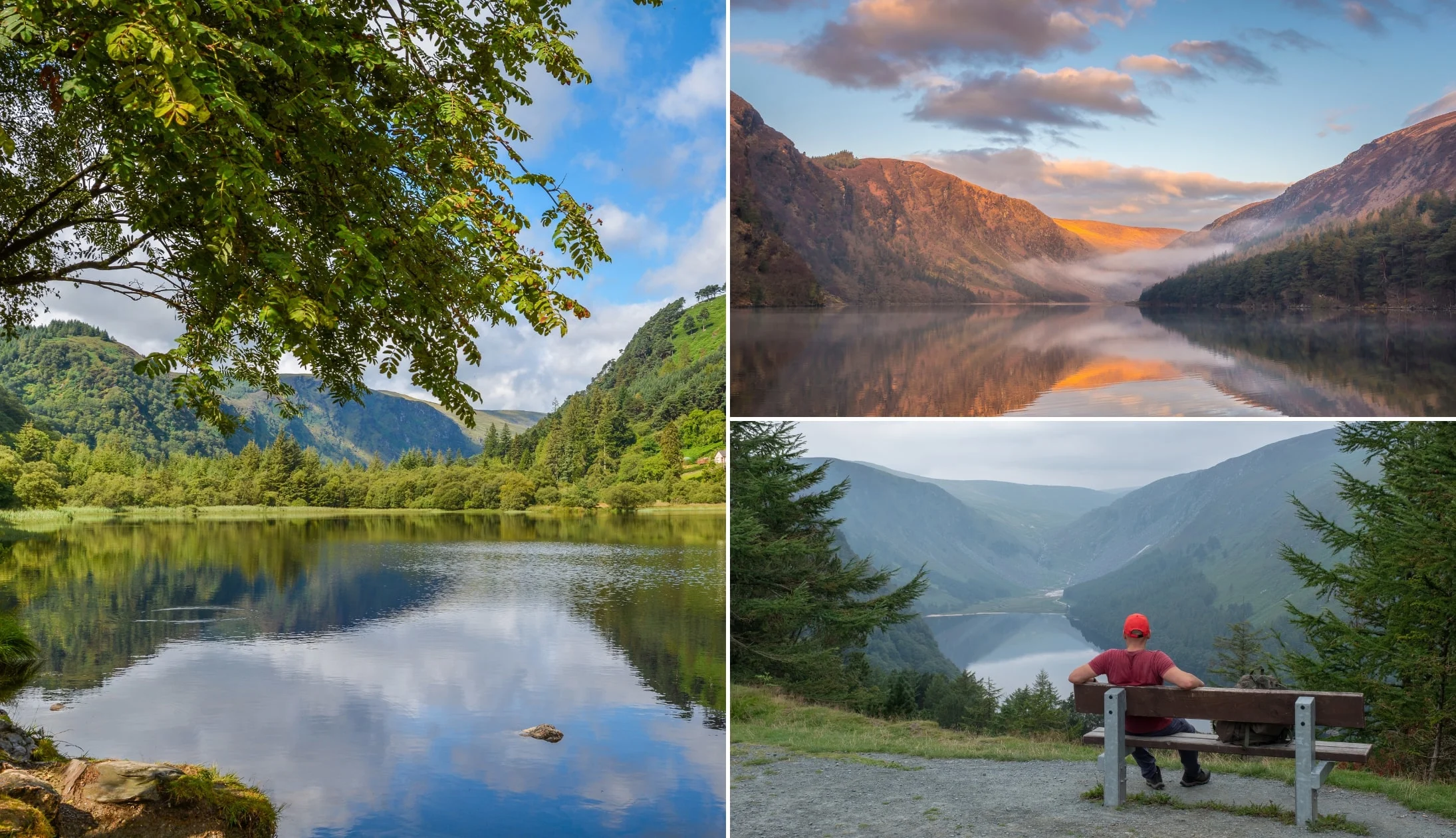
Photos via Shutterstock
Along the way, you’ll be passing by Glendalough Upper Lake and Lower Lake. Carved out by a melting glacier long ago, the upper lake is spectacular, nestled between trees and mountains.
It’s home to St. Kevin’s Bed, a small cave where St. Kevin lived as a hermit for several years before he founded the monastic city.
The lower lake is the smaller of the two, but equal in beauty, with gorgeous views of the mountains and forest.
Stop 4: Powerscourt Gardens
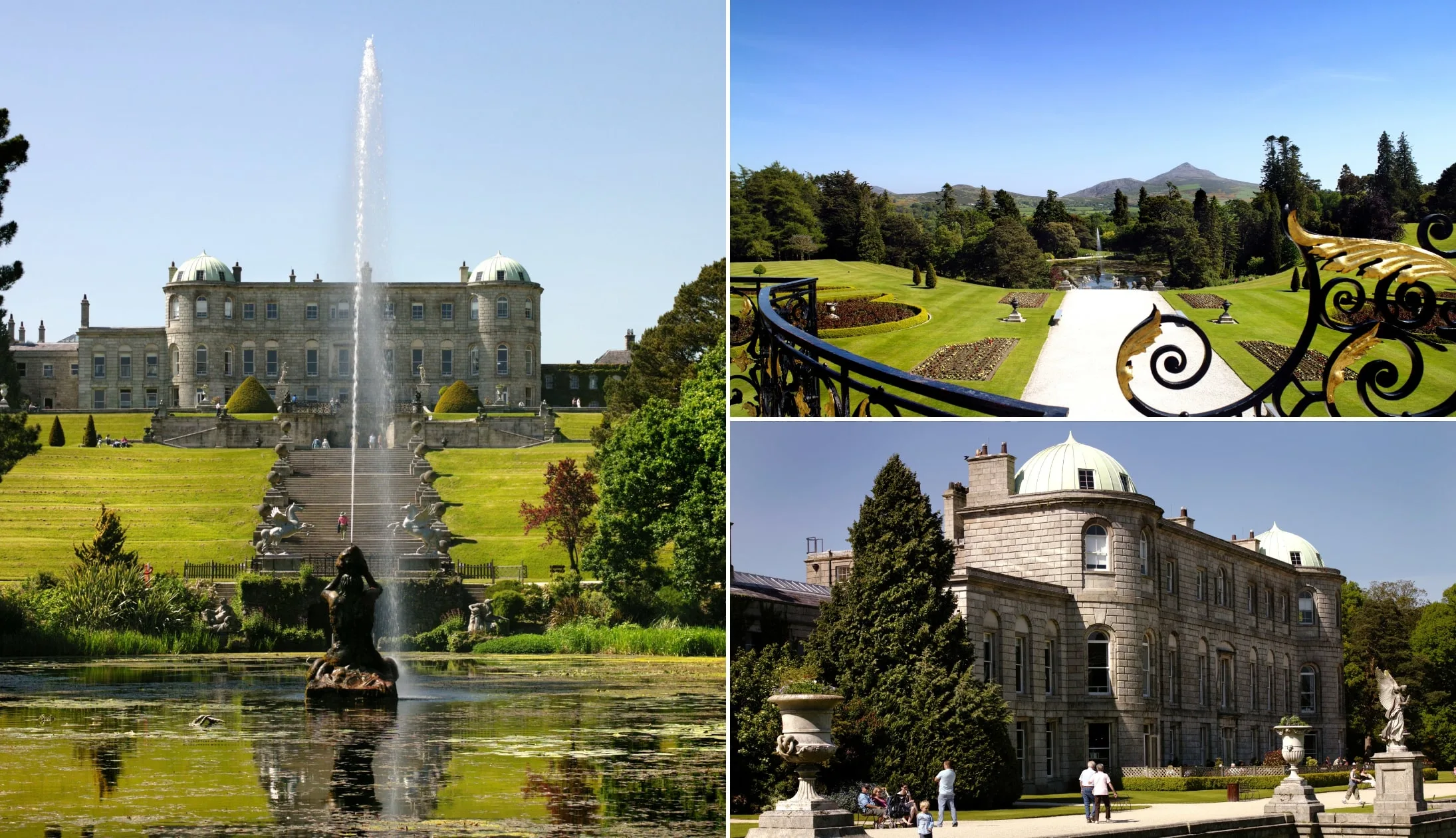
Photos by Chris Hill via Failte Ireland
The Powerscourt Gardens are filled with grandeur and were voted by National Geographic as one of the world’s Top Ten Gardens!
The 47-acre Powerscourt Gardens are managed by a team of five gardeners, who tend to the Walled Garden, the Japanese Garden, the Italian Garden, and more.
The grounds are filled with ornamental lakes, formal gardens, and statues, making them perfect for a leisurely stroll!
Stop 5: Back to Dublin for the evening

Different trad bars in Dublin. © Tourism Ireland
After a long day of sightseeing, you’ll be heading back to the city.
Our dinner recommendations
If you’re looking for something close by, Spitalfields is a short walk from the cathedral. It’s a little bit pricey, but the atmosphere is great, and the food is top-notch!
However, Spitalfields is 16+ only, so it’s not suitable for young families. Otherwise, check out The Bull and Castle across the street from Christ Church Cathedral.
Their menu has F.X. Buckley Steaks (renowned in Dublin), plus a great selection of local craft beers. The restaurant can get booked out pretty quickly, but you can always eat in the bar upstairs, which also has steak on the menu.
Live music and trad bars
If you want a taste of what Dublin’s best pubs are, see our detailed Dublin pubs guide. If you’re solely looking for places that do exceptional Guinness, see our guide to Dublin’s best pints.
If you fancy a bit of live music, there’s plenty on offer. Pipers Corner on Marlborough St. has some great tunes, with live music from 9pm every Tuesday to Saturday, and from 8pm on Sunday.
The inside has more of a modern feel, but you’ll be guaranteed authentic Irish music.
For the full experience, O’Donoghues Bar on Merrion Row has live music every night of the week. It’s about as traditional as Irish pubs get, with a brilliant atmosphere.
The Celt is another fantastic pub with live music every night from 9pm, although it’s not always traditional.
Day 3: The trip to Galway
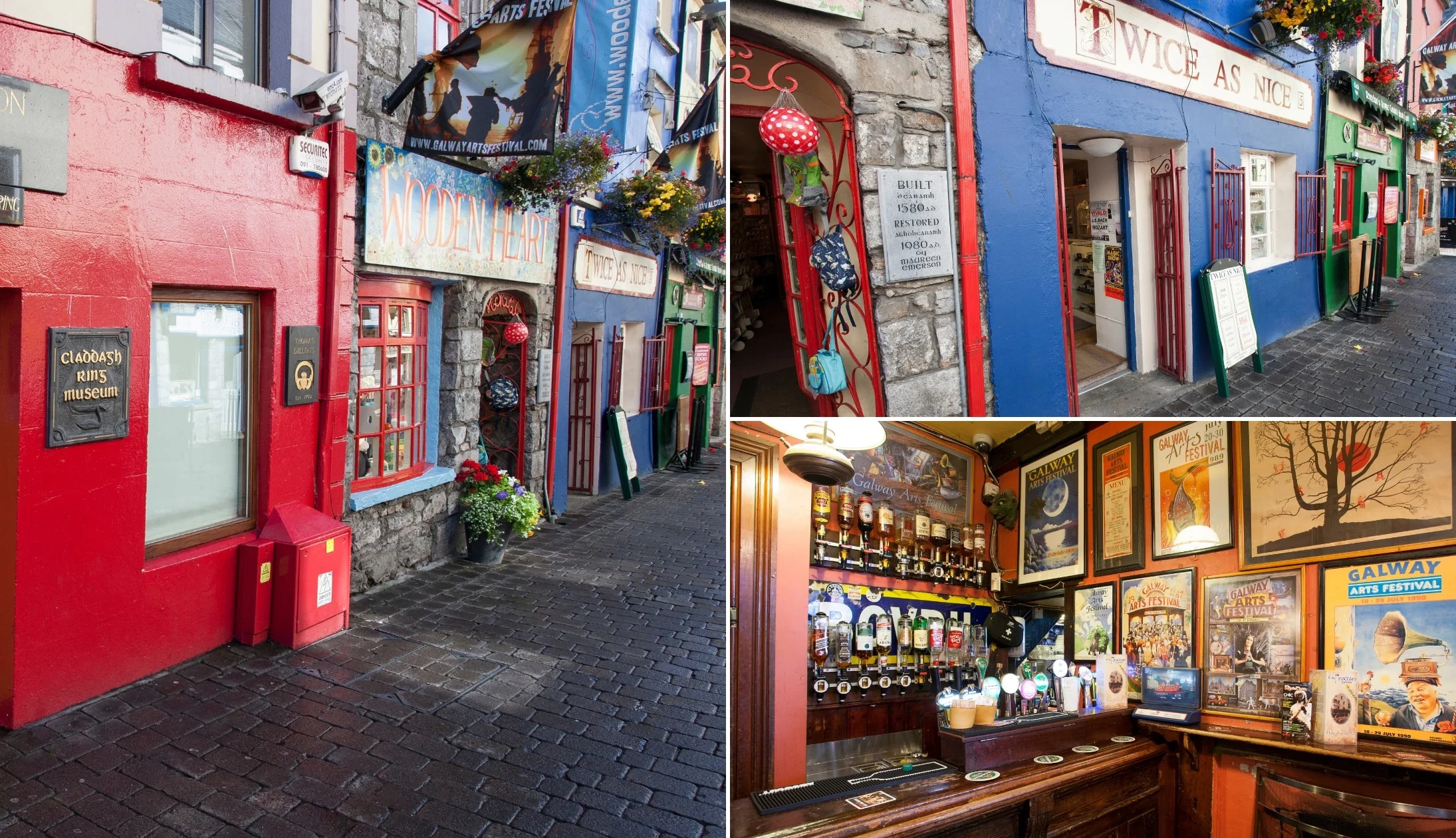
Photos by Stephen Power via Ireland’s Content Pool
Today you’re heading to colourful Galway, where you’ll be spending two nights!
If you haven’t found anywhere to stay yet, here are our top budget, mid-range, and luxury picks for Galway:
Recommended accommodation in Galway
- Budget: Feeney’s Audubon Lodge (in Salthill outside of the city by the sea) and Corrib View Guesthouse (a 45-minute walk from Eyre Square)
- Mid-range: Balcony House B&B (10-minute walk from Eyre Square) and Ash Grove House (gorgeous guesthouse near Galway Cathedral)
- Luxury: The G Hotel (luxury hotel in the city) and Glenlo Abbey (one of Ireland’s top hotels – 15-minute drive from city)
Stop 1: Heuston Station
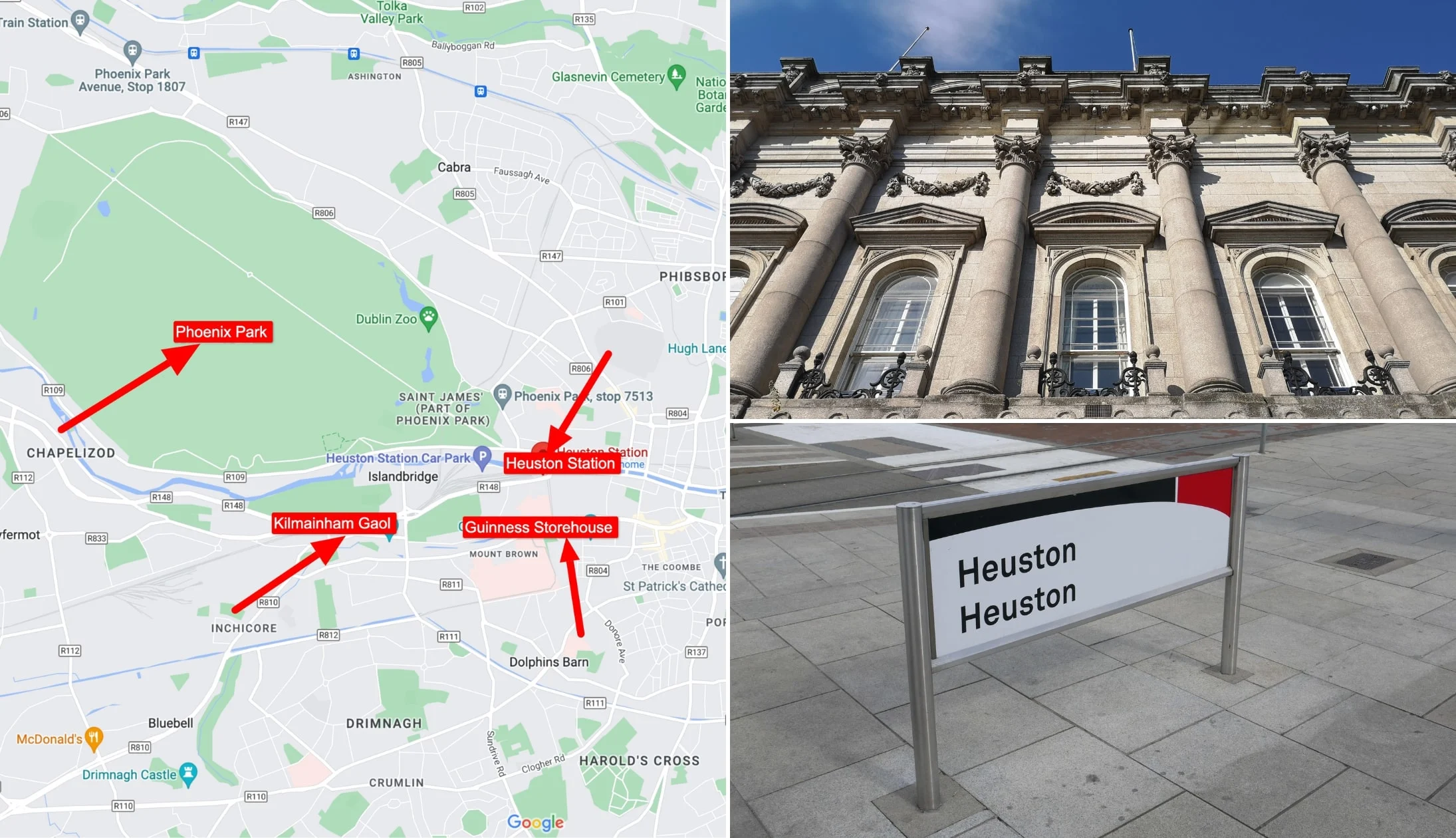
Photo left: Google Maps. Others: Shutterstock
The train from Dublin to Galway departs from Heuston. There are several ways to get there, you can take a taxi, walk, or take the Luas Red line, which has a stop right out of the front.
The trip to Galway takes about 2.5 hours. There are plenty of shops inside the station where you can grab snacks for the train and get some breakfast. There are better options in the station, so we recommend buying food for the train instead of waiting to buy something on the train.
Stop 2: Galway Ceannt Station
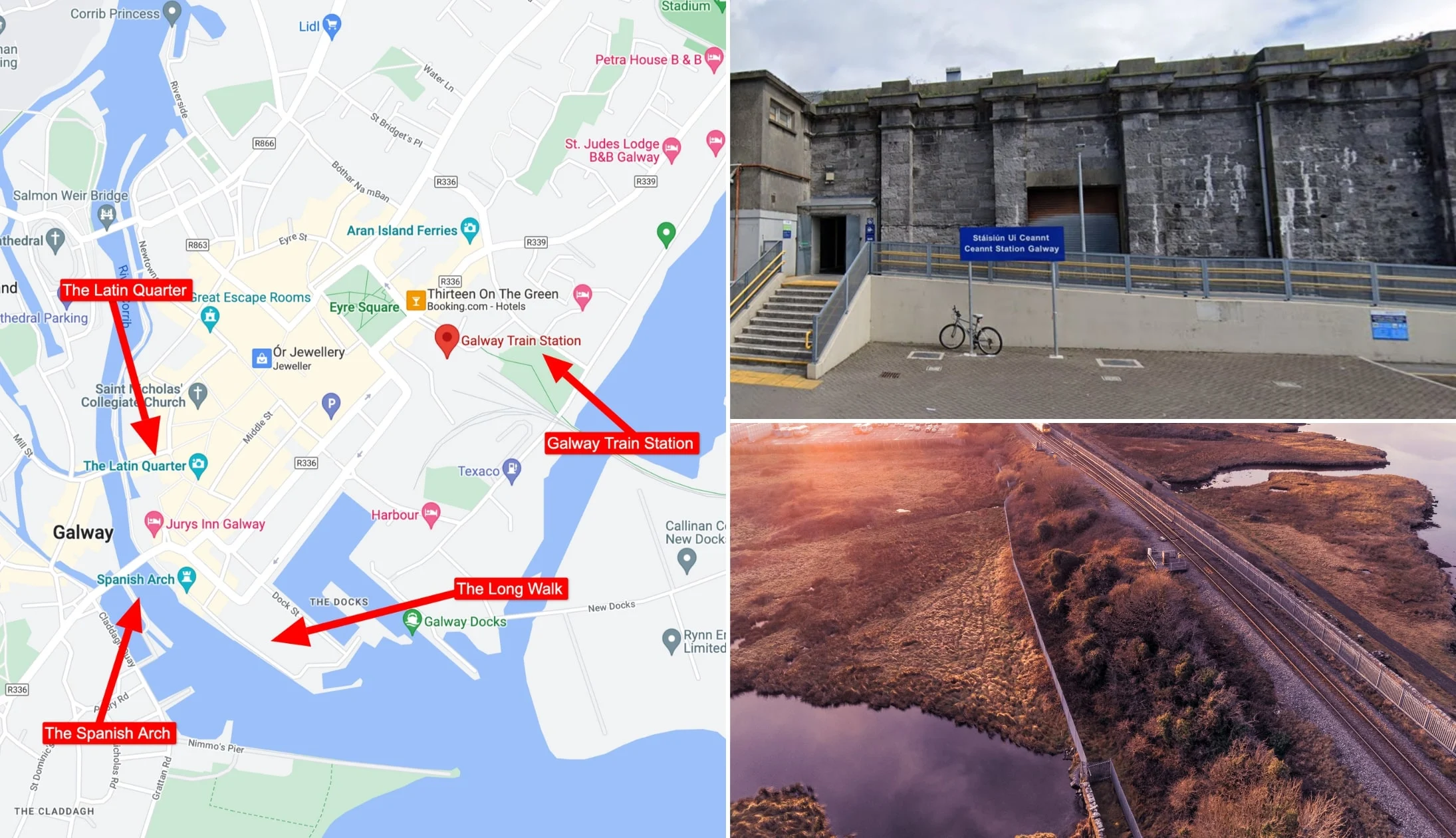
Bottom right photo: Shutterstock. Others: Google Maps
Welcome to Galway! The train station is located in the centre of Galway. From here we recommend you go drop off your bags before setting off to explore the city on foot.
Stop 3: Check in, get lunch and decide between walking or the bus
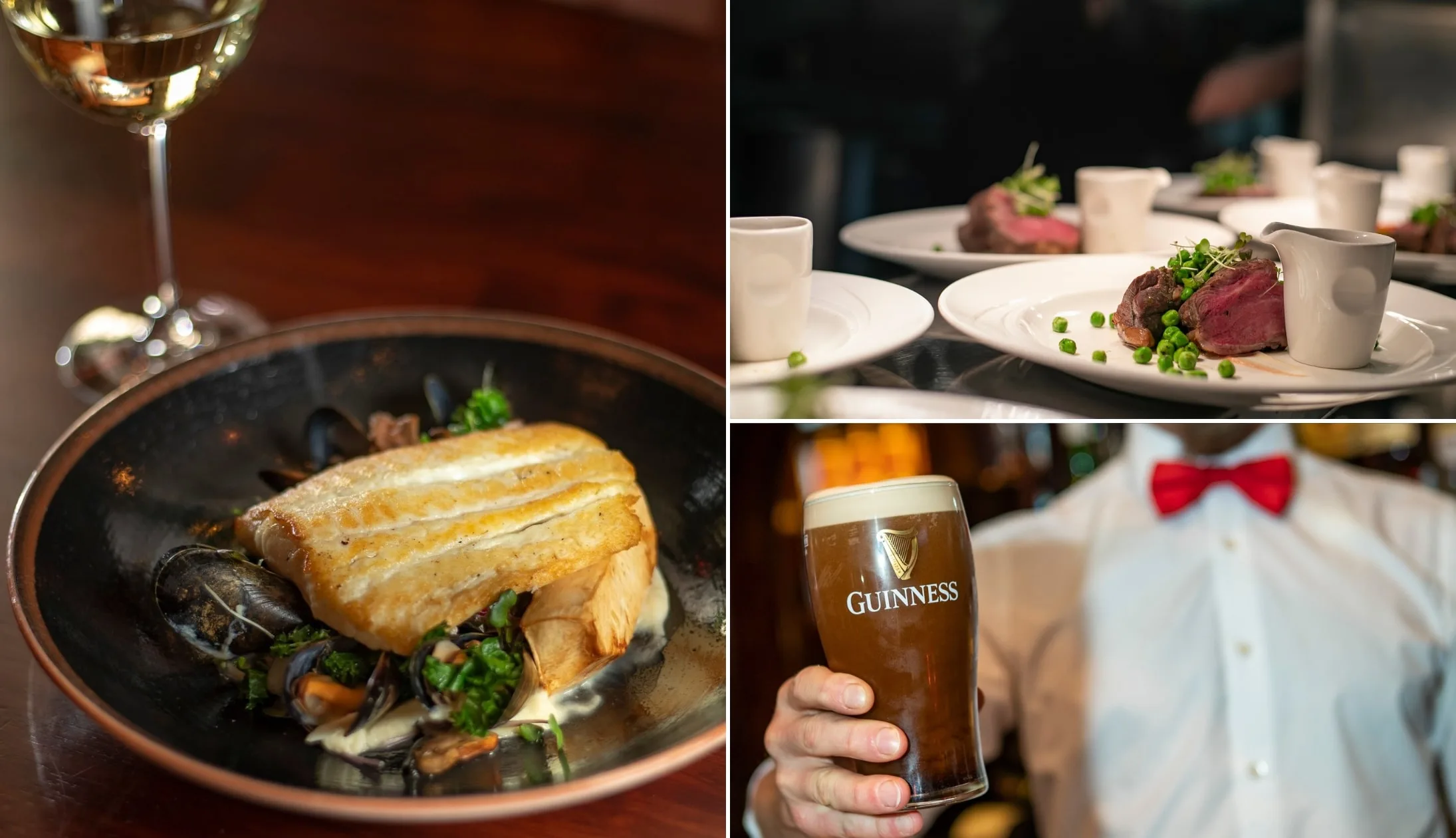
Photos via Blakes Bar Galway on FB
When you land in Galway, head to your accommodation, get checked in and head for lunch.
By now, you must be hungry. There are heaps of brilliant places for lunch in Galway, but if you don’t want the hassle of finding somewhere to eat, we’ve got a few suggestions!
We recommend Blakes Bar (traditional pub grub), Zappis (authentic Italian cuisine), or Tigh Neachtain (Irish and international cuisine).
Now, Galway is a very walkable city, but if it’s raining or if you fancy getting dropped to the ‘main’ attractions the hop-on/hop-off bus tour is well worth buying.
Regardless of which option you choose, here are some of our favourite sites in Galway City (we’ve listed them in a logical way for you to walk between them).
Stop 4: Galway Cathedral
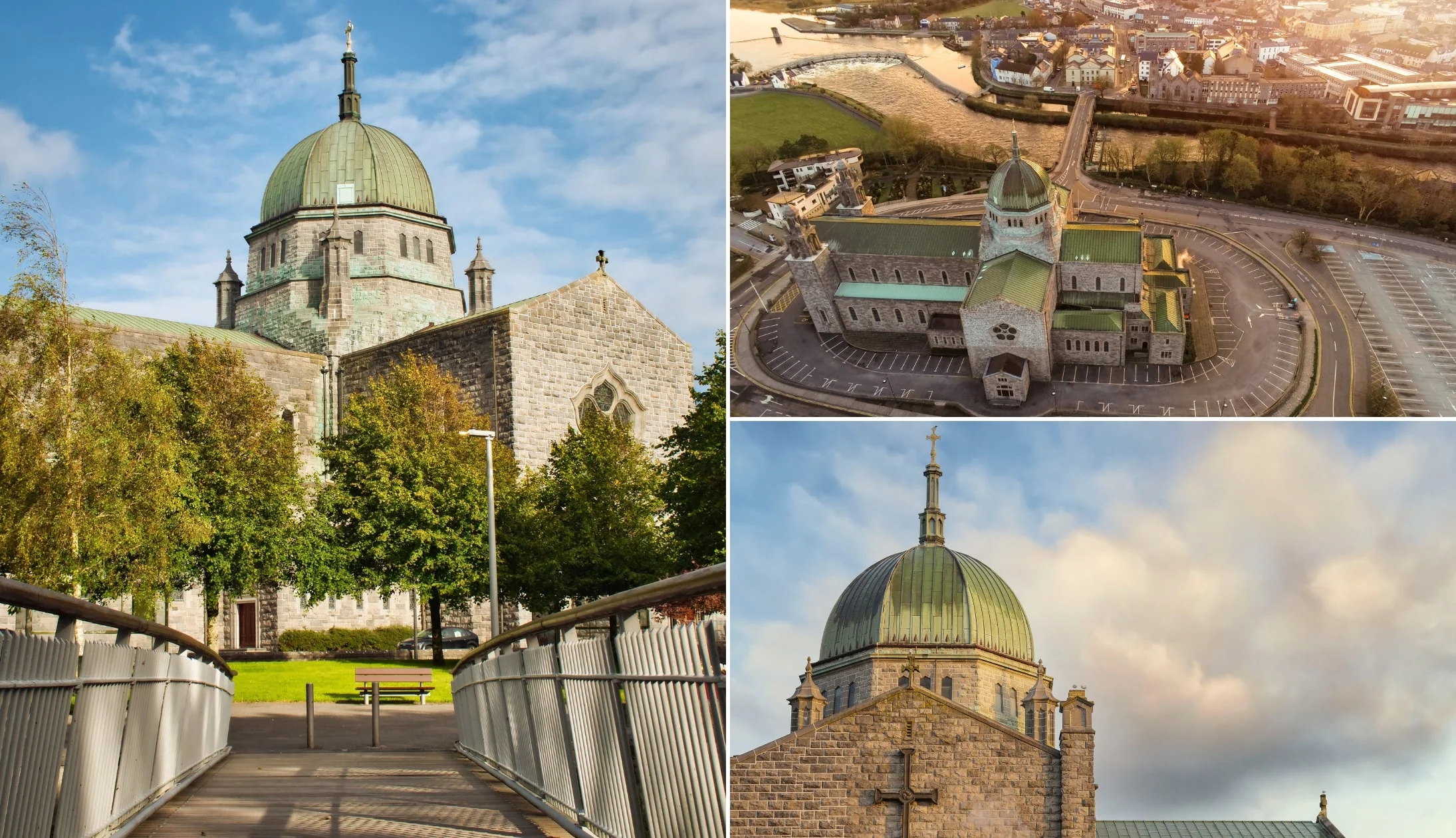
Photos via Shutterstock
Galway Cathedral is wonderfully impressive both inside and out. It’s arguably the jewel in the Galway City skyline and you’ll cop it from many places as you stroll around the city.
Interestingly enough, it’s not as old as it looks, and construction on the building was only completed in 1965, earning it the title of ‘the last great stone cathedral to be constructed in Europe’.
The cathedral is free to enter, but visitors are asked for a donation of €2 to help with the building’s upkeep.
Stop 5: Quay Street and the Latin Quarter

Photos by Stephen Power via Ireland’s Content Pool
Galway’s colourful streets are an absolute joy the ramble along regardless of the time of year.
If you’re walking from the cathedral, you’re a short stroll away from the Latin Quarter and Quay Street where you can have a nosey around.
These streets are alive with the buzz from tourists and locals alike.
Stop 6: The Hall of the Red Earl
One of our favourite places to visit in Galway (especially if it’s raining!) is the Hall of the Red Earl.
The Hall of the Red Earl is one of Galway’s most interesting sites. The ruins date back to the 13th century, with ties to the founding of Galway and the Anglo-Norman De Burgo family.
It was the first municipal building in the city, used for collecting taxes, hosting banquets, and sentencing criminals.
The Hall of the Red Earl was lost as the city grew until 1997, when the ruins were unearthed by archaeologists on behalf of the Office of the Public Works.
Today, you can walk amongst the ruins, view the artefacts, and learn about the hall’s history from the informative displays.
Stop 7: Galway City Museum
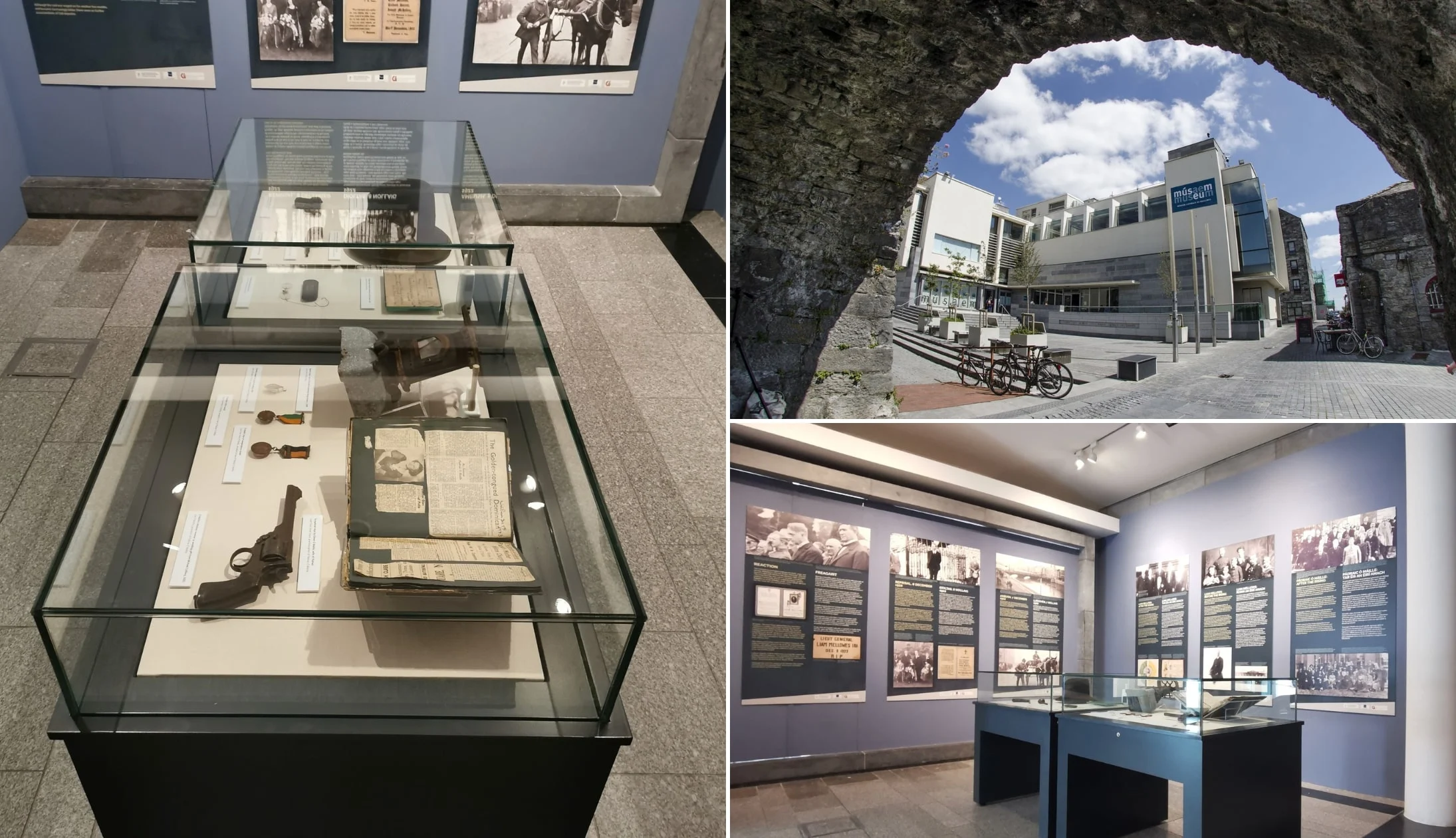
Photos via Galway City Museum on FB
The Galway City Museum is just a stone’s throw from the Spanish Arch. It’s one of the best places to learn about Galway’s history, culture, and archaeology, with collections telling the story of prehistoric Galway all the way through to 19th and 20th-century Galway!
The museum has three floors and seven long-term exhibitions, including The Wild Atlantic – Sea Science, and an exhibition on Pádraic Ó Conaire.
It’s free to visit, although donations are always appreciated.
Stop 8: Spanish Arch and the Long Walk
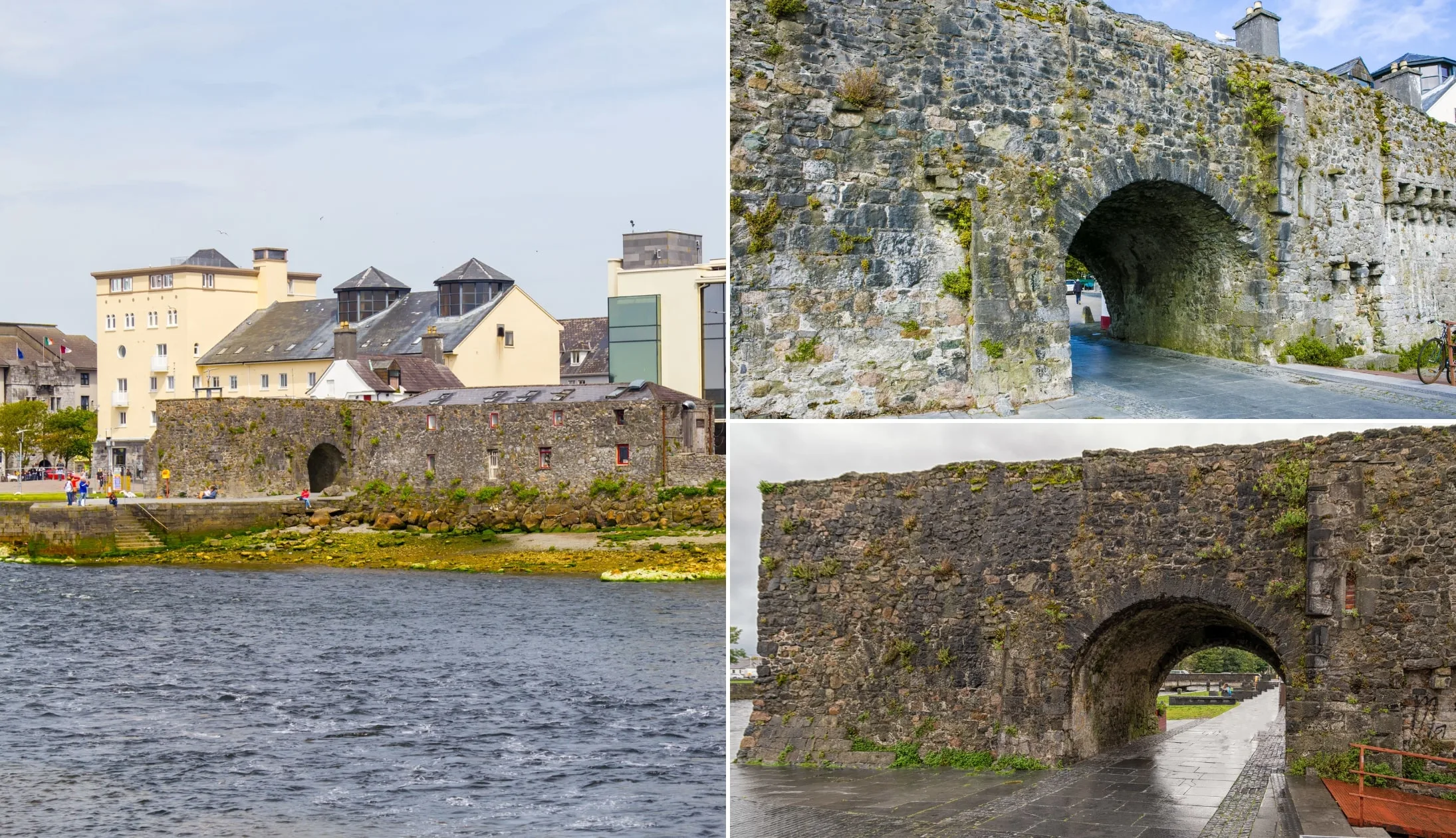
Photos via Shutterstock
The Spanish Arch is a must-see Galway attraction, dating back to Medieval times. The large stone arch is located on the outskirts of the city centre, overlooking the Claddagh (shore).
It originally housed soldiers who were keeping watch on the city’s Medieval walls. Its nickname is thought to come from the city’s merchant trade with the Spanish, whose ships would often be docked in the area!
From the Spanish Arch, you can take a short stroll alongside the water to what’s known as The Long Walk. You’ll likely have seen pictures of it (it’s a line of colourful buildings right on the water).
Stop 9: Dinner, drinks and live music
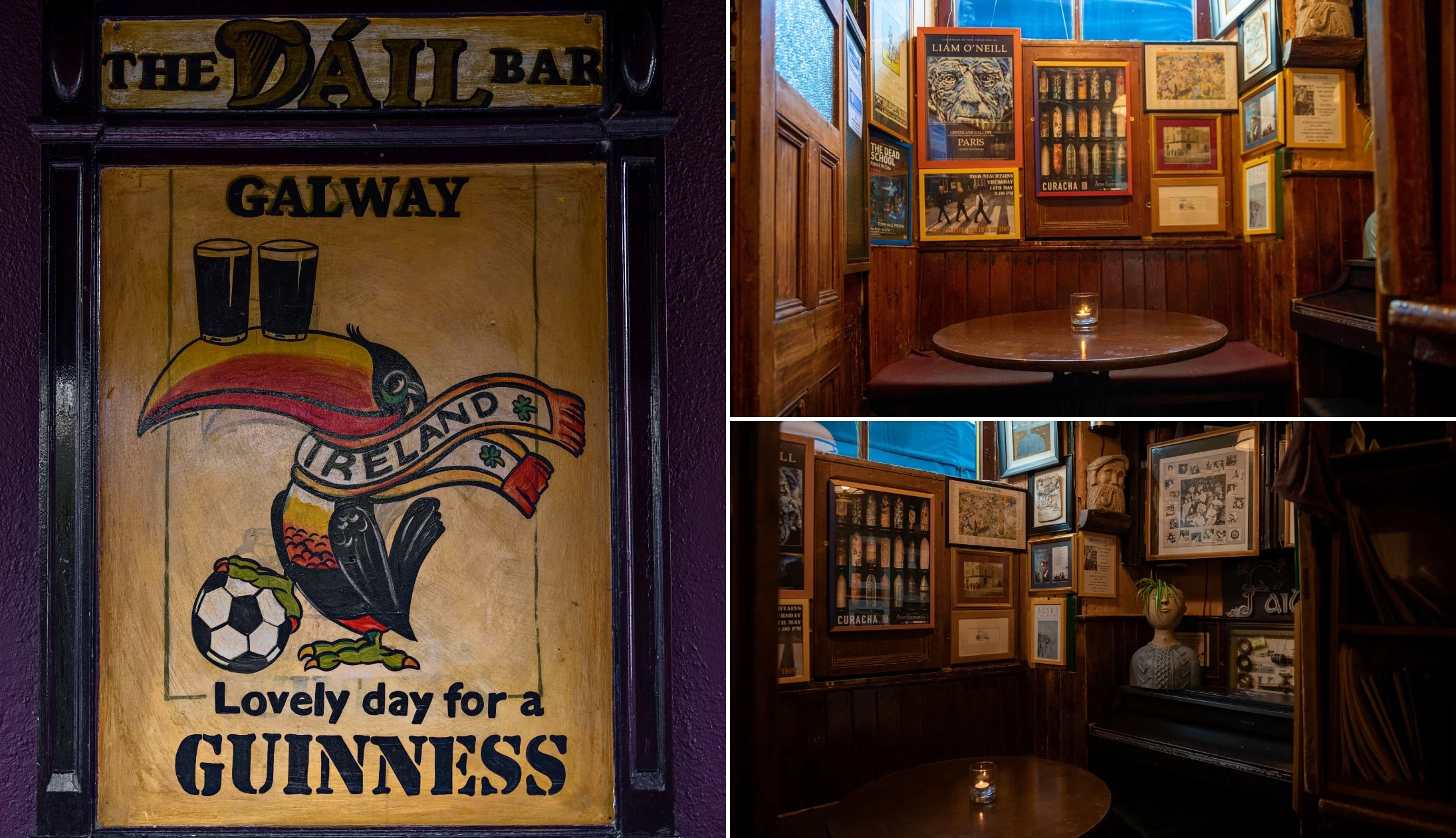
Photos courtesy Failte Ireland
Galway is a lively city regardless of the time of year. Here’s some spots worth checking out:
Our dinner recommendations
For dinner, we’ve got a few stellar recommendations: Ard Bia, The Quay Street Kitchen, and Dela. Ard Bia is absolutely fantastic, but you need to book in advance for dinner.
The restaurant has a quirky interior and serves beautifully presented modern dishes.
The Quay Street Kitchen has a great selection of vegan and vegetarian-friendly dishes, and Dela has modern Irish cuisine on the menu.
Live music and trad bars
There’s some mighty pubs in Galway. After dinner, head out for drinks at either Tigh Neachtain or The Crane. Both are traditional pubs with a great atmosphere.
Trad music is an integral part of the city, with heaps of options to choose from. Our favourite spots are Crane Bar (mentioned above) and Tigh Chóilí.
Day 4: County Clare
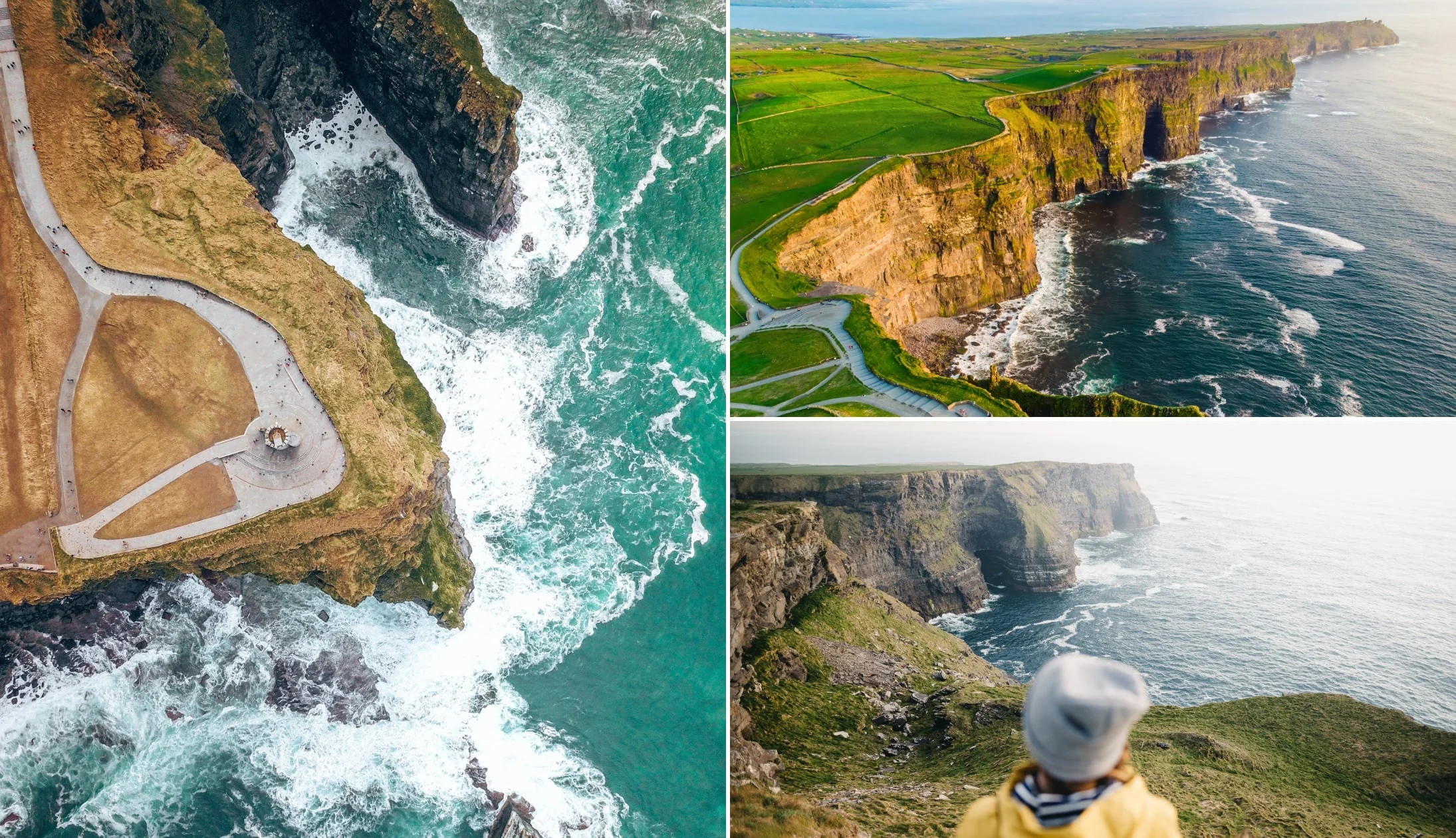
Photos via Shutterstock
Today, you’ll be taking a tour of North Clare. It’s a wonderful corner of the country, with beautiful landscapes and historical sites. It’s home to the Burren National Park and the Cliffs of Moher, one of the most popular natural tourist attractions in the country!
We’re recommending this 8-hour day trip from Galway City as it takes in a good chunk of Clare’s main attractions (and it has excellent reviews).
If you fancy a hearty breakfast, we’d recommend Pascal Coffee House (the pancakes are amazing) or Gaslight Brasserie (great for a full Irish or a breakfast burrito).
Keep reading below for an overview of the tour, but please note that 1, you may not always physically stop at all of these sights and 2, these tours are subject to change, so always check with the provider in advance.
Stop 1: Dunguaire Castle
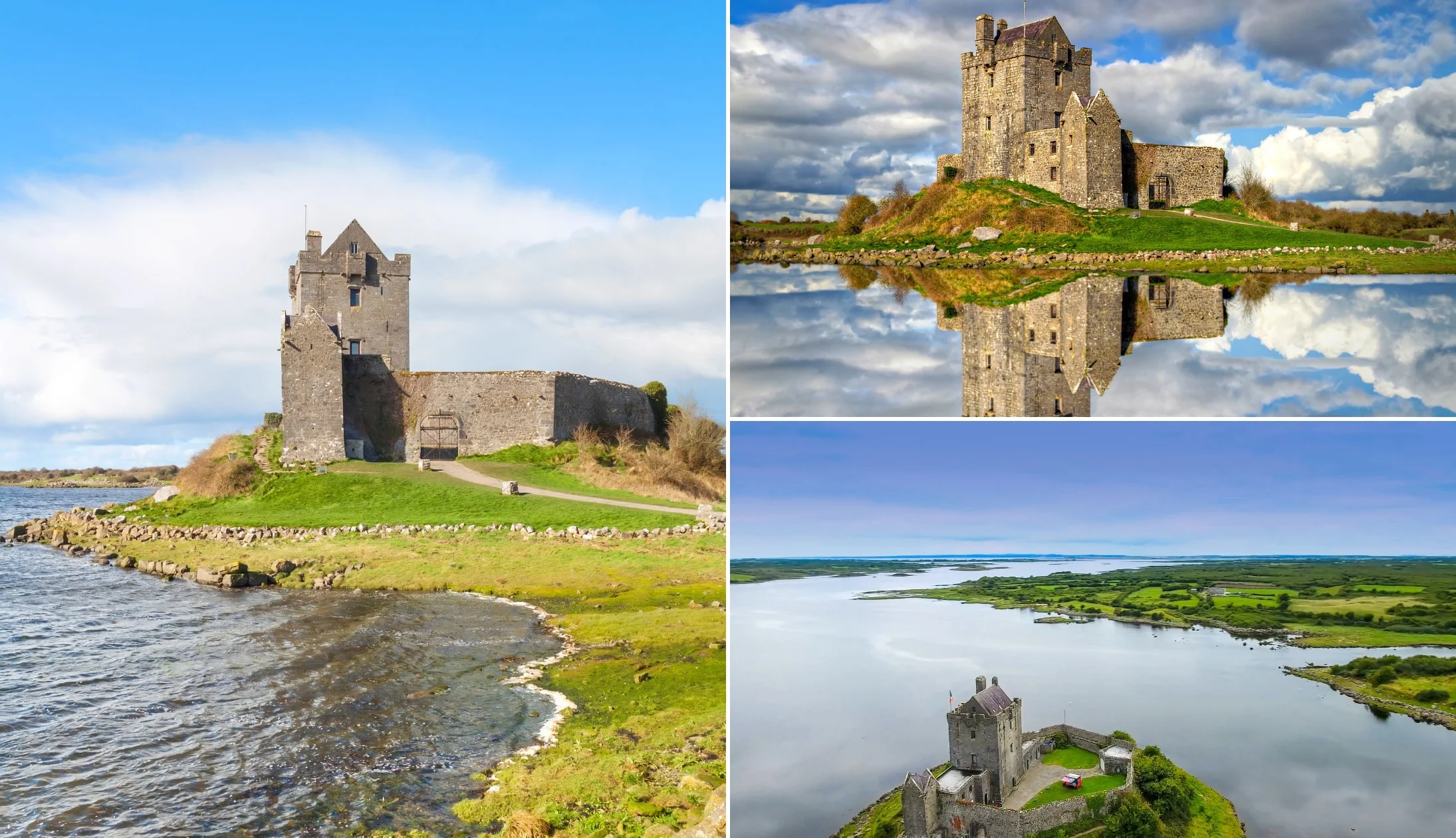
Photos via Shutterstock
The enchanting Dunguaire Castle sits on the shores of Galway Bay and has an impressive 75-foot tower.
According to legend, if you stand at the front gate and ask a question, you’ll have an answer by the end of the day!
The castle was built in 1520 and belonged to the O’Hynes clan. In 1912, the castle was bought by writer Oliver St. John Gogarty.
During his ownership, he restored the castle and hosted several famous writers, including W.B. Yeats and George Bernard Shaw.
Stop 2: Corcomroe Abbey
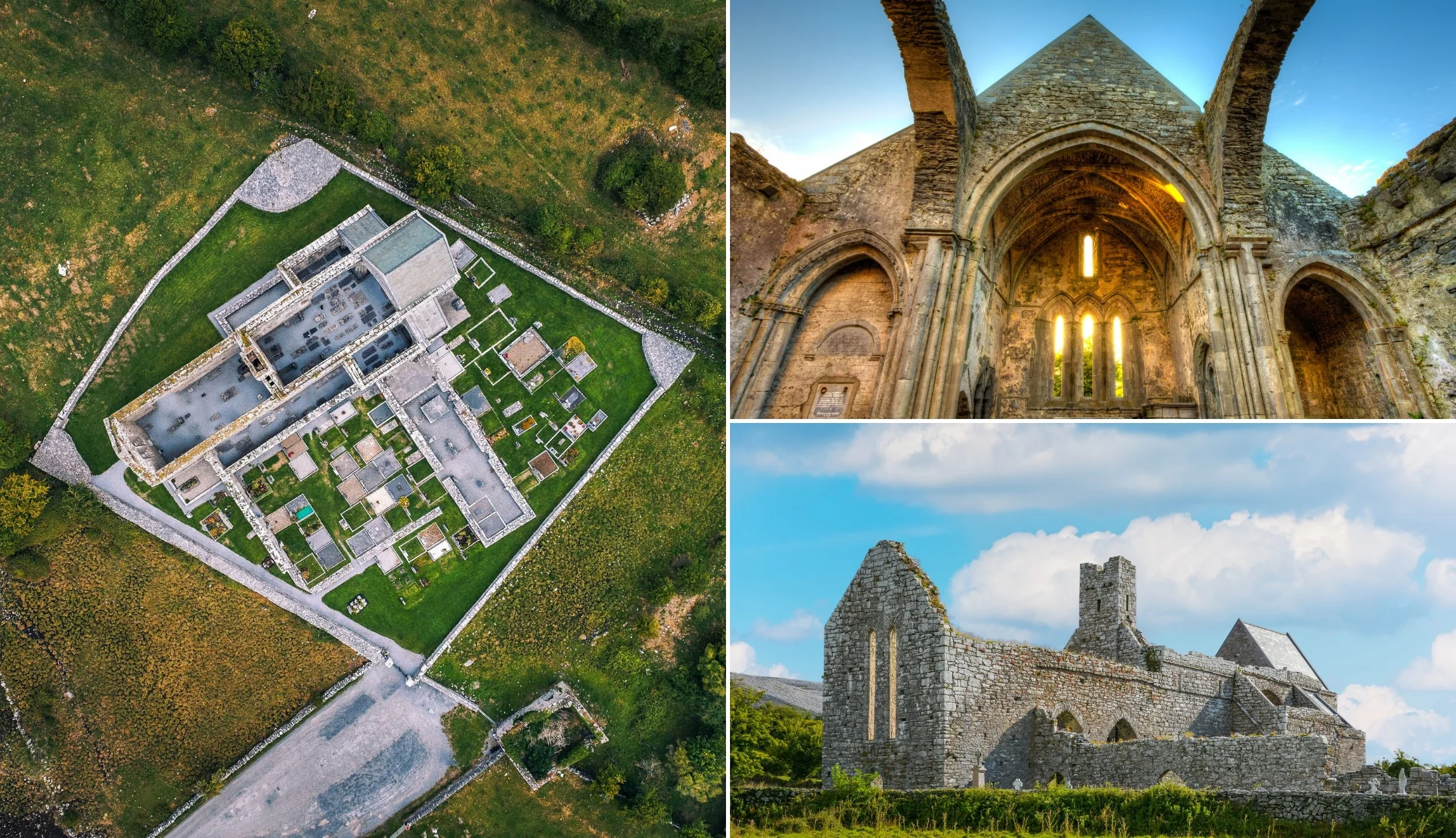
Photos via Shutterstock
Corcomroe Abbey is a late 12th/early 13th-century abbey ruin tucked away amongst the scenic Burren hills.
The ruins are in great condition and as you pass by, admire its Cistercian architecture set against the backdrop of lush green hills.
Stop 3: The Burren
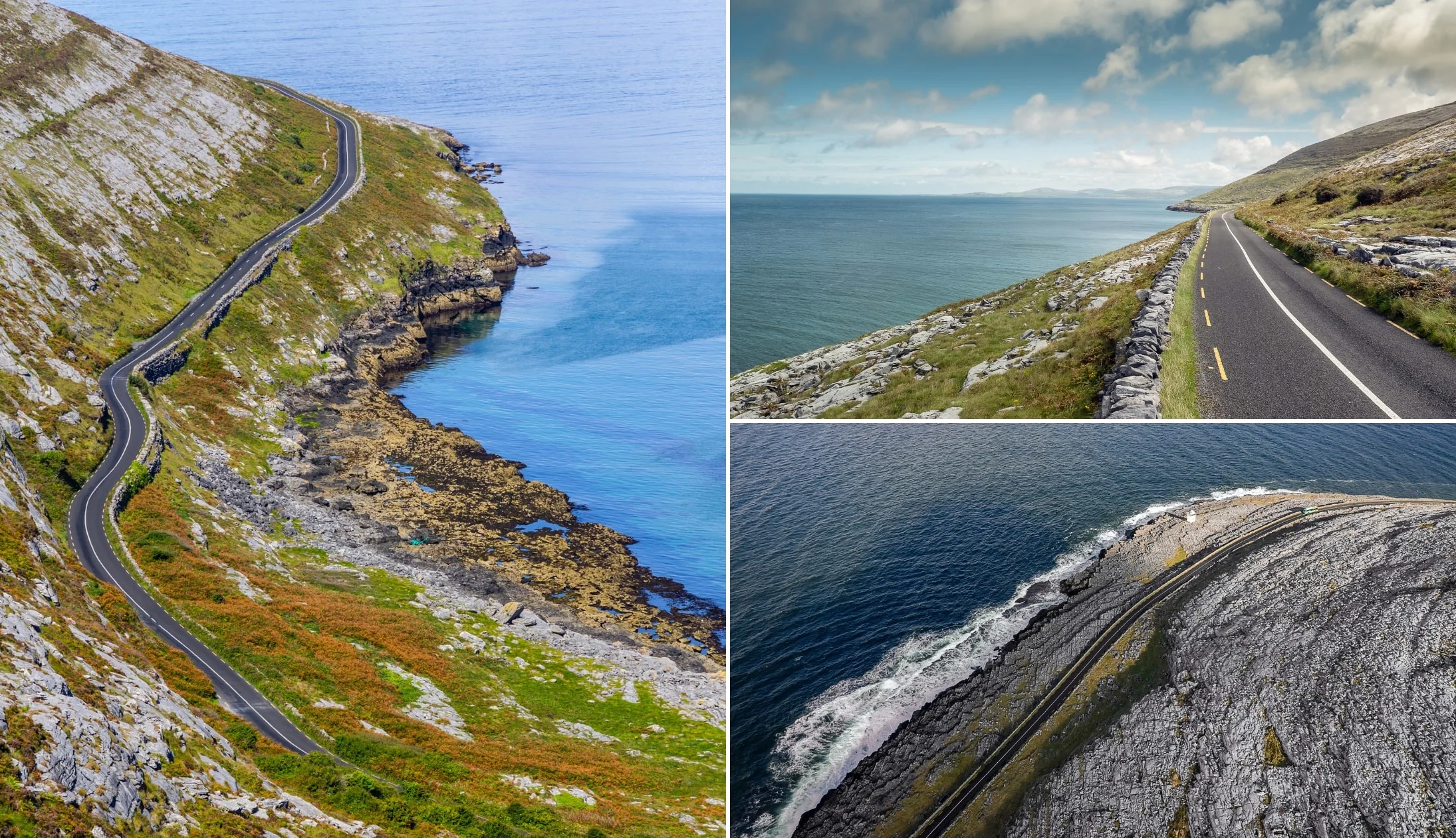
Photos via Shutterstock
During the tour, you’ll be driving right through the Burren, a gorgeous landscape characterised by huge limestone plateaus.
The Burren is what is known as a karst landscape, a distinct landform that arises when carbonate rock (such as dolomite, marble, or limestone) is slowly dissolved by water, giving the land its unique shape.
In fact, the Burren is still being shaped by the rain to this day! Karst landscapes have sinkholes, caves, and underground streams, the Burren being no exception, with huge subterranean caverns below its surface.
The Burren is one of the best examples of karst landscapes worldwide, and it has a diverse range of flora and fauna thanks to its varied landscape.
Stop 4: Doolin Pier
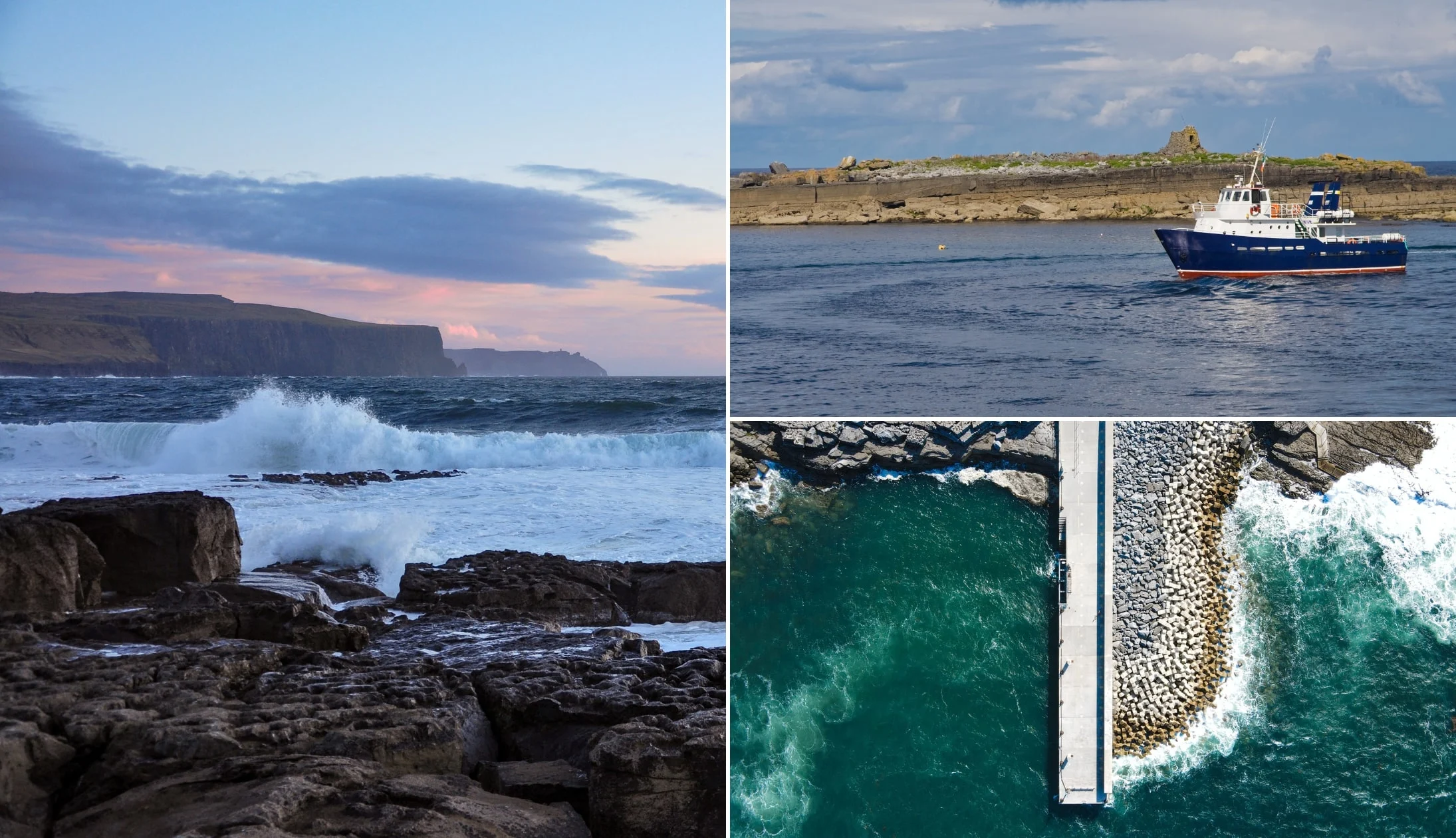
Photos via Shutterstock
You’ll then make a quick stop at Doolin Pier, the main access point to the nearby Aran Islands.
This place tends to be a hive of activity as the two ferry providers shuttle people to and from Inis Mor, Inis Oirr and Inis Meain (you’ll be visiting Inis Mor tomorrow).
Stop 5: Lunch at Hotel Doolin
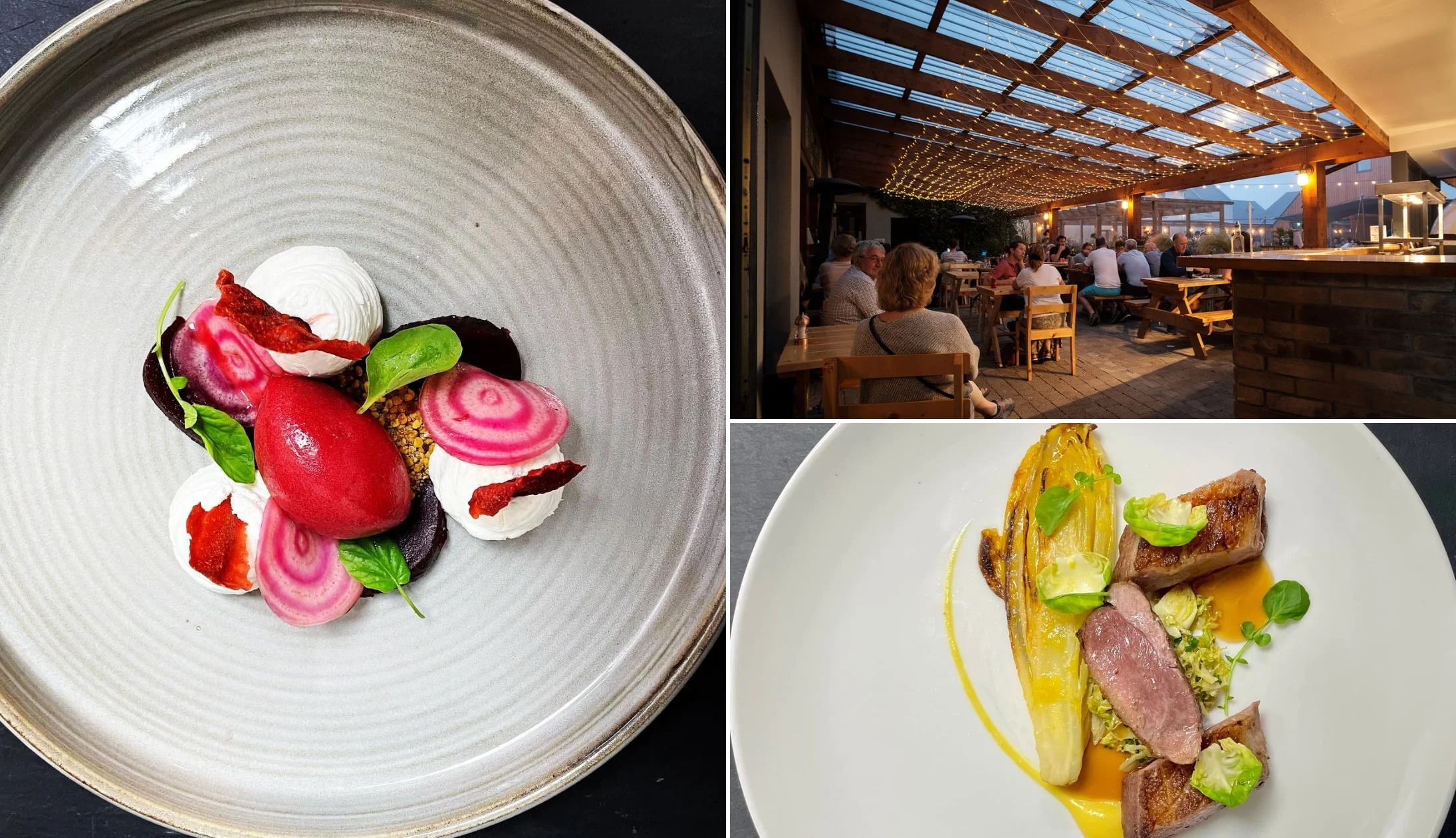
Photos via Hotel Doolin on FB
For lunch, you’ll be heading to Fitz’s Pub and Eatery, which is a part of Hotel Doolin. It’s a cosy traditional pub serving up delicious Irish food.
The Navarin-style Irish lamb stew is a huge hit, as is the sustainable all-white fish chowder. If you’re a beer drinker, make sure to try their in-house Dooliner Beer, a creamy and smooth Irish red ale.
Stop 6: The Cliffs of Moher

Photos via Shutterstock
Your next stop, the magnificent Cliffs of Moher, are one of the most popular tourist attractions in Ireland.
The cliffs are 15 minutes away from Doolin, with breathtaking views of the wild Atlantic, Galway Bay, and the Aran Islands.
There’s a visitor centre on-site, as well as 800 metres of paved walkways with viewing areas, and the historic O’Brien’s Tower.
Stop 7: Lisdoonvarna
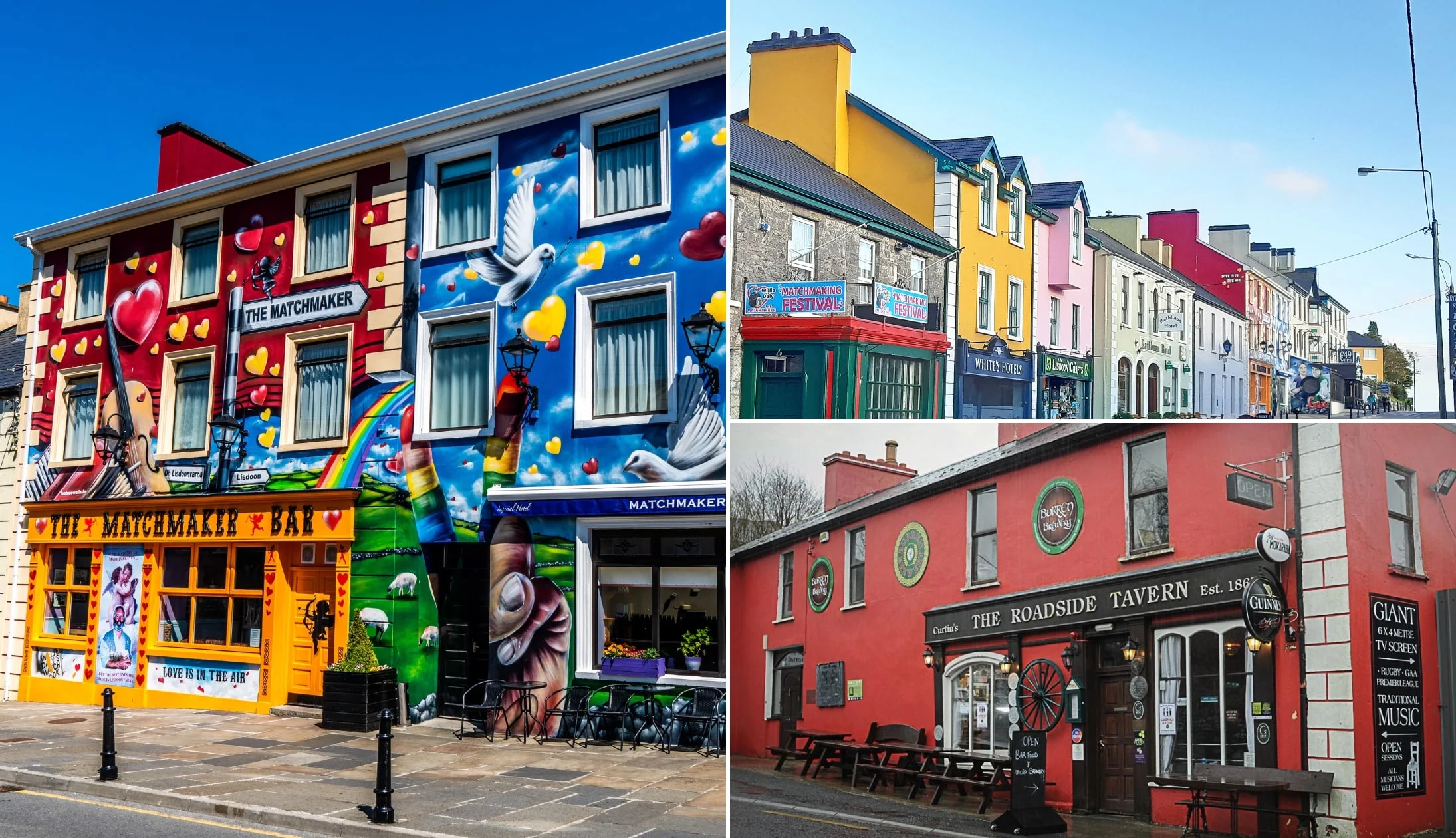
Photo left: UpSwing Mediaa. Top right: Maria Ryan Donnelly. Bottom right: Failte Ireland
Keep your eyes peeled as you pass through Lisdoonvarna, a spa town renowned for its annual matchmaking festival! The festival began in 1857, and today it attracts over 20,000 visitors from all over the globe.
Lisdoonvarna is relatively new for Irish standards (dating back to the early 19th century), but it’s still full of charm, with colourful shop fronts and traditional houses.
Stop 8: Back to Galway for the night

Photos via Blakes Bar Galway on FB
From Lisdoonvarna, it’s around one hour and 20 minutes back to Galway, so sit back and relax as you may your way back through the lovely countryside.
Our dinner recommendations
For dinner, we’ve got a few stellar recommendations: Ard Bia, The Quay Street Kitchen, and Dela. Ard Bia is absolutely fantastic, but you need to book in advance for dinner.
The restaurant has a quirky interior and serves beautifully presented modern dishes.
The Quay Street Kitchen has a great selection of vegan and vegetarian-friendly dishes, and Dela has modern Irish cuisine on the menu.
Live music and trad bars
There’s some mighty pubs in Galway. After dinner, head out for drinks at either Tigh Neachtain or The Crane. Both are traditional pubs with a great atmosphere.
Trad music is an integral part of the city, with heaps of options to choose from. Our favourite spots are Crane Bar (mentioned above) and Tigh Chóilí.
Day 5: The trip to Cork
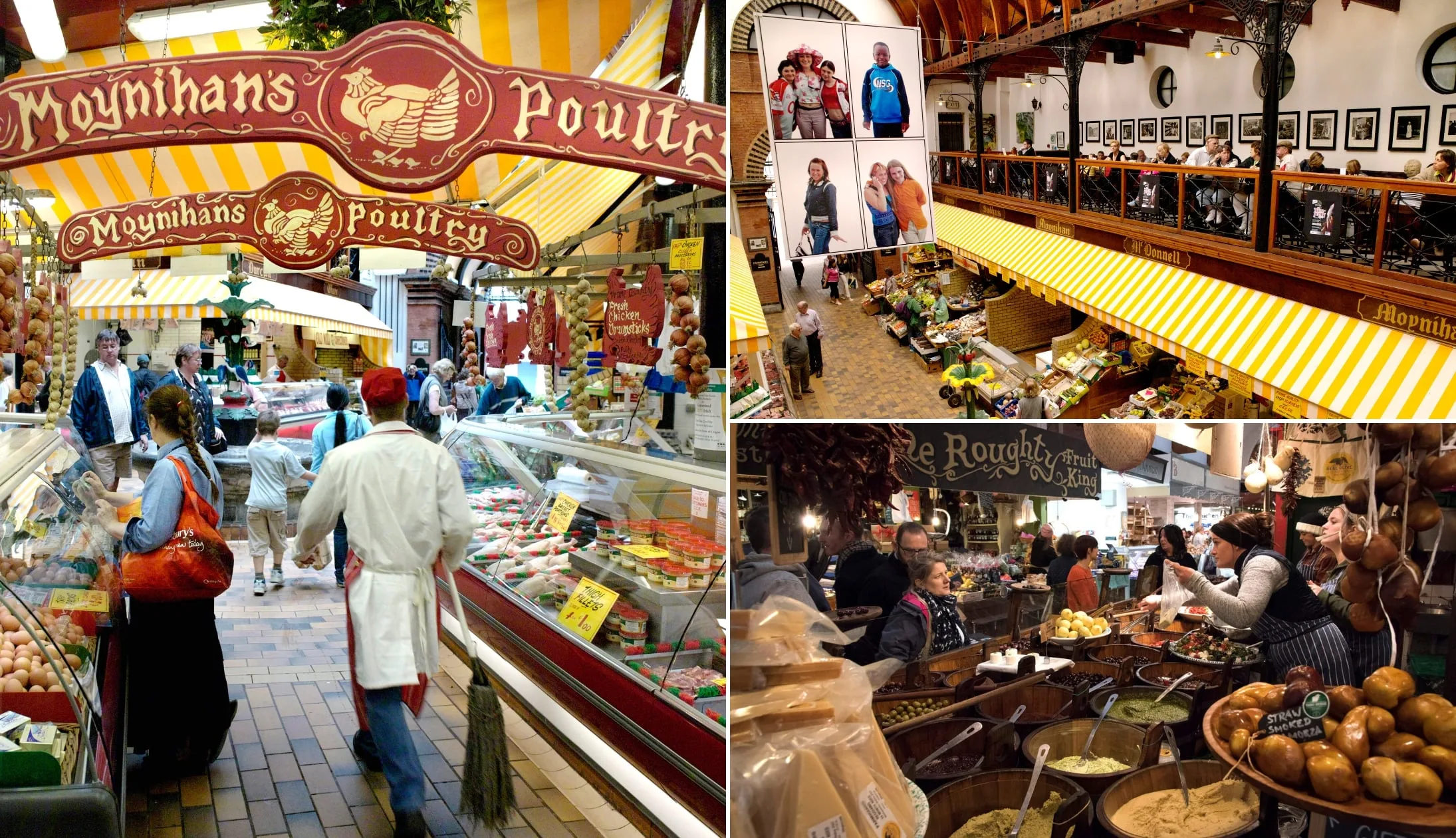
Photos by Chris Hill via Tourism Ireland
Today, you’re hopping on a bus and heading over to Cork, where you’ll be spending two nights.
Before you set off, grab some breakfast from your accommodation or somewhere nearby.
Recommended accommodation in Cork City
- Budget: Sheilas Tourist Hostel (no-fuss hostel near the train station) + Redclyffe Guesthouse (nice and central with great reviews)
- Mid-range: The Metropole (central with superb reviews) and Hotel Isaacs (in the Victorian Quarter – top-notch rooms and reviews)
- Luxury: Imperial Hotel (stunning and very central hotel) and Hayfield Manor (beautiful, boutique, city centre 5-star)
-
Stop 1: Galway Coach Station
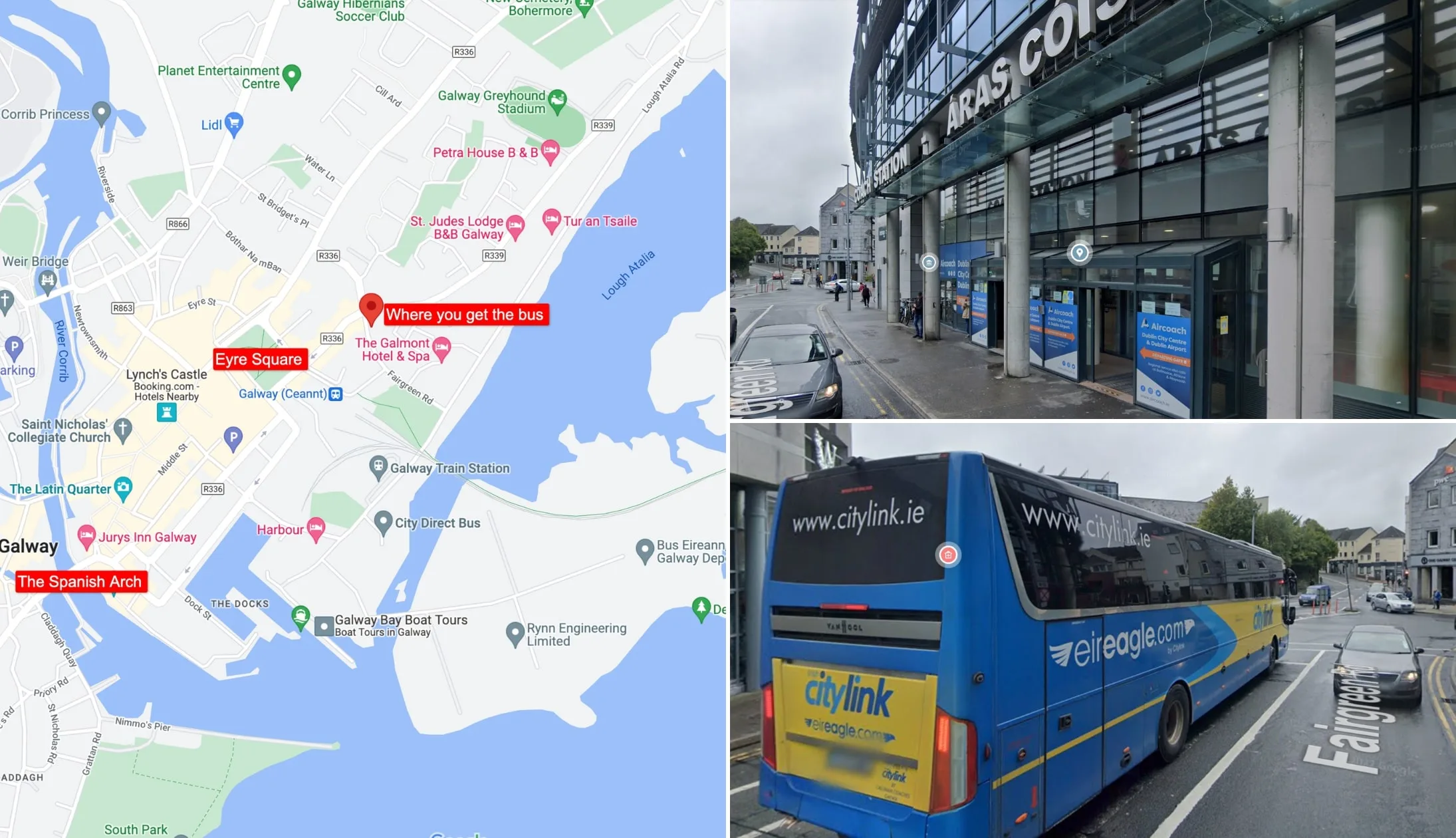
Photos via Shutterstock
The quickest and easiest way to get between Galway City and Cork City is by bus.
Both Expressway and Citylink offer a daily service.
The Citylink bus is the quickest bus between the two, it takes just under three hours.
Stop 2: Cork City
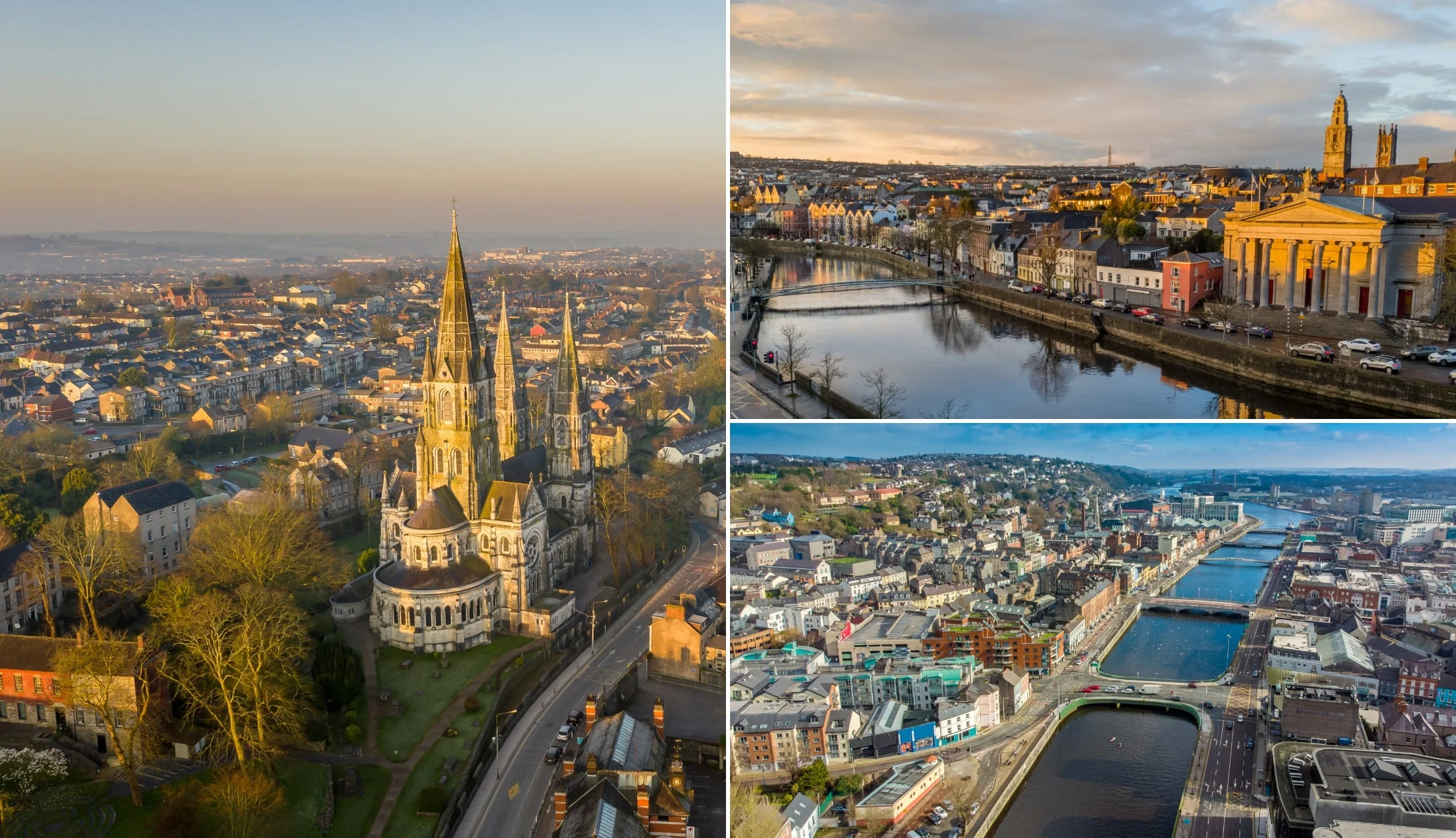
Photos via Shutterstock
Welcome to Cork City! It’s probably nearing lunchtime by now, so head over to your accommodation to check in or drop off your bags before finding somewhere to eat and exploring the city.
Stop 3: Lunch
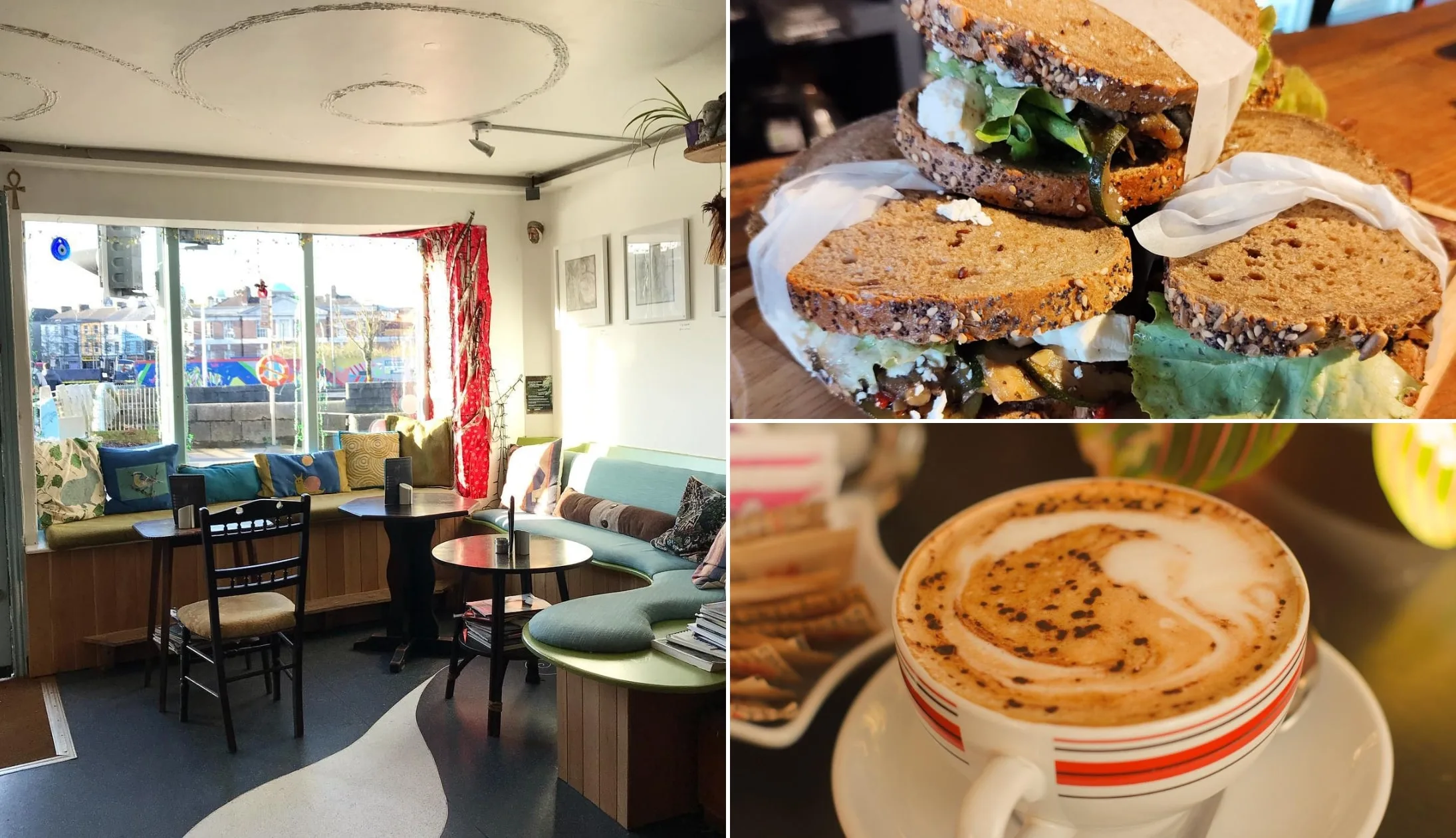
Photos via Myo Cafe on FB
Walk the short six minutes to the Cornmarket for lunch. Be mindful that one of the next stops is also a foodie destination, so don’t fill up too much! We recommend popping into Bodega for delicious pub grub, the Cornstore if you’re after something a little more upmarket, or Rising Suns if you’re craving a pizza.
Stop 4: Shandon Bell Tower
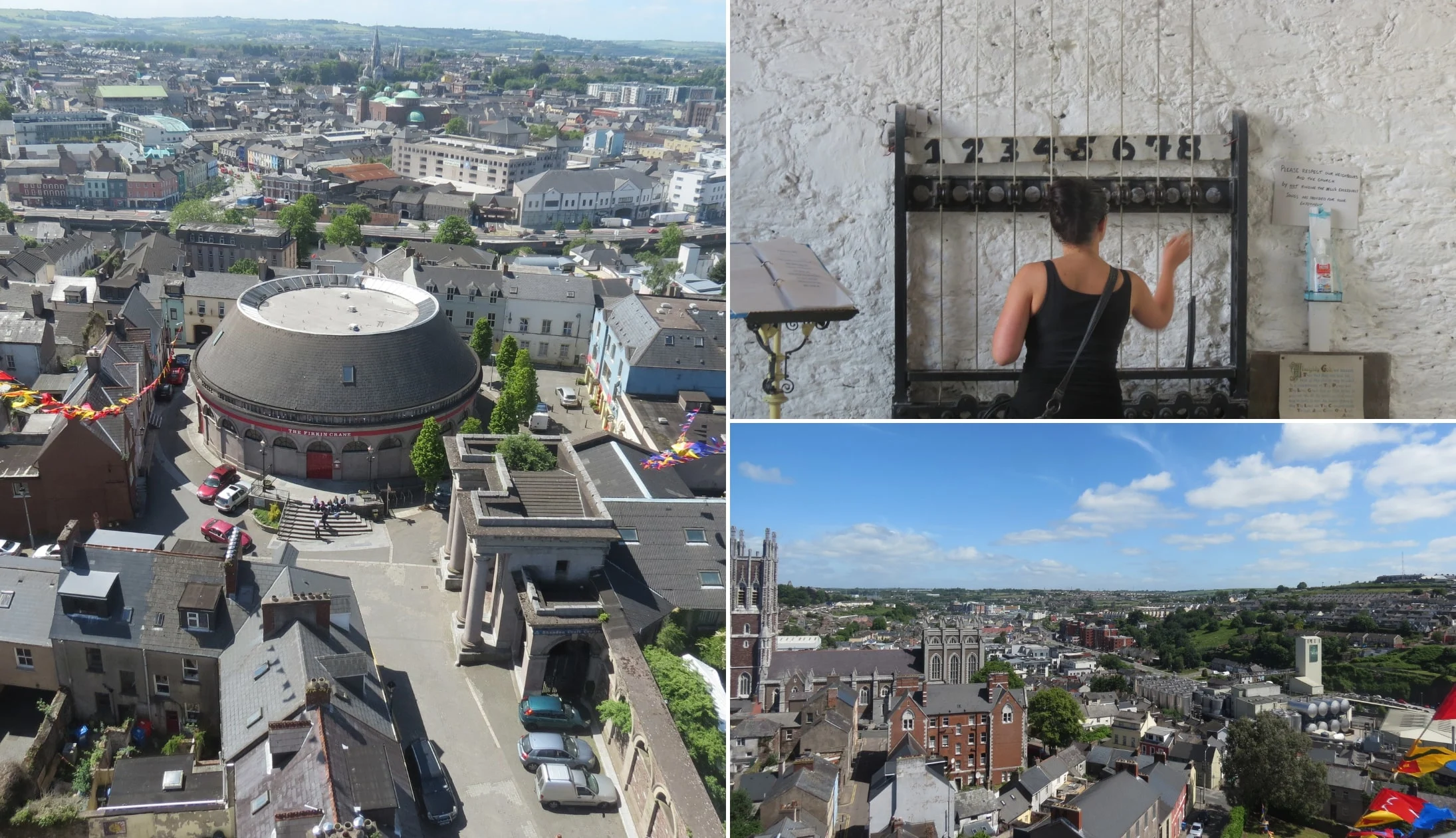
Photos courtesy Catherine Crowley via Tourism Ireland
Shandon Bell Tower is an iconic landmark in Cork City and a must-visit attraction! The tower is a part of the Church of St. Anne, which was built in 1722. The church was built to replace an old church on the same site that was destroyed during the Seige of Cork in 1690.
You’ll need to pay a small fee to get to the top of the tower, but from the top, you’ll have wonderful views of the city, and you’ll be able to ring the bells!
From the city centre, it’s around a 10-minute walk to the Shandon Bell Tower.
Stop 5: The English Market

Photos by Chris Hill via Tourism Ireland
The English Market is only 10 minutes away from the bell tower. It’s a beautiful covered market with impressive mid-19th-century architecture. Its name, “English Market”, was to help distinguish it from the Cornmarket, formerly known as the “Irish Market”.
The market dates back to 1788, making it one of the oldest covered markets in Europe. Aside from its history and beautiful architecture, the English Market is known for its delicious food, and you can get everything from artisanal olives to homemade jams.
Stop 6: Dinner, drinks and live music
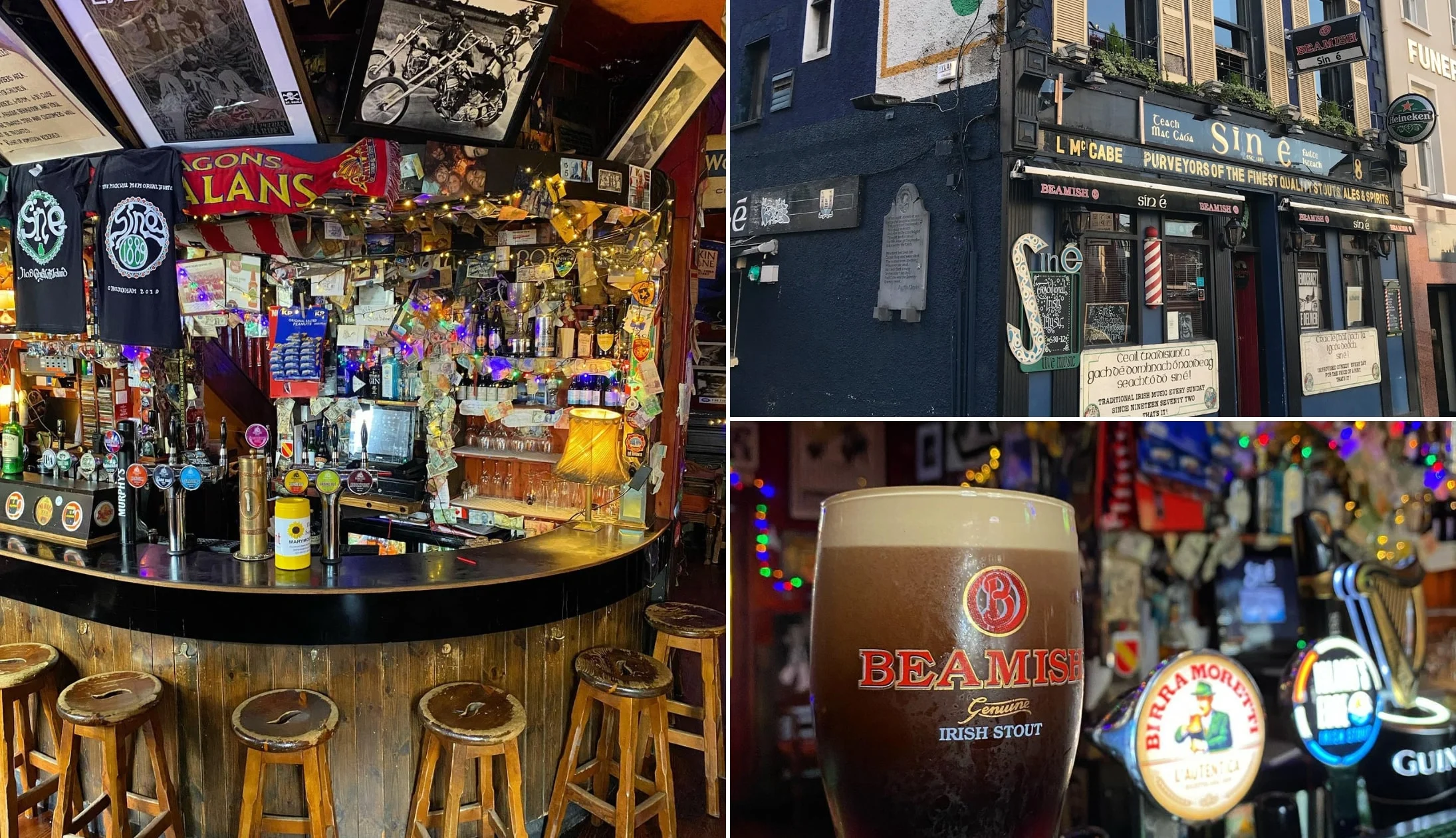
Photos via Sin E on FB
There are heaps of brilliant places to eat in Cork City, but we recommend Market Lane, Spitjack, Liberty Grill, and Orso.
Our Cork food recommendations
There are heaps of brilliant restaurants in Cork City, but our personal favourites are Market Lane, Old Town Whiskey Bar at Bodega, and Cornstore.
Market Lane has a delicious-sounding menu featuring Irish favourites like pan-fried hake with braised leeks, smoked mussels, and baby potatoes.
Head to Old Town Whiskey Bar for burgers, salads, and traditional pub grub, and Cornstore for steaks and seafood.
Great Cork City pubs
There’s some glorious pubs in Cork, too. For drinks, check out Mutton Lane (a quirky traditional pub), The Oval (a historic pub named after its unique oval ceiling), and Castle Inn (a traditional family-run pub with a great atmosphere).
There are some great spots for hearing some trad music in Cork, our top choices are Sin E and The Corner House.
Day 6: Blarney and Cobh
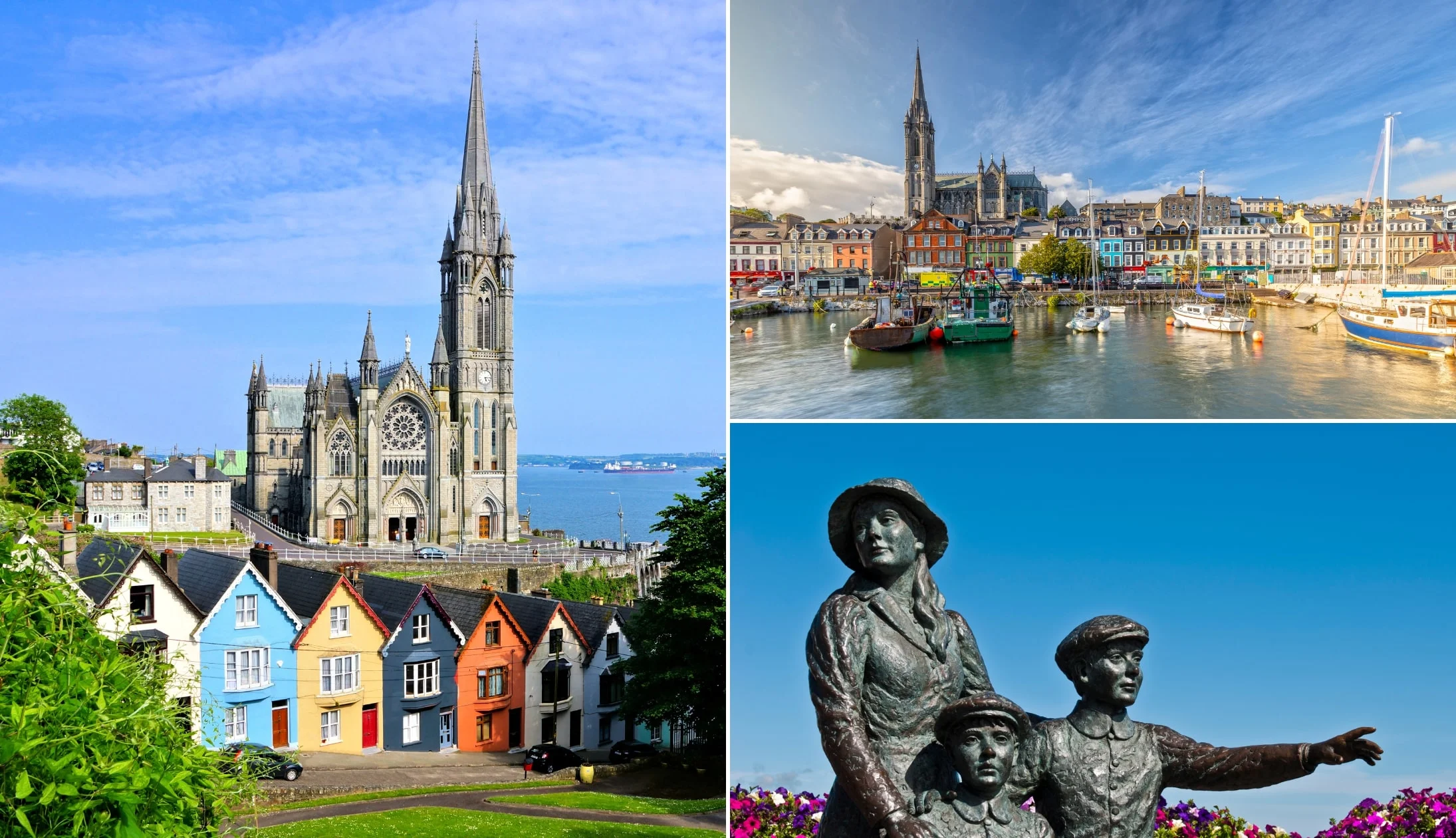
Photos via Shutterstock
Today you’re heading to Blarney and Cobh which are both just outside of Cork City. Get ready to see castles and cathedrals and to visit the Titanic’s last stop before her tragic end.
Grab a spot of breakfast in Cork before you head out for the day. We like Cafe Gusto and The Farmgate, but you could also wander around the English Market to find somewhere.
We’d recommend this 8-hour day trip that takes you to Blarney Castle and then onto the charming town of Cobh.
We’ll take you through the stops below, but note that 1, you may not always physically stop at all of these sights and 2, these tours are subject to change, so always check with the provider in advance.
Stop 1: Blarney Castle
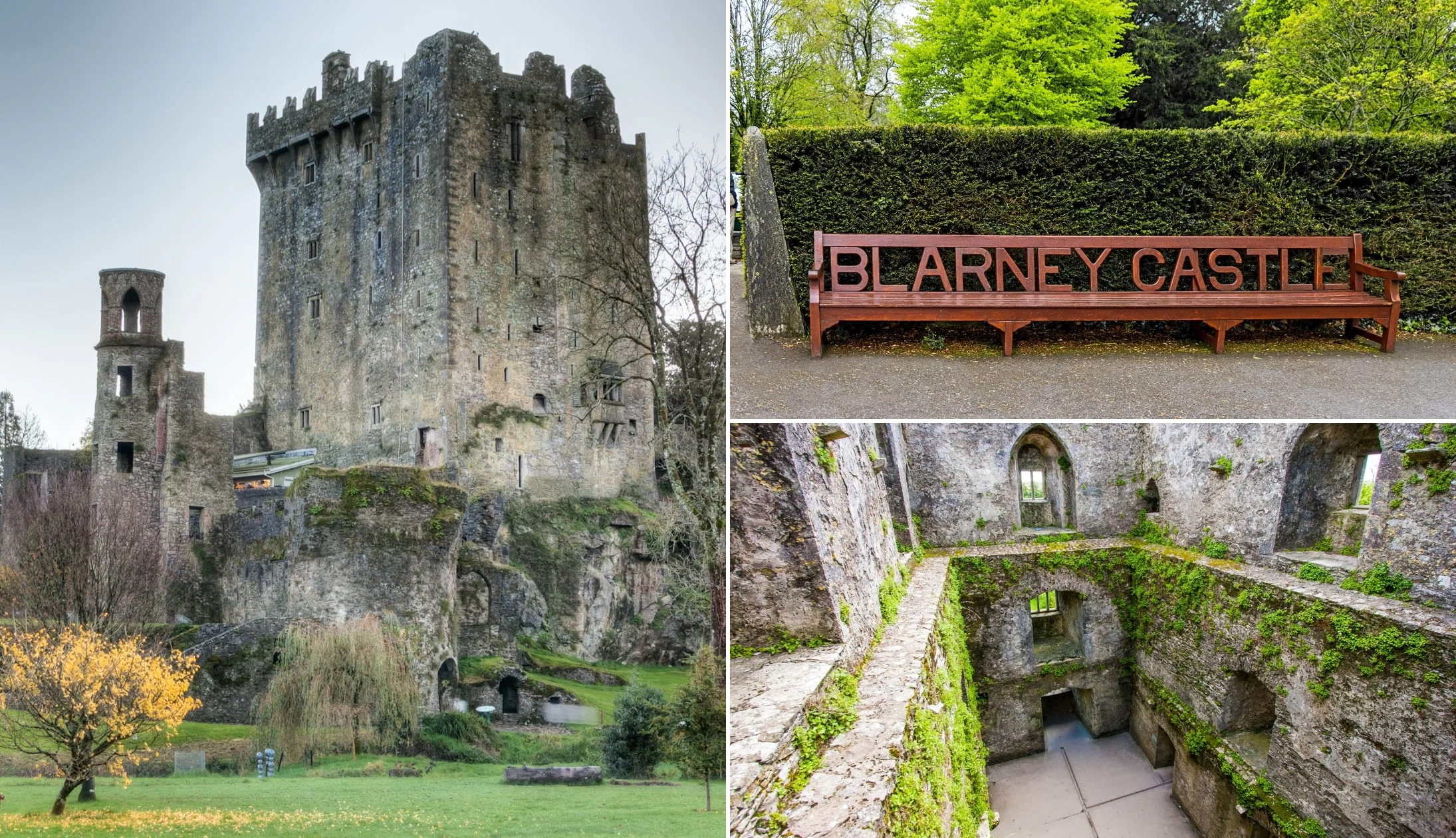
Photos via Shutterstock
Blarney Castle is one of the most famous of the many castles in Ireland. The current castle dates back to 1446, but prior to that, there was another stone castle on the site that dated back to 1210.
Blarney Castle has an interesting history and has changed hands several times.
It was besieged during the Irish Confederate Wars, seized by parliament in 1646, and confiscated in the 1690s during the Williamite War when its owner (the 4th Earl of Clancarty) was captured.
Stop 2: The Blarney Stone
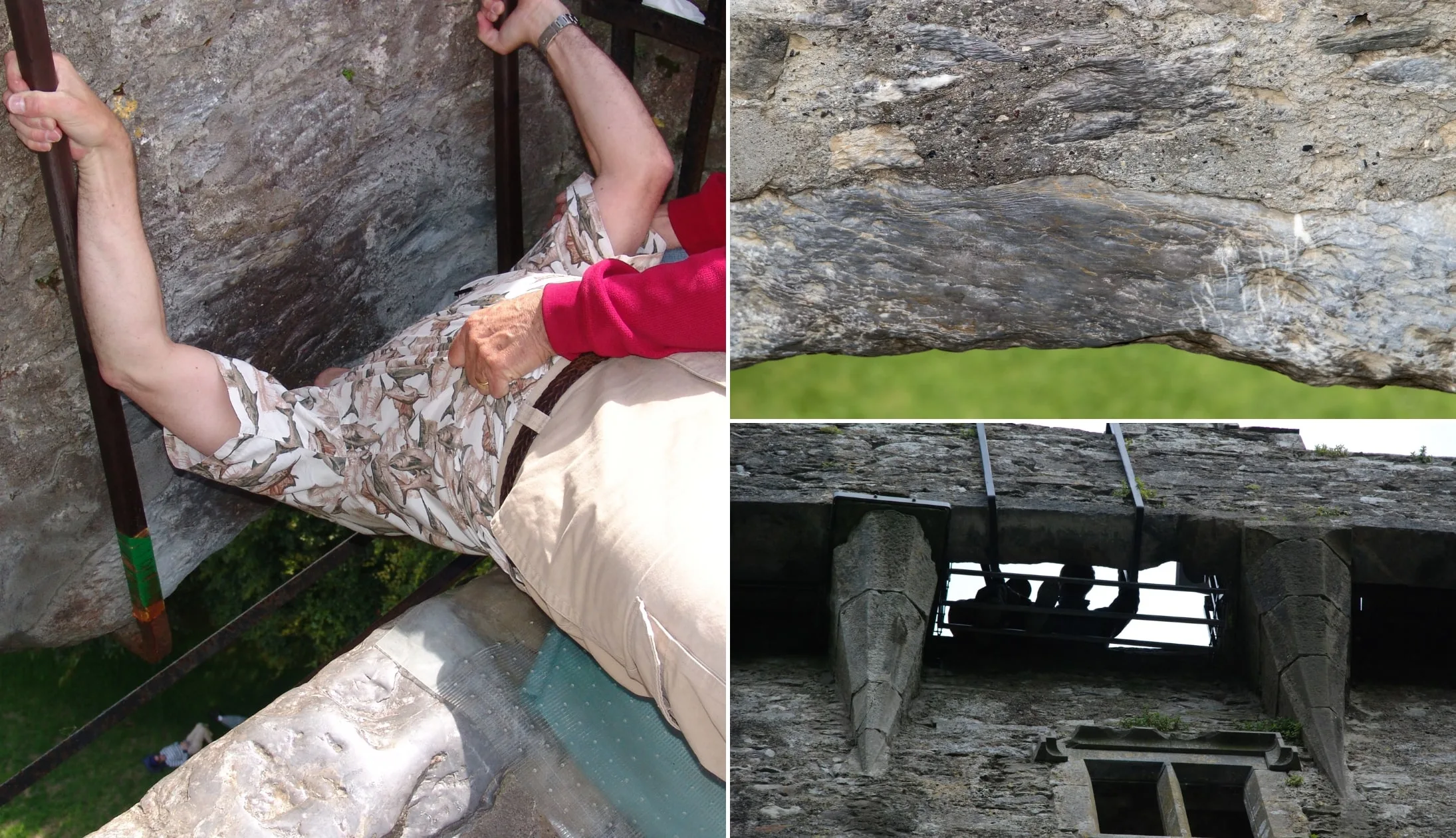
Photos via Shutterstock
The Blarney Stone is a block of grey limestone built into Blarney Castle. According to folklore, anyone who kisses the stone will be given the “gift of the gab” or the gift of flattery and eloquence.
The stone has been set into the castle walls since it was built in 1446, and it’s believed that the practice of kissing the stone dates back to the late 18th century.
Today, it’s a must-do activity in the castle, although it’s not easily achieved! To kiss the stone, you’ll need to be on your back and edge yourself closer to the stone to kiss it upside down.
There’s a large gap between the floor and the stone, but nowadays, thanks to health and safety regulations, there are metal bars to prevent you from falling if you slip through the gap.
There are several origin stories of how kissing the stone came about, from tales involving goddesses to Queen Elizabeth I, to 15th-century lawsuits.
Stop 3: Cobh

Photos via Shutterstock
Cobh is a historic coastal town in Cork City harbour that’s beautiful to stroll around regardless of the time of year.
It was the last stop of the Titanic before it departed for New York and home to St. Colman’s Cathedral.
Stop 4: St Colman’s Cathedral
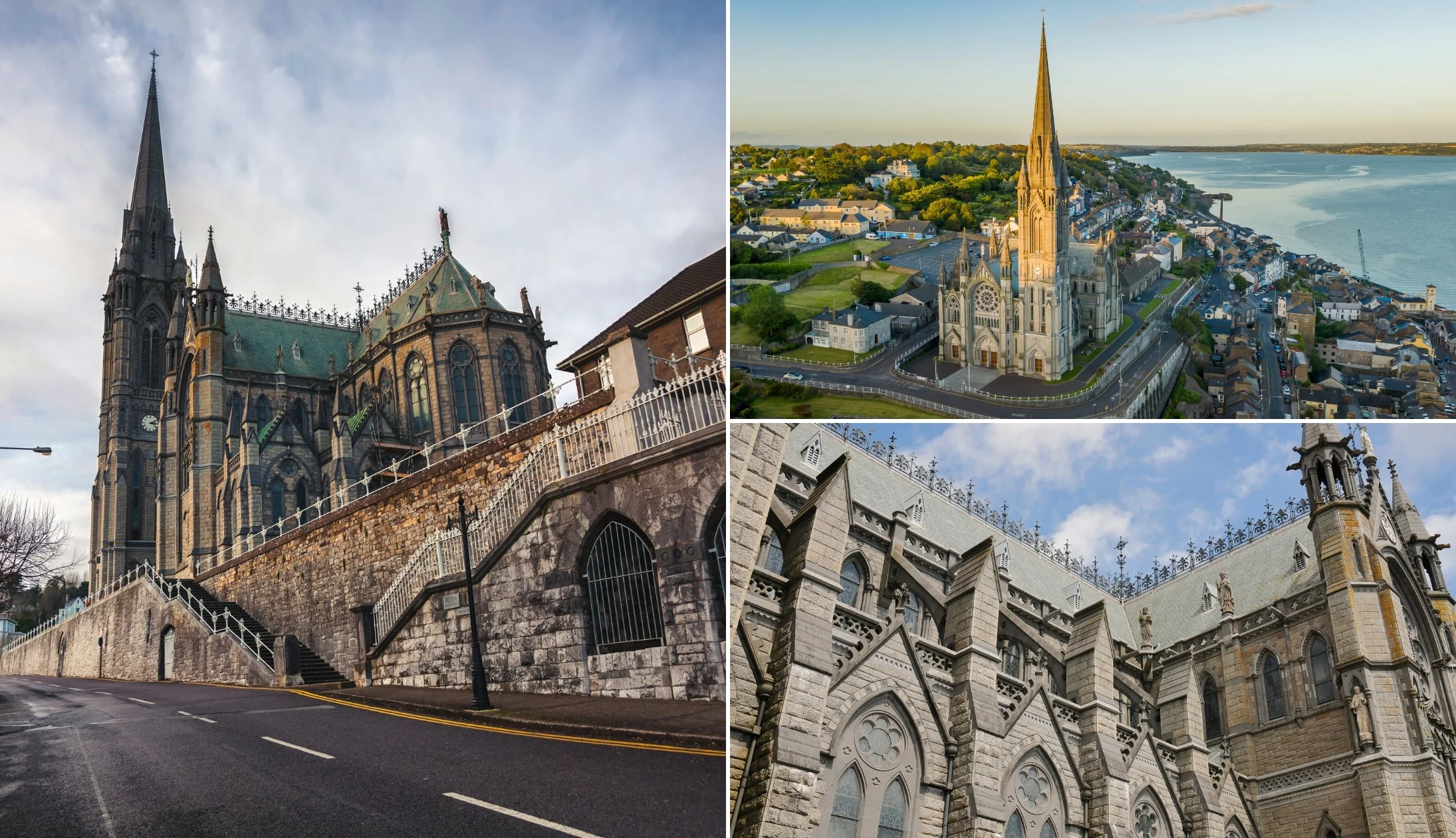
Photos via Shutterstock
Cobh Cathedral, or St. Colman’s Cathedral, is one of Cobh’s iconic landmarks. It’s a gorgeous cathedral with large stained-glass windows, intricate carvings, and an impressive 90-metre spire that dominates the town’s skyline.
It took 51 years from the first cornerstone being laid to the cathedral’s consecration. Building the cathedral was a mammoth project and cost well over the initial budget.
It’s just as beautiful on the inside as it is from the outside, with large stone arches, pillars, and red marble shrines.
The cathedral is on top of a hill, so you’ll have great views over Cork Harbour.
Stop 5: Titanic Experience
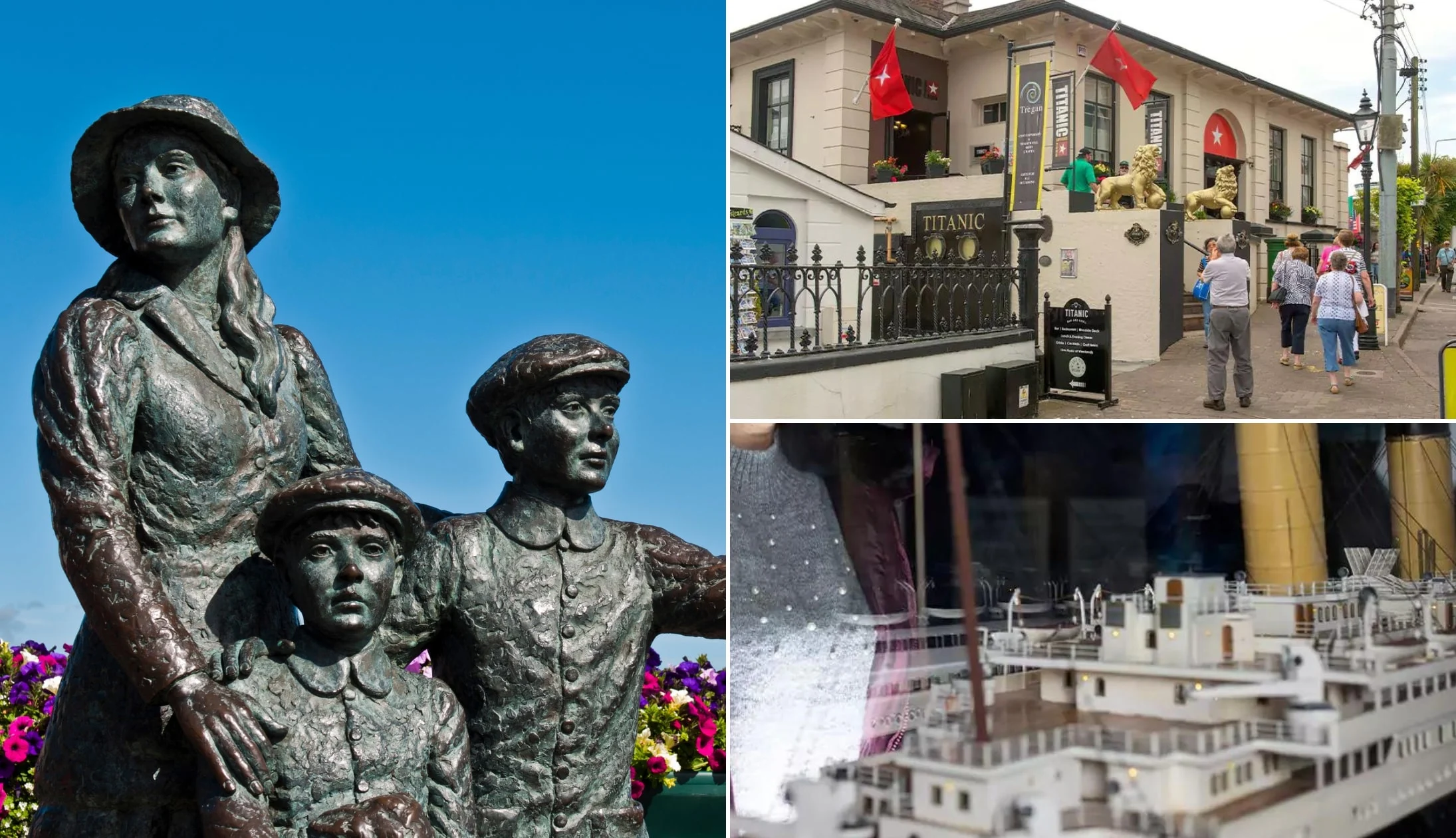
Photo left: Shutterstock. Others: Via Titanic Experience Cobh
The Titanic Experience gives visitors an immersive insight into what life was like aboard the Titanic.
It includes a 30-minute tour where you’ll experience an incredible cinematographic experience of the ship sinking.
Aside from the tour, the experience has several exhibitions telling the personal stories of the passengers, the role of the RMS Carpathia in rescuing survivors, and much more.
Stop 6: Back to Cork for the night

Photos via Sin E on FB
After the day’s activities are finished, it’s time to head back to Cork for your final night.
Our Cork food recommendations
There are heaps of brilliant restaurants in Cork City, but our personal favourites are Market Lane, Old Town Whiskey Bar at Bodega, and Cornstore.
Market Lane has a delicious-sounding menu featuring Irish favourites like pan-fried hake with braised leeks, smoked mussels, and baby potatoes.
Head to Old Town Whiskey Bar for burgers, salads, and traditional pub grub, and Cornstore for steaks and seafood.
Great Cork City pubs
There’s some glorious pubs in Cork, too. For drinks, check out Mutton Lane (a quirky traditional pub), The Oval (a historic pub named after its unique oval ceiling), and Castle Inn (a traditional family-run pub with a great atmosphere).
There are some great spots for hearing some trad music in Cork, our top choices are Sin E and The Corner House.
Day 7: The trip to Waterford
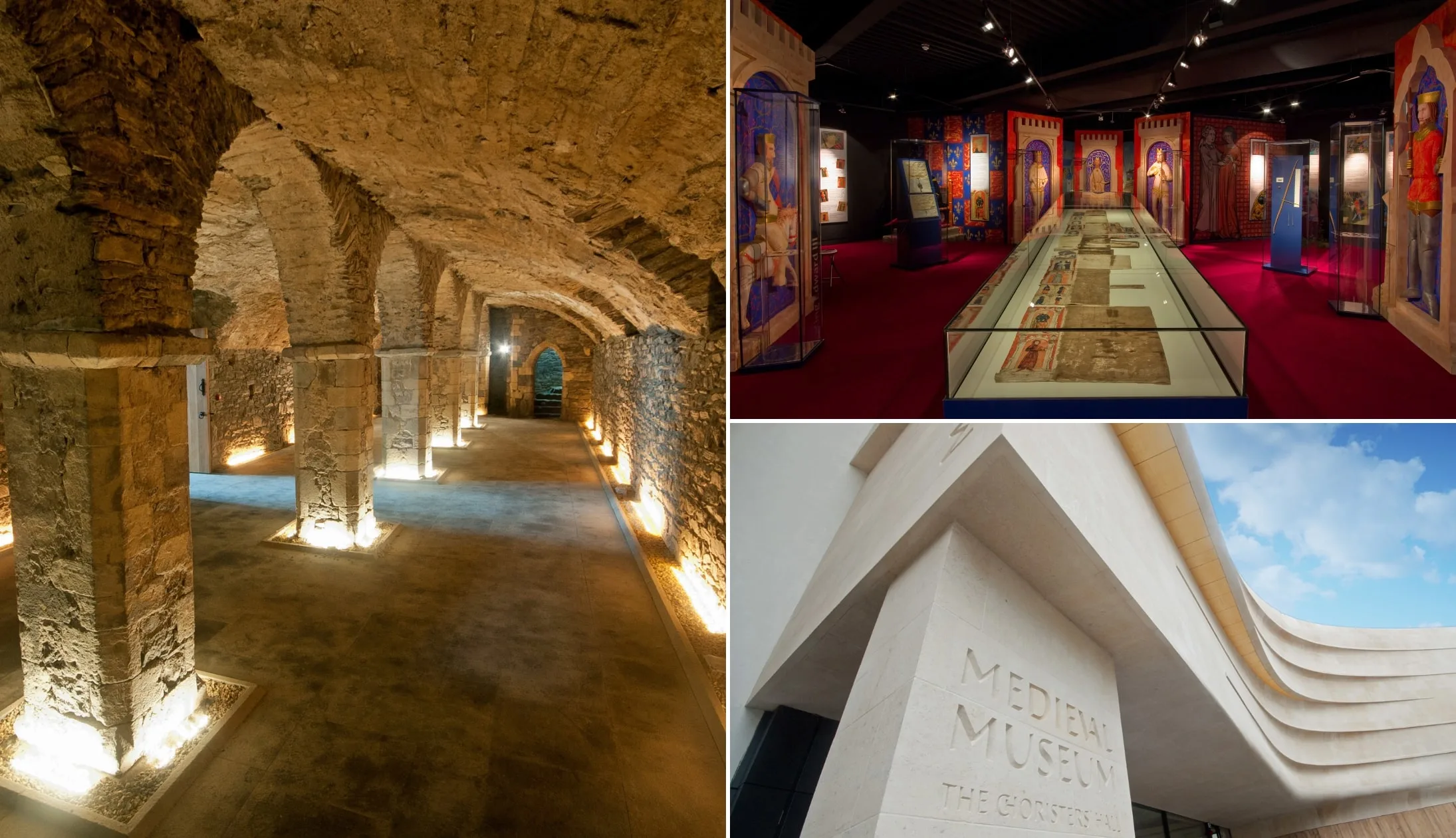
Photos courtesy Waterford Museum of Treasures via Failte Ireland
It’s time to pack your things and check out of your accommodation in Cork, as today you’re heading to Waterford City, the oldest city in Ireland. You’ll spend your final two nights here before heading back to Rosslare to catch the ferry home.
Grab some breakfast at your accommodation or nearby. Alchemy Coffee on Barrack Street does great coffee and pastries, which are perfect for bringing on the journey!
Recommended accommodation in/near Waterford City
- Budget: The Vee B&B (cheap and cheerful and a 20-minute walk from main attractions) and Diamond Hill Country House (20-minute drive from city with great reviews)
- Mid-range: Granville Hotel (cosy and super central in the city) and Tower Hotel & Leisure Centre (great views and right in the city)
- Luxury: Faithlegg Hotel (stunning hotel 20-minute drive from city)
Stop 1: Travel to Waterford City
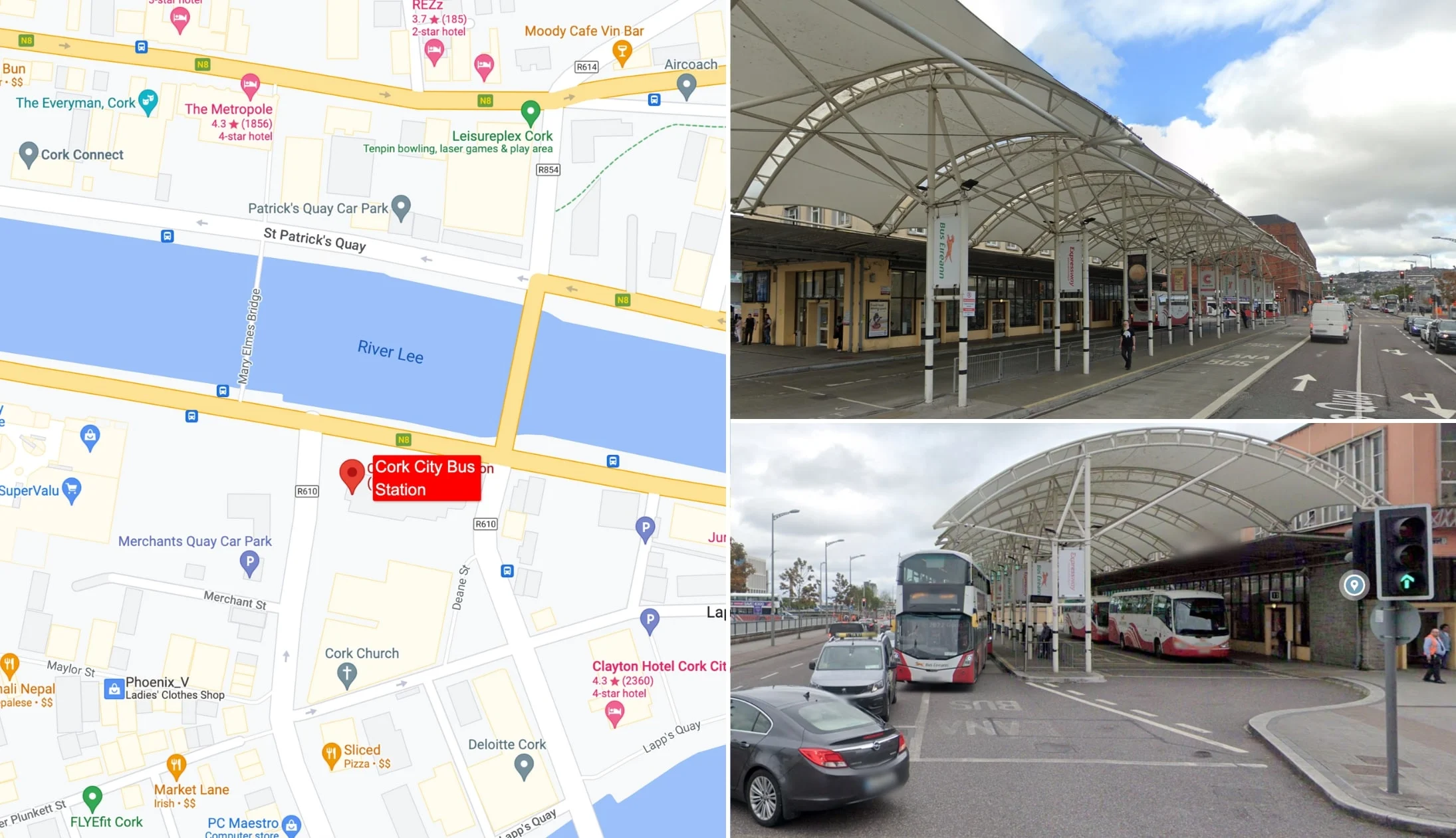
Photos via Google Maps
You have two options for getting to Waterford from Cork – the bus or train. The bus is the most straightforward and what we would personally take, but, we’ll outline both options below for you.
As always, we strongly recommend booking your tickets a few days in advance:
Option 1: Bus
We’d recommend getting the Expressway bus from the bus station at Parnell Place (pictured above). It takes just over 2 hours in total.
Option 2: Train
You can also get a train between the two. Just note that you may need to change trains multiple times at Mallow or at Limerick Junction, or both.
Stop 2: King of the Vikings
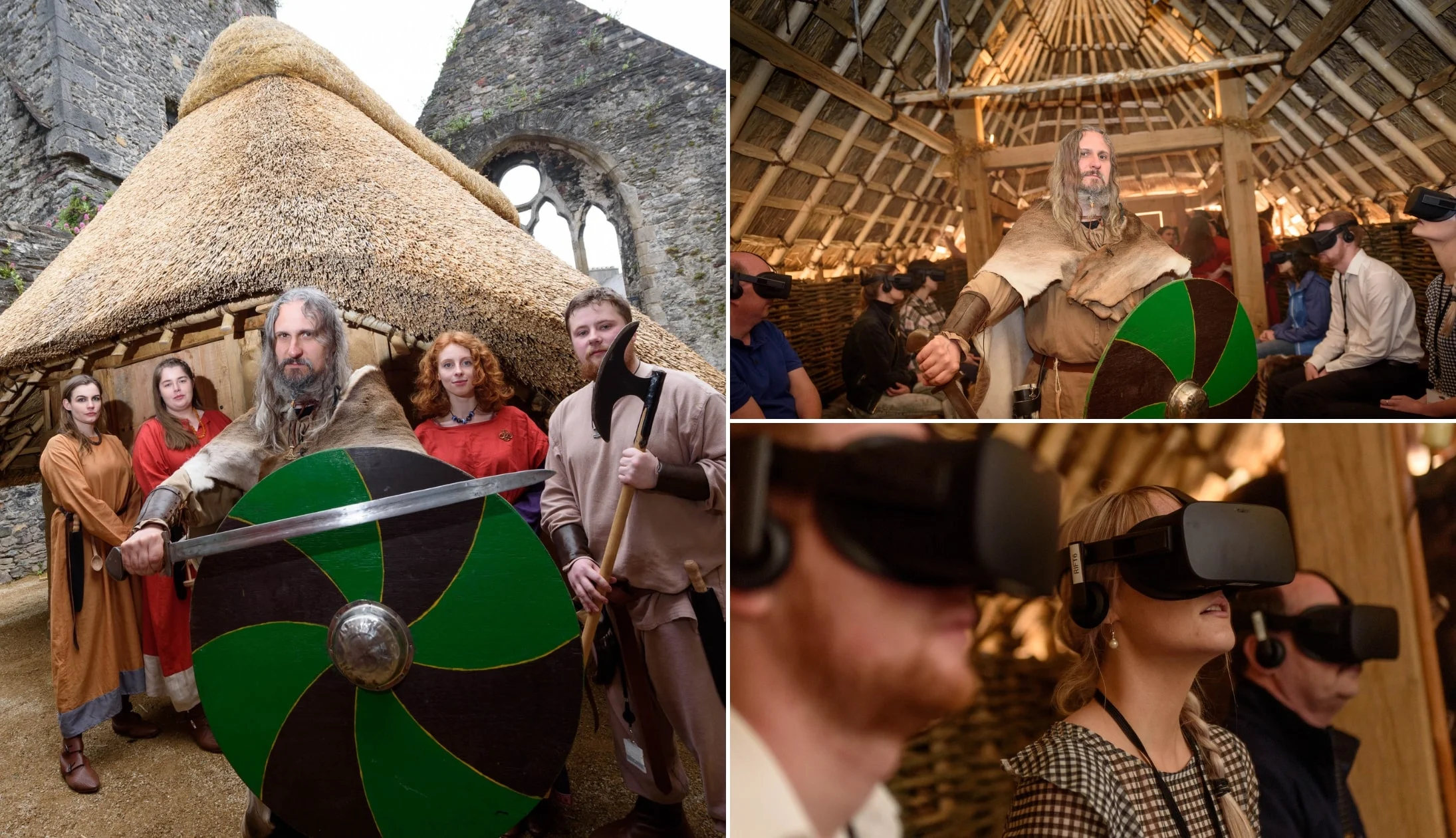
Photos by Peter Grogan_Emagine via Failte Ireland
As we mentioned earlier, Waterford is the oldest city in Ireland, dating back as far as 914 A.D., when it was originally a Viking settlement. King of the Vikings is a really cool virtual reality experience that shows visitors what the city would have been like when it was inhabited by Vikings.
You’ll find it inside the Viking Triangle, on the south bank of the Suir River, which was named after the 1,000-year-old Viking walls that used to surround the area. The experience takes place inside a reconstructed Viking house that sits in the centre of 13th-century Franciscan Friary ruins. The virtual reality experience lasts for 30 minutes, and since it’s only a small space with enough room for 10 people only, pre-booking is advised.
Stop 3: Reginald’s Tower
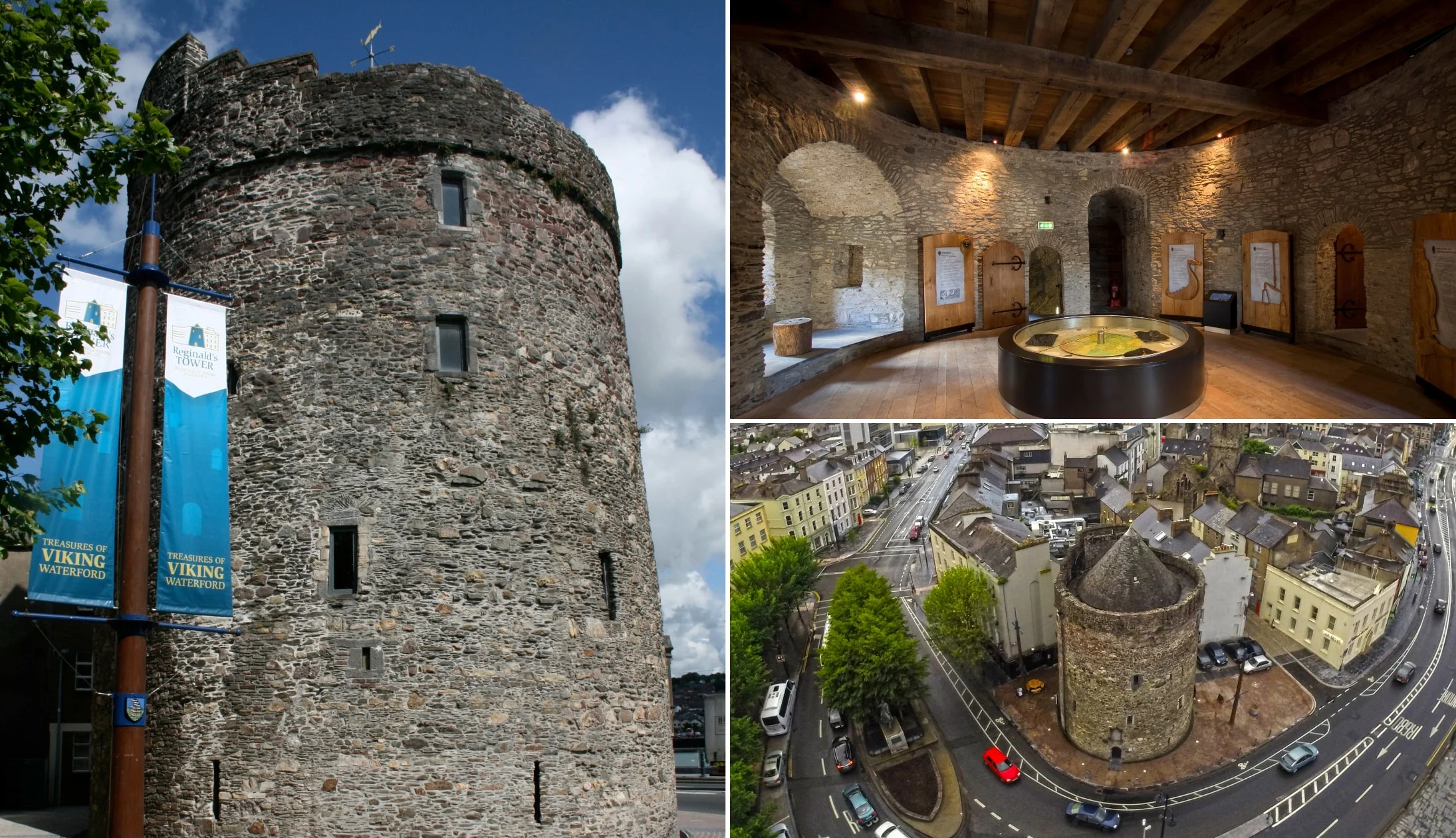
Photos courtesy Waterford Museum of Treasures via Failte Ireland
Your next stop, Reginald’s Tower, is only a three-minute walk down the road from the King of the Vikings. The tower is the oldest civic building in the country and has been in continuous use for over 800 years!
Originally, a wooden Viking fort stood on the site, but later on, the Anglo-Normans replaced it with the impressive stone tower. The tower was part of ancient Waterford and is thought to be one of the points of the Viking Triangle, alongside Turgesius Tower and St. Martins Castle.
Inside, you’ll find a part of the Waterford Museum of Treasures, which focuses primarily on Waterford’s Viking heritage (you’ll be visiting the other parts later!).
Stop 4: Lunch
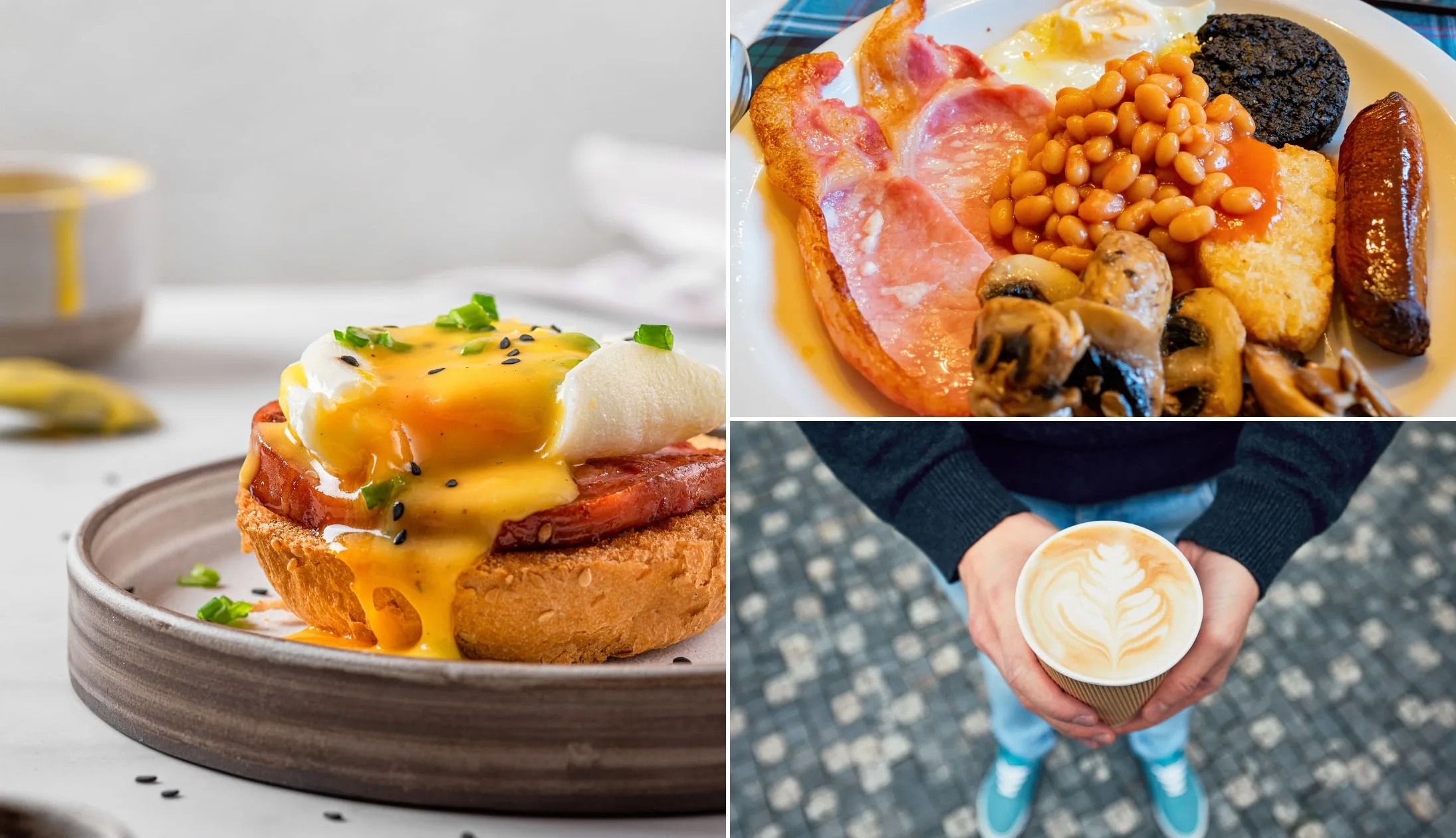
Photos via Shutterstock
It’s probably around lunchtime now, so grab a bite to eat somewhere in the city. We suggest checking out The Granary or McLeary’s Restaurant.
The Granary is a charming quay-side cafe offering homemade light bites such as quiches, salads, and sandwiches. McLeary’s Restaurant (not to be confused with McLeary’s Cafe, although this is another lovely spot a 15-minute walk from the Viking Triangle), is a good choice if you’re looking for a late lunch. They open at 1pm, offering Irish dishes like slow-roast lamb shank and fish and chips.
Stop 5: Waterford Treasures: Medieval Museum

Photos courtesy Waterford Museum of Treasures via Failte Ireland
It’s time to visit another branch of the Waterford Treasures Museum, which is just a short walk from your previous stops. The Medieval Museum is the only purpose-built Medieval museum in the country, with a focus on the Medieval heritage of Waterford.
It’s an interesting museum with a great collection and some really good exhibits. Inside, you’ll find the oldest wine vault in Ireland, the only surviving full set of Medieval vestments in Europe, and the earliest gold ring brooch in Europe.
If you are a big museum fan, then it’s worth purchasing the Freedom of Waterford Value Pass, which gives access to five attractions within Waterford’s Viking Triangle. You can purchase it online here.
Stop 6: Waterford Treasures: The Bishop’s Palace
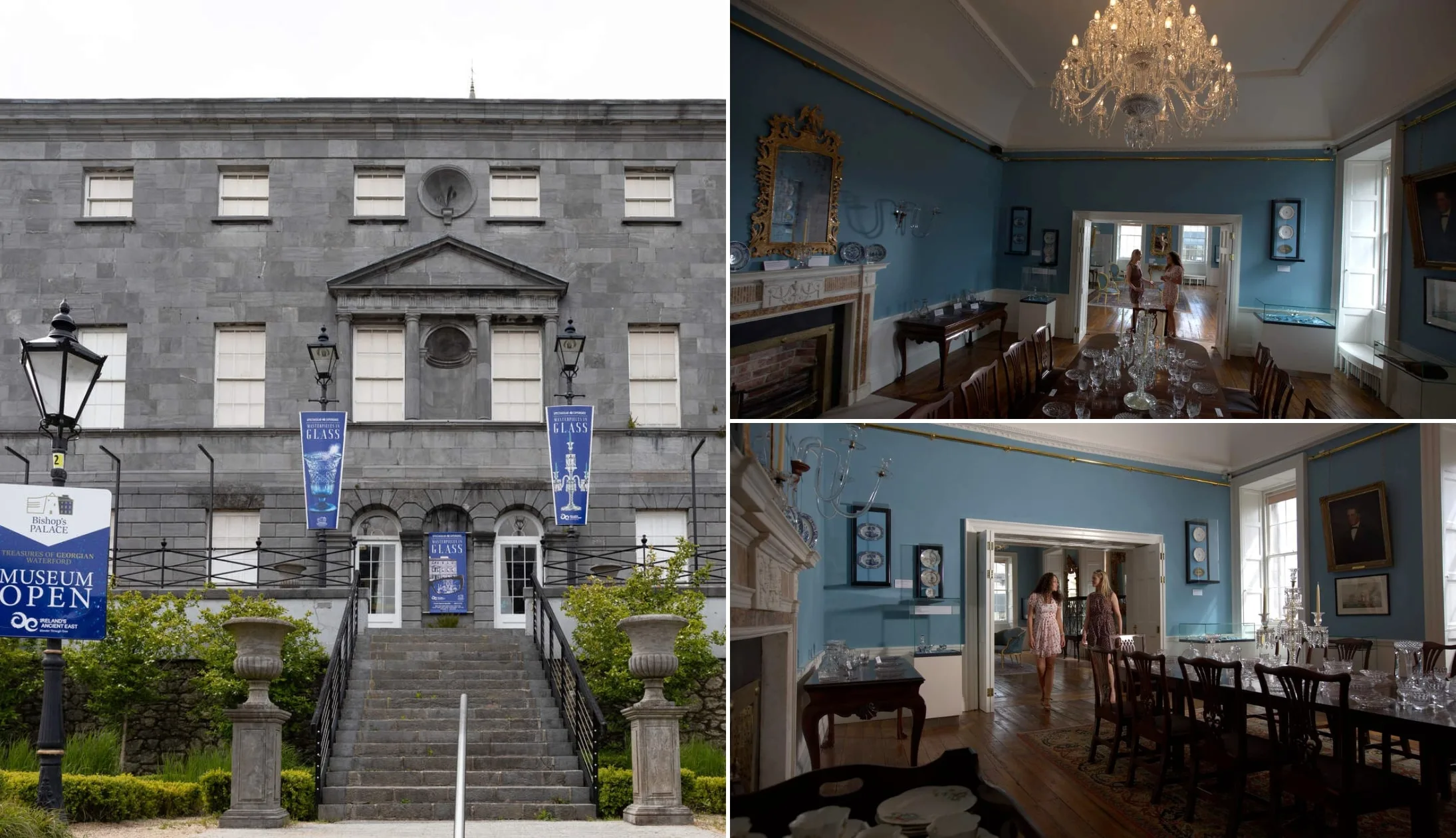
Photo left: Joseph Carr. Others: Keith Fitzgerald/George Munday
Your final sightseeing stop of the day is the final Waterford Treasures museum, The Bishop’s Palace. This museum is a short three-minute walk from the Medieval Museum and well worth a visit.
It’s a cool museum set inside a magnificent 18th-century townhouse, with guided tours led by guides in historical costume! The historic home is decorated with period decor, showcasing 18th-century furniture, glass, art, and silverware. A highlight of the collection is the Penrose Decanter, the oldest piece of Waterford Crystal in the world, dating back to 1789.
Stop 7: Dinner, drinks and live music
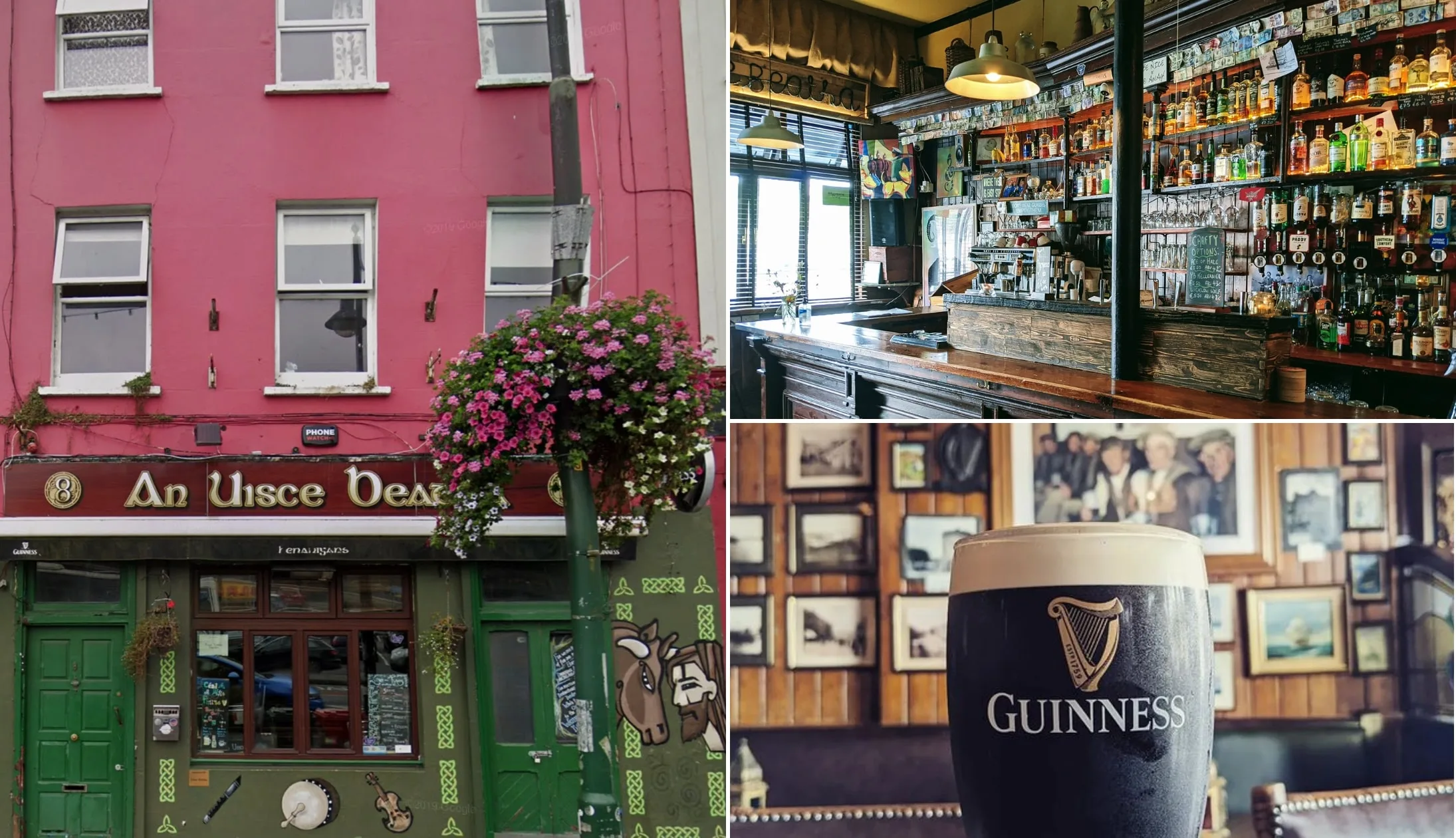
Photo left: Google Maps. Others via An Uisce Beatha on Fb
You’ve a fine evening of eating and sipping ahead of you in the ancient city of Waterford.
Here’s a couple of recommendations to get you going!
Our dinner recommendations
There’s a heap of great restaurants in Waterford. Head to Momo if you’re in the mood for an eclectic mix of international dishes, with things like Thai yellow curry and Masala cauliflower steak on the menu.
Bodega is a great choice if you’re after a casual dining experience, with some delicious Mediterranean-inspired dishes on offer.
Finally, if you’re after modern European cuisine, then we recommend enjoying dinner at Sheehan’s. You’ll find classics like burgers and steaks, as well as daily specials like chicken and chorizo pie.
Live music and trad bars
There’s some mighty pubs in Waterford. A couple of our favourites are J. & K. Walsh Victorian Spirit Grocer (a fully-preserved Victorian bar) and An Uisce Beatha (an old-school pub with a great selection of craft beers).
For live music, head to Katty Beary, Tullys Bar, and An Uisce Beatha (which we mentioned above).
Day 8: The Waterford Greenway
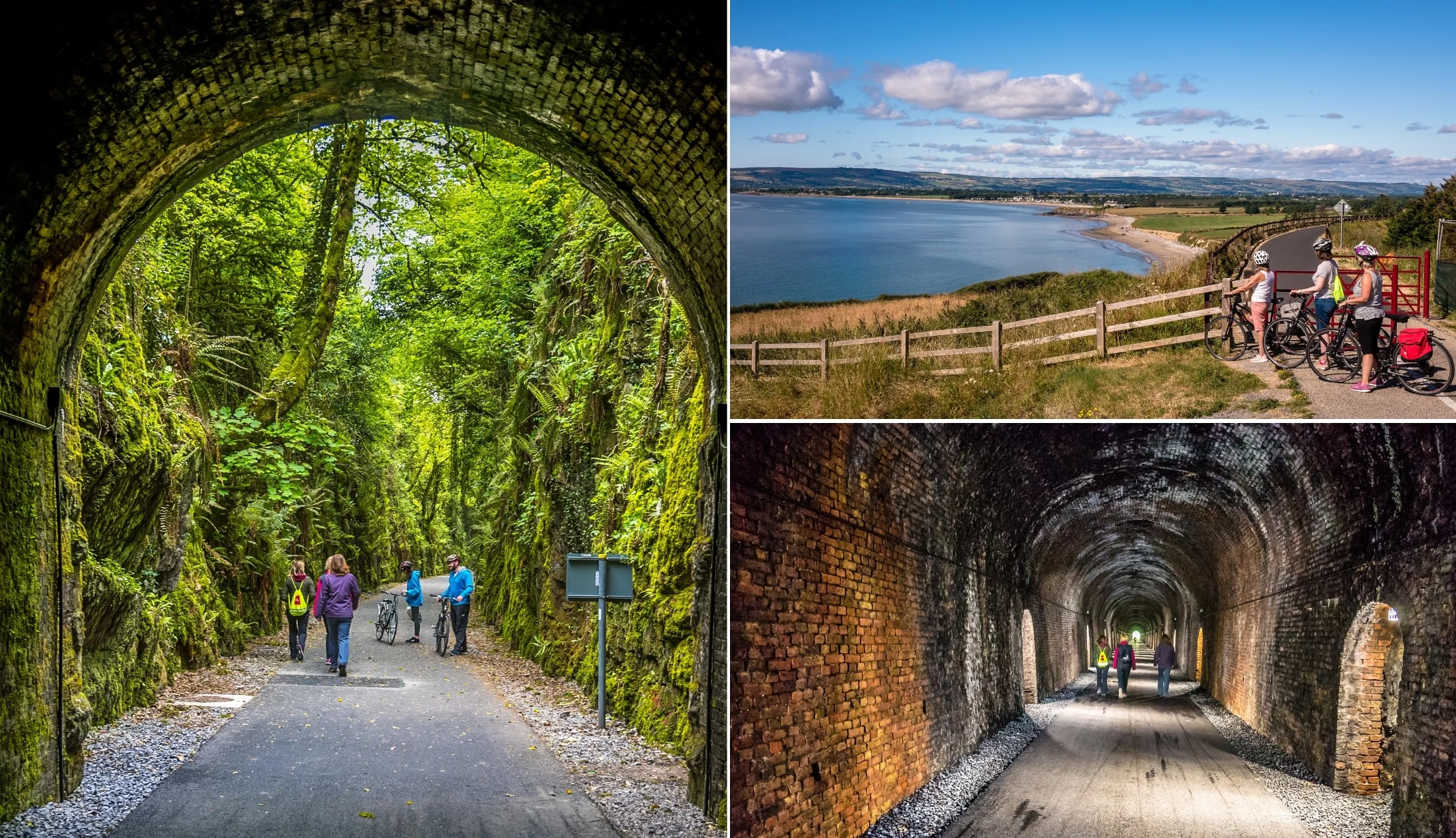
Photos courtesy Luke Myers via Failte Ireland
On your second to last day, you are going to explore the wonderful Waterford Greenway. It’s going to be an action-packed day, so make sure to pack plenty of water and snacks for your trip!
Grab a big breakfast from your accommodation or from No 9 Cafe or Cafe Lucia (a couple of our go-to breakfast spots in the city).
Stop 1: Rent a bike
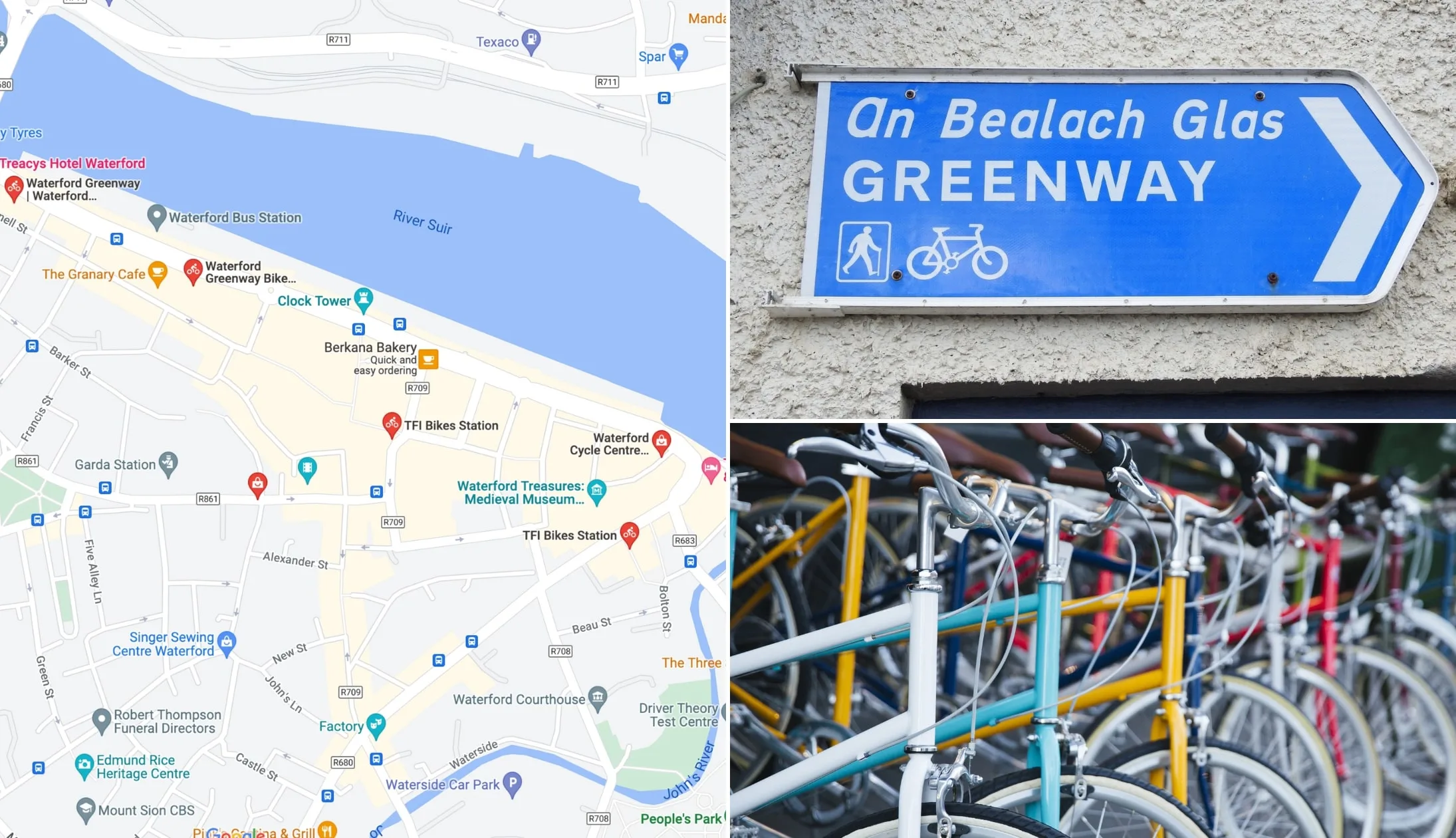
Photo left: Google Maps. Others: Shutterstock
The first step in hitting the Greenway is hiring a bike! We like Greenway Waterford Bike Hire on Hanover Street, which is where you’ll be essentially starting and ending the day’s cycle.
Today, you will be cycling a grand total of 48km. If this seems a little daunting, just bear in mind that the Greenway is a straight track and this will be a there-and-back cycle, so you can always just turn back around whenever you’ve had enough.
Stop 2: Killoteran
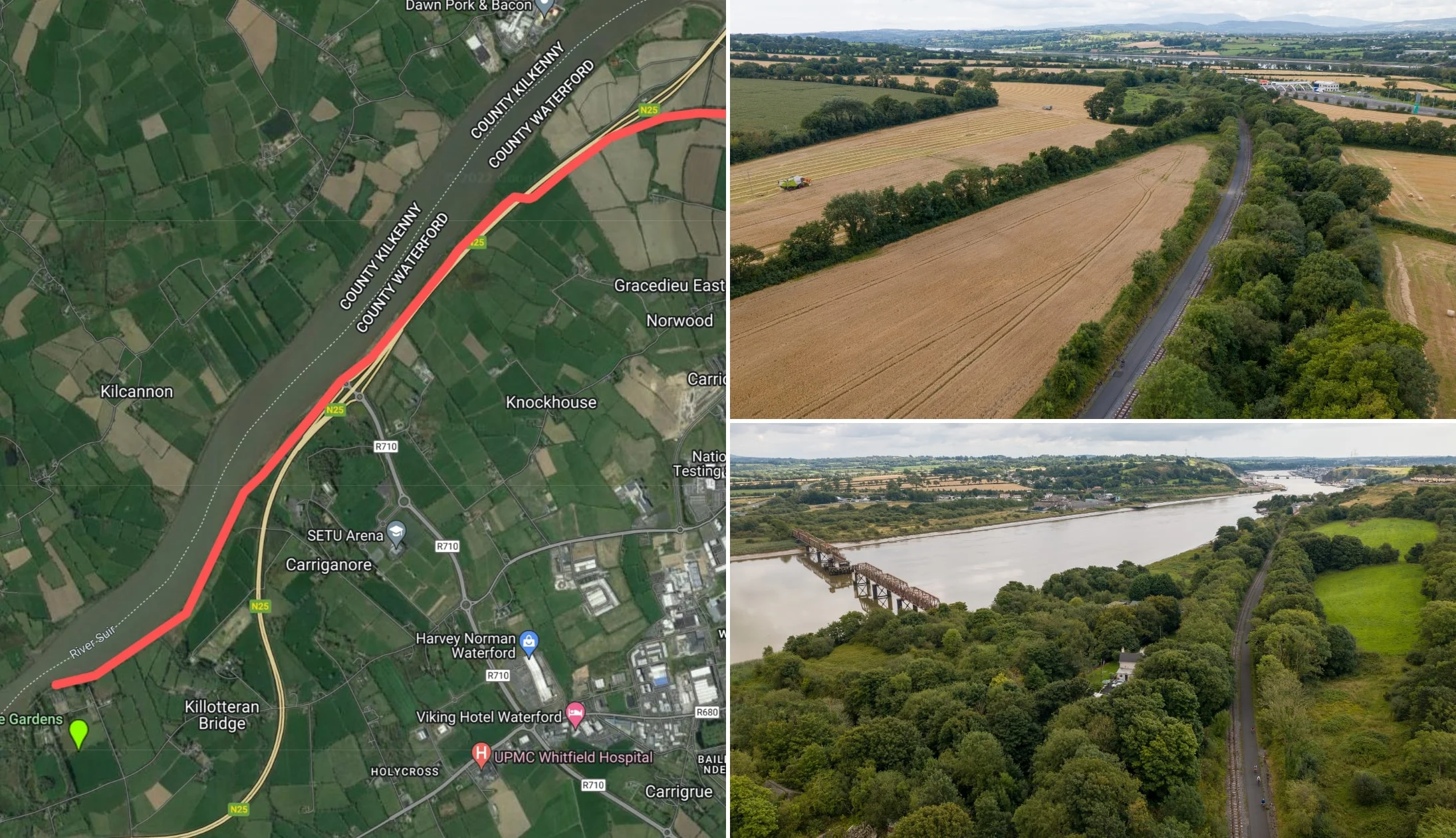
Photo left: Google Maps. Others: Shutterstock
The first leg of the journey starts at Grattan Quay in the city and follows along the River Suir. It’s a 7.5km stretch that passes by Woodstown, the remains of an 8th-century Viking settlement (you’ll have seen some artefacts recovered there yesterday at Reginald’s tower!) and the Waterford Institute of Technology campus.
Stop 3: Kilmeaden
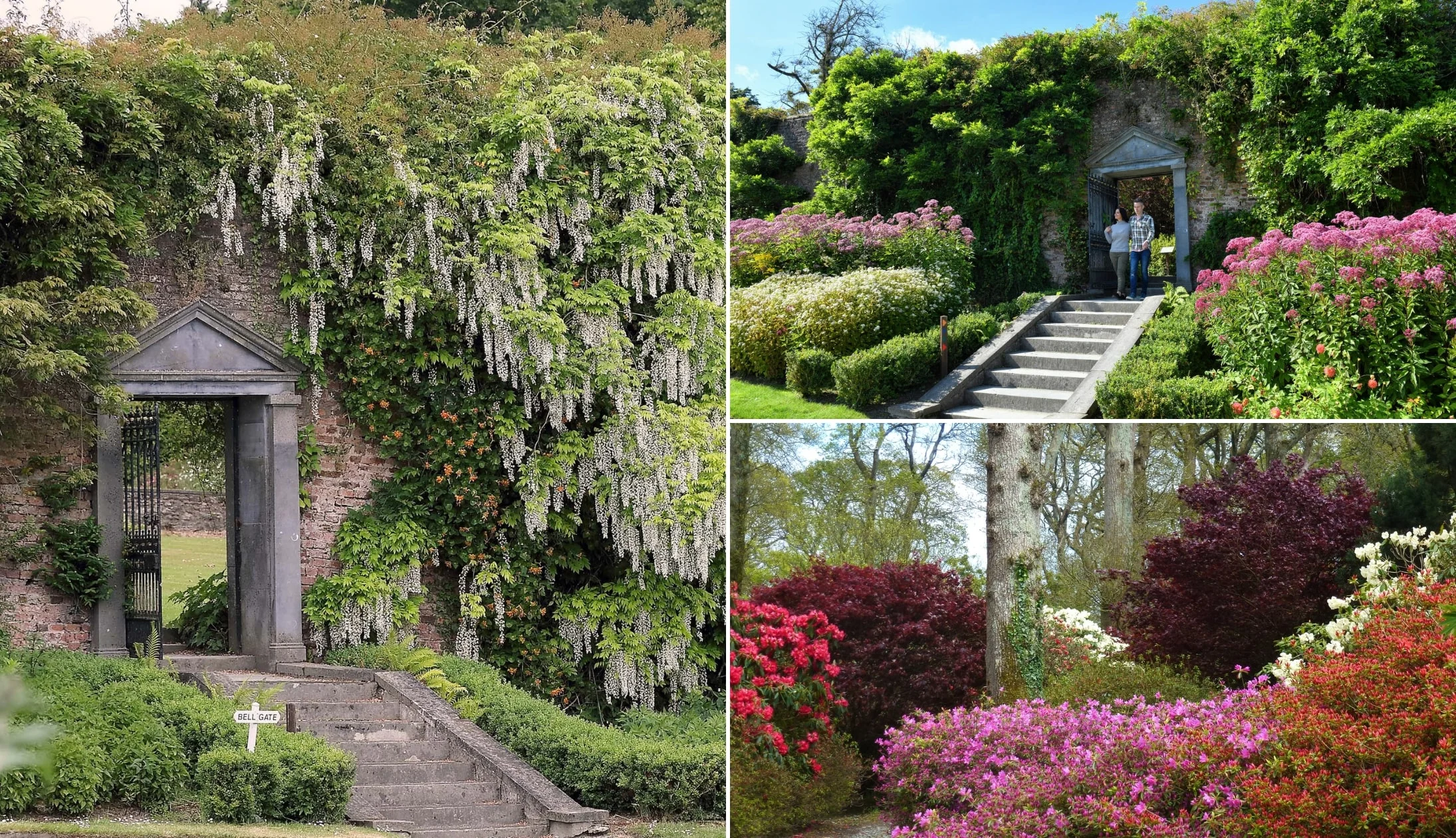
Photos courtesy Mount Congreave Gardens
This next section is a light and breezy 3km along a flat section of the Greenway. Keep your eyes peeled for the four-bay lime kilns that were used in the 19th century for burning lime, which was used for whitewashing houses and farming.
You’ll also be cycling by Mount Congreve Gardens, a beautiful 18th-century garden that you may want to make a quick stop at. The garden is part of a Georgian estate and is filled with camellias, azaleas, and rhododendrons in late spring.
This section of the Greenway is castles galore, the trail enters a lovely shaded woodland, but just before, you’ll cycle past the ruins of a Norman Castle. Not long after, you will see the ruins of Kilmeaden Castle, which date back to the 17th century! If two castles weren’t enough, you’ll be able to spot La Poer Castle, which has stood in ruin since 1850 when it was destroyed by Oliver Cromwell.
Stop 4: Kilmacthomas for lunch
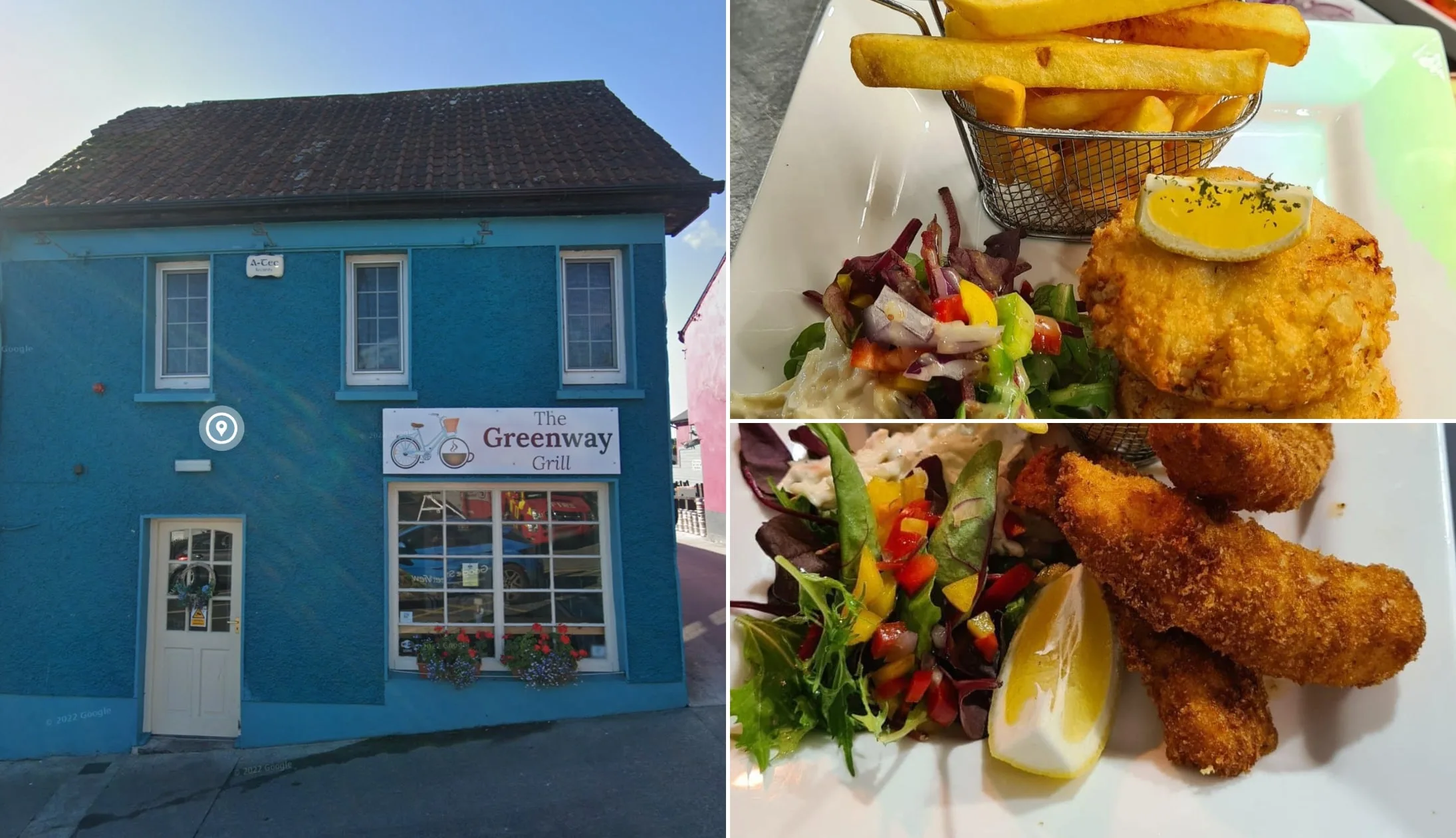
Photo left: Google Maps. Others via The Greenway Grill
This next section is longer than the previous two, stretching on for 13.5km. It’s mostly flat, but you will encounter a few ups and downs.
By this point, the Greenway is starting to become more rural, weaving through some beautiful farmland with the looming Comeragh Mountains in the north.
Look out for a tall chimney tower in the distance, which belongs to Fairbrook Mill, an 18th-century mill that processed paper and wool. If you feel like taking a break, why not visit the Fairbrook House gardens? This section is also home to the historic Kilmacthomas Workhouse.
There are plenty of places to eat in Kilmacthomas, but we normally like to stop over at The Greenway Grill, which is a popular lunch spot for cyclists on the Greenway. They’ve got everything from hearty burgers to delicious salads.
Stop 5: The Viaduct

Photos via Shutterstock
After lunch, cycle a little farther for a closer look at Kimacthomas Viaduct. The impressive stone viaduct dates back to 1878, with eight huge arches spanning across the river.
It’s just a short cycle from Greenway Grill.
Stop 6: Back to Waterford City
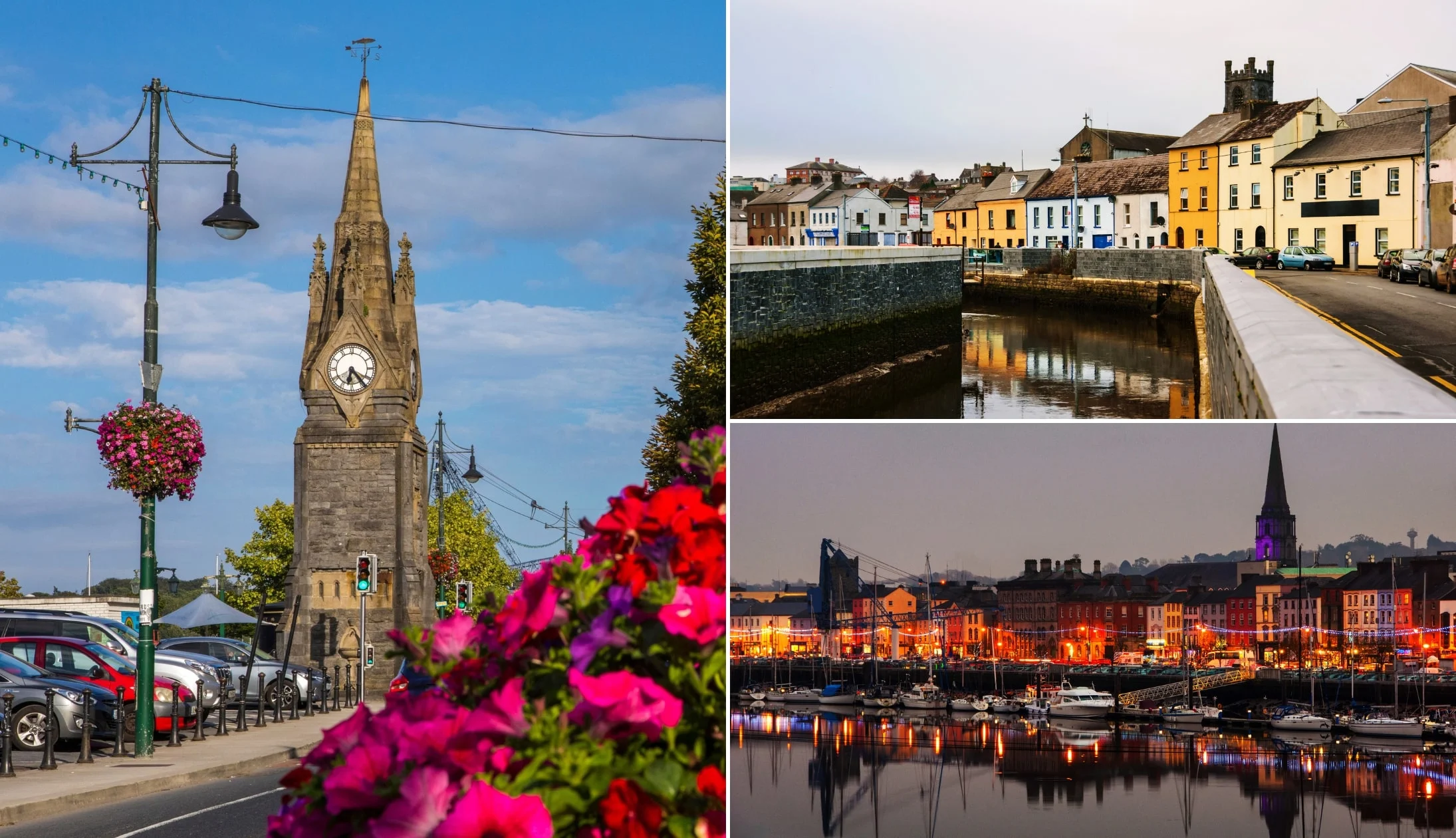
Photos via Shutterstock
It’s time to turn around and cycle back to Waterford City where you’ll be enjoying one last dinner before going back to Rosslare tomorrow.
Stop 7: Dinner, drinks, and live music

Photo left: Google Maps. Others via An Uisce Beatha on Fb
Our dinner recommendations
There’s a heap of great restaurants in Waterford. Head to Momo if you’re in the mood for an eclectic mix of international dishes, with things like Thai yellow curry and Masala cauliflower steak on the menu.
Bodega is a great choice if you’re after a casual dining experience, with some delicious Mediterranean-inspired dishes on offer.
Finally, if you’re after modern European cuisine, then we recommend enjoying dinner at Sheehan’s. You’ll find classics like burgers and steaks, as well as daily specials like chicken and chorizo pie.
Live music and trad bars
There’s some mighty pubs in Waterford. A couple of our favourites are J. & K. Walsh Victorian Spirit Grocer (a fully-preserved Victorian bar) and An Uisce Beatha (an old-school pub with a great selection of craft beers).
For live music, head to Katty Beary, Tullys Bar, and An Uisce Beatha (which we mentioned above).
Day 9: The trip to back to Rosslare
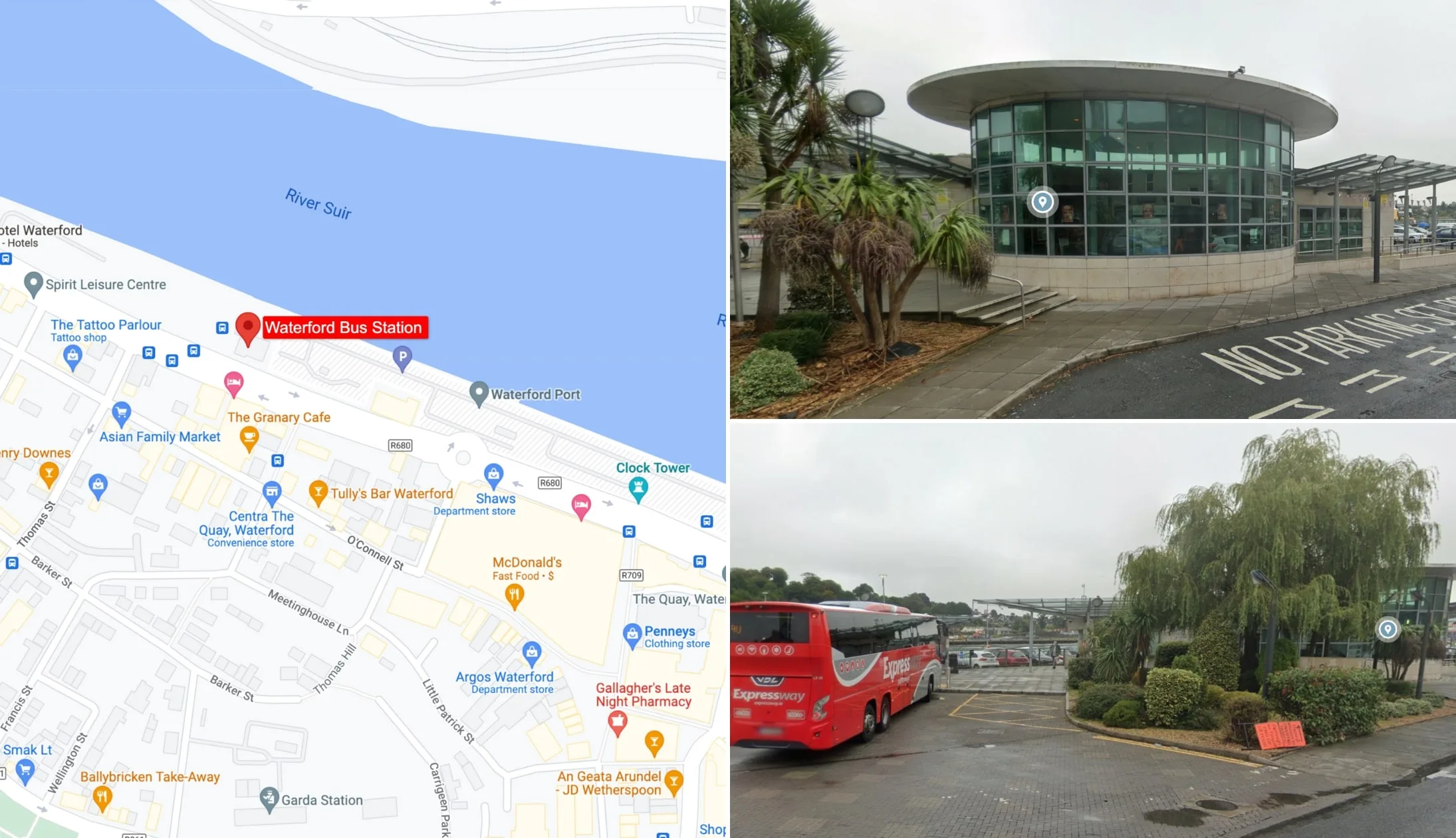
Photos via Google Maps
Today we head to Rosslare so that you can catch the ferry and head home!
Get some breakfast before you check out of your accommodation, or find somewhere nearby to eat.
Stop 1: Waterford Bus Station
Expressway operates a bus between Waterford and Rosslare Harbour. The bus takes about an hour and 20 minutes.
Stop 2: Rosslare Europort
Make sure you don’t miss your ferry!
And that’s a wrap on this road trip
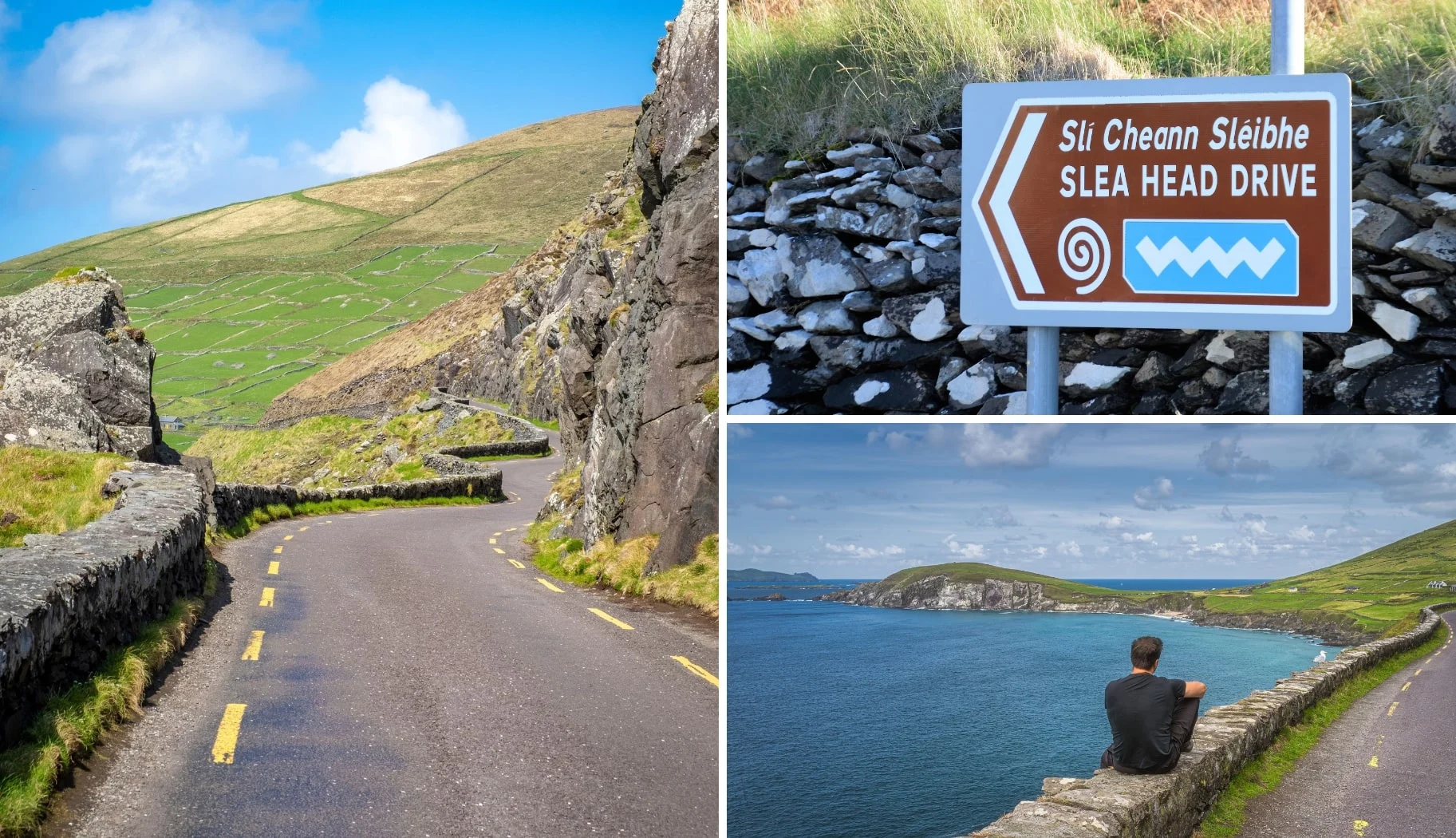
Photos via Shutterstock
We hope you found the above road trip guide useful. If you have any questions, ask in the comments below and we’ll do our best to help.
Or, if you’d like to browse our other Irish Road Trip itineraries, visit our Road Trip Hub – cheers!
Keith O’Hara has lived in Ireland for 35 years and has spent most of the last 10 creating what is now The Irish Road Trip guide. Over the years, the website has published thousands of meticulously researched Ireland travel guides, welcoming 30 million+ visitors along the way. In 2022, the Irish Road Trip team published the world’s largest collection of Irish Road Trip itineraries. Keith lives in Dublin with his dog Toby and finds writing in the 3rd person minus craic altogether.

